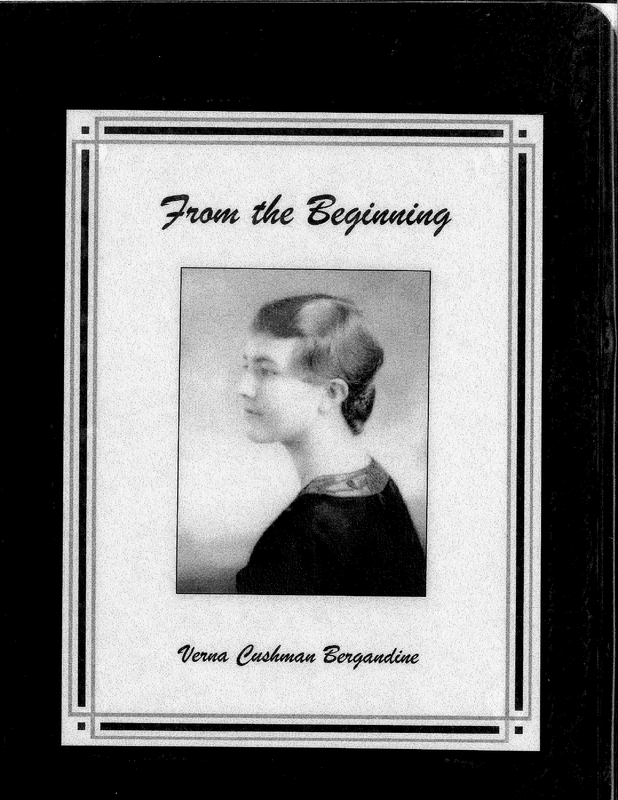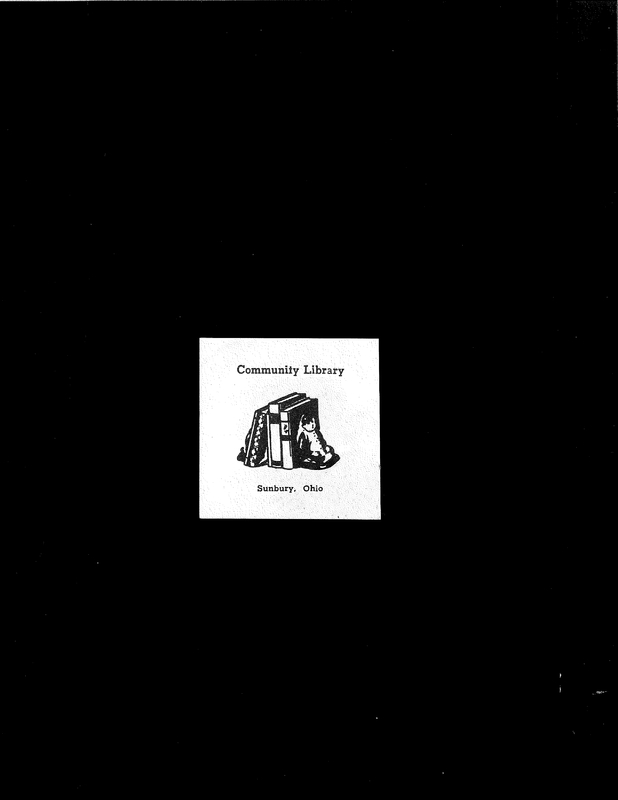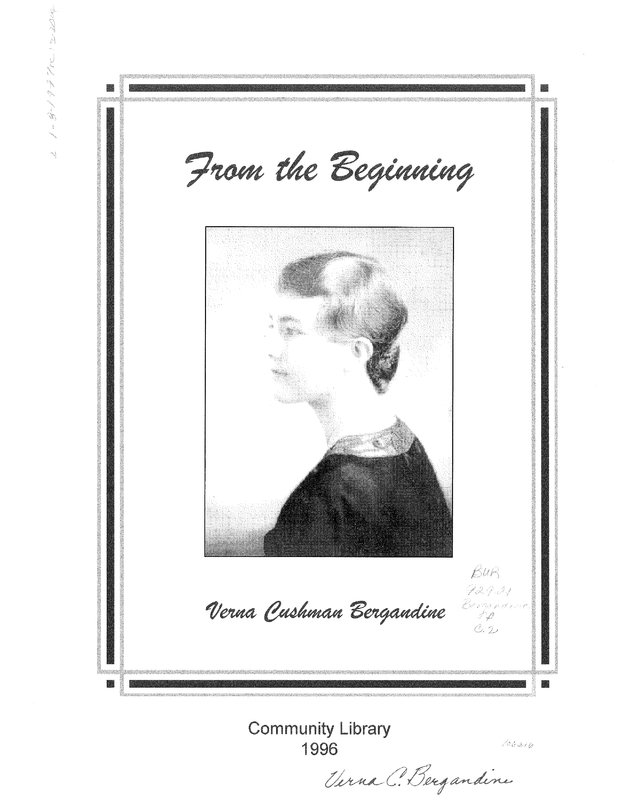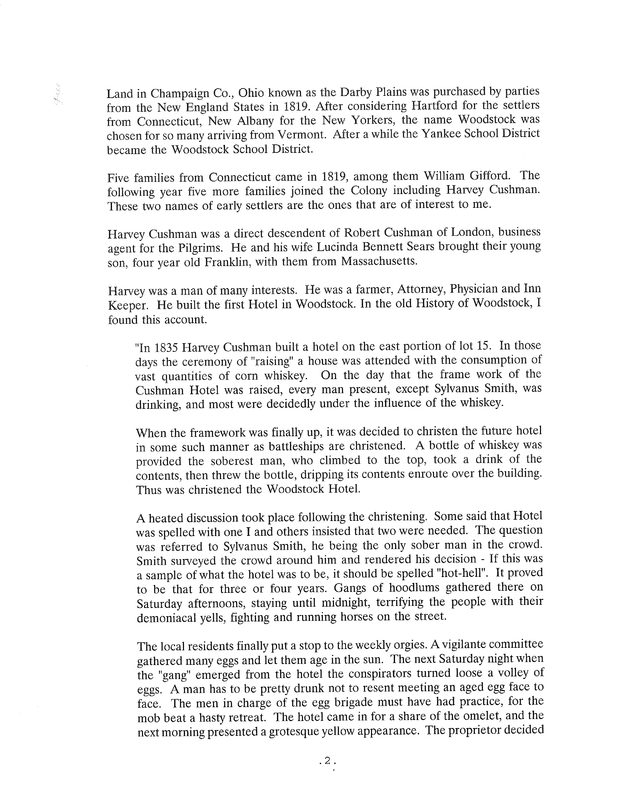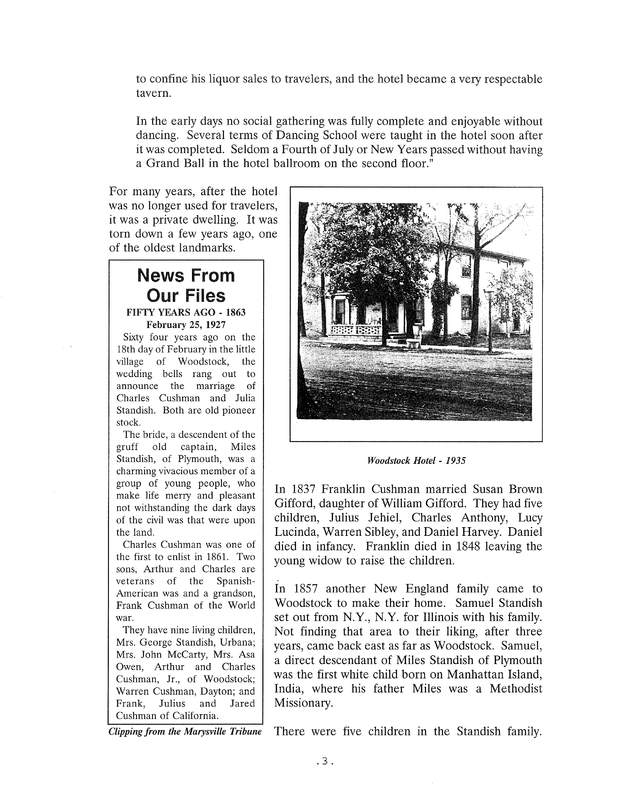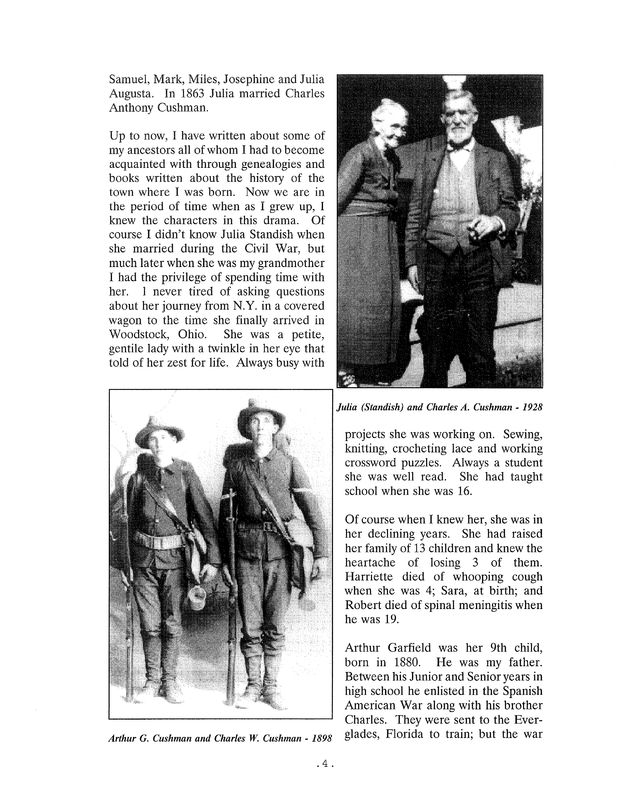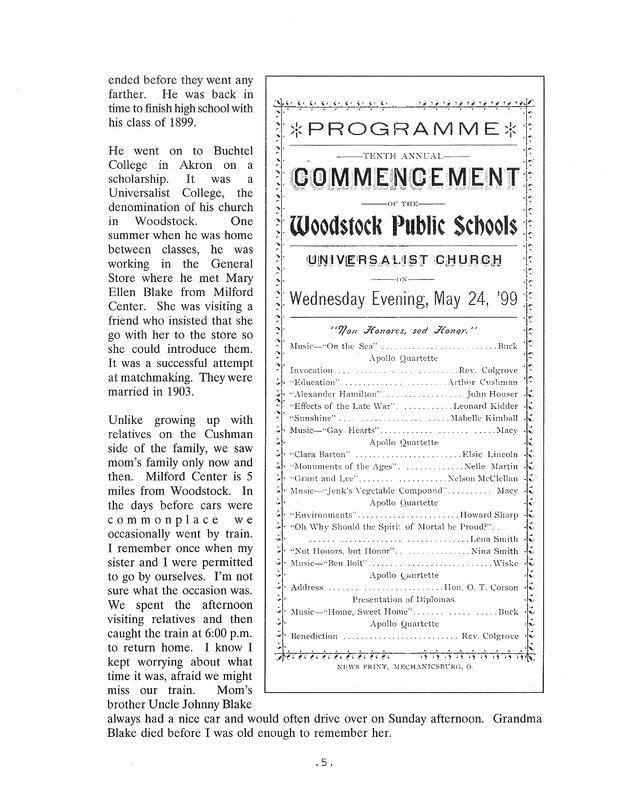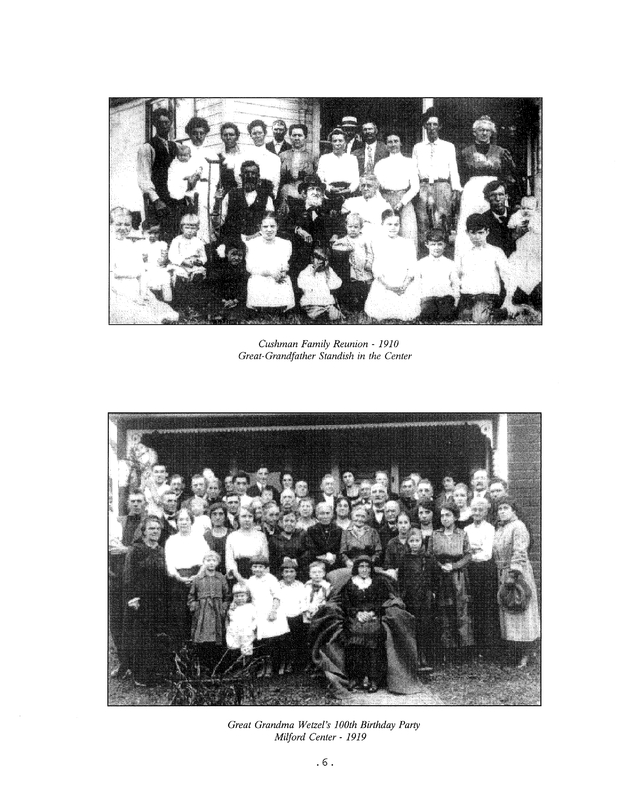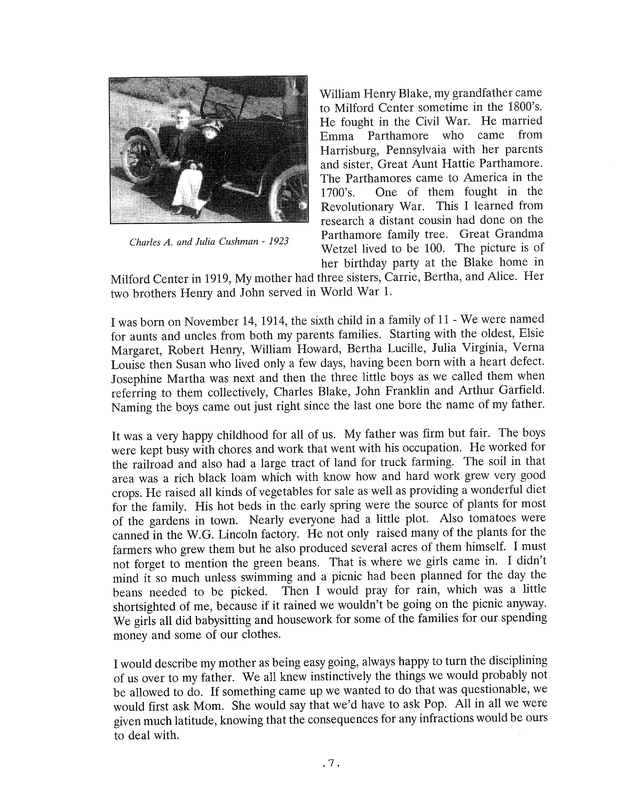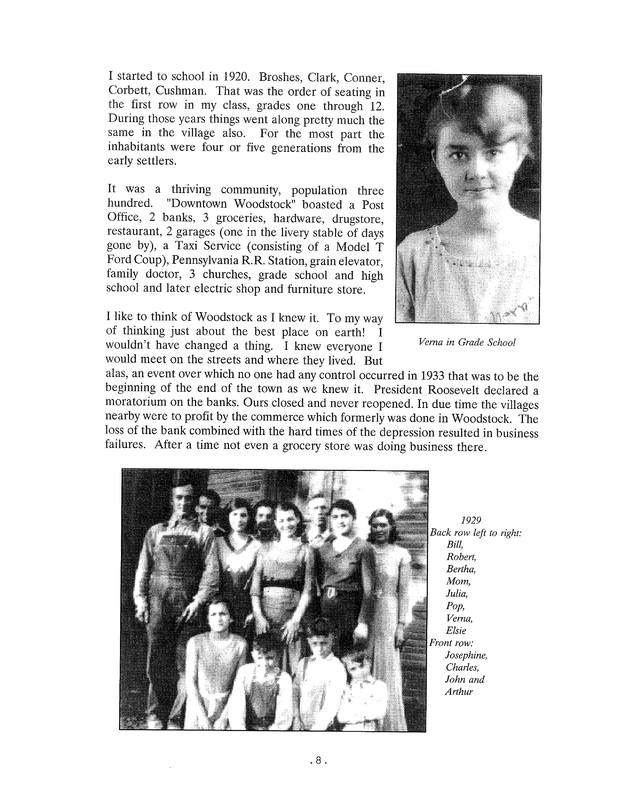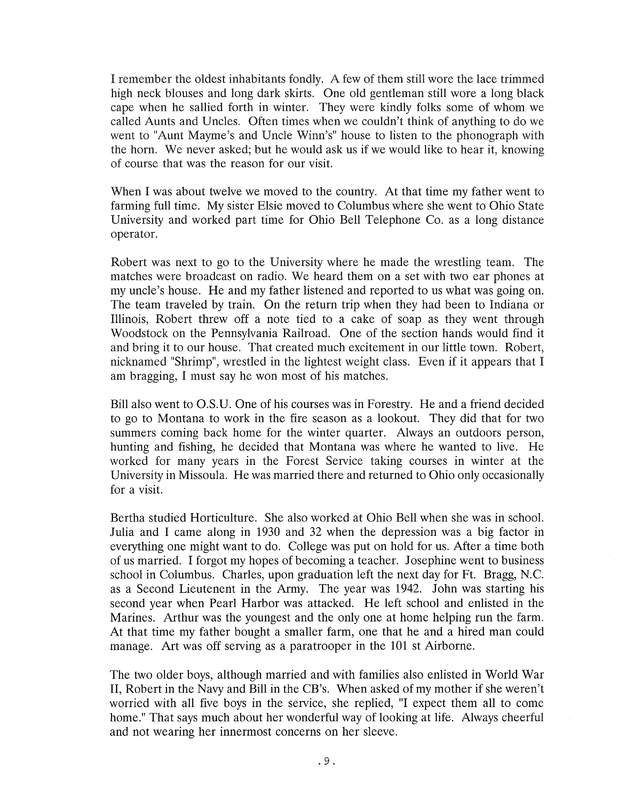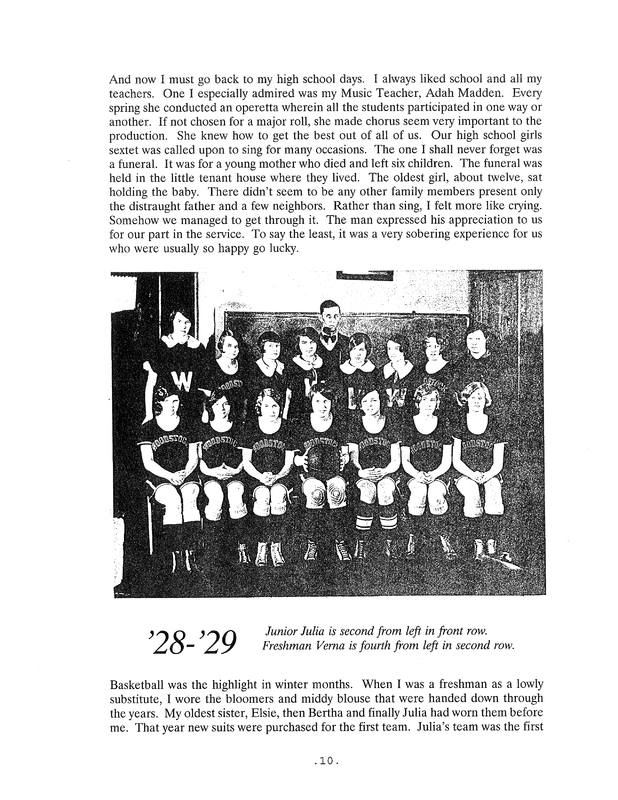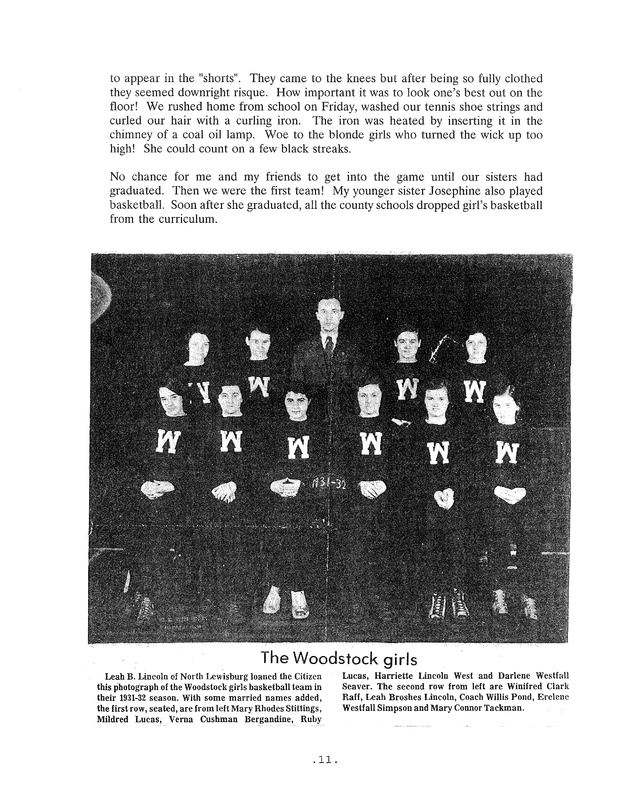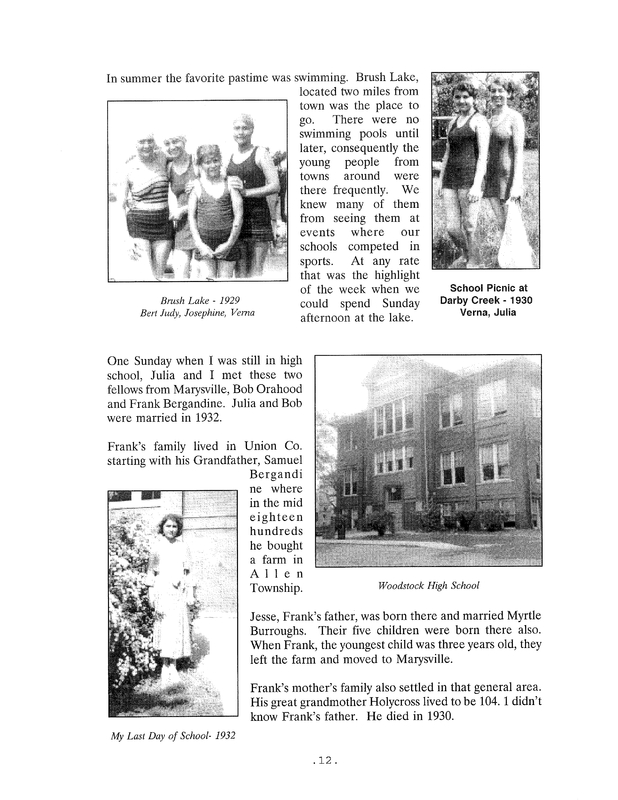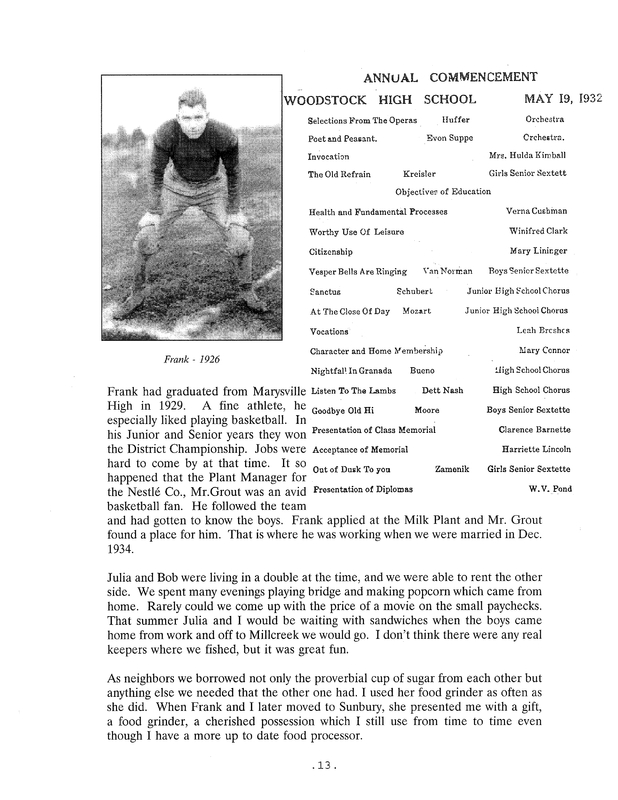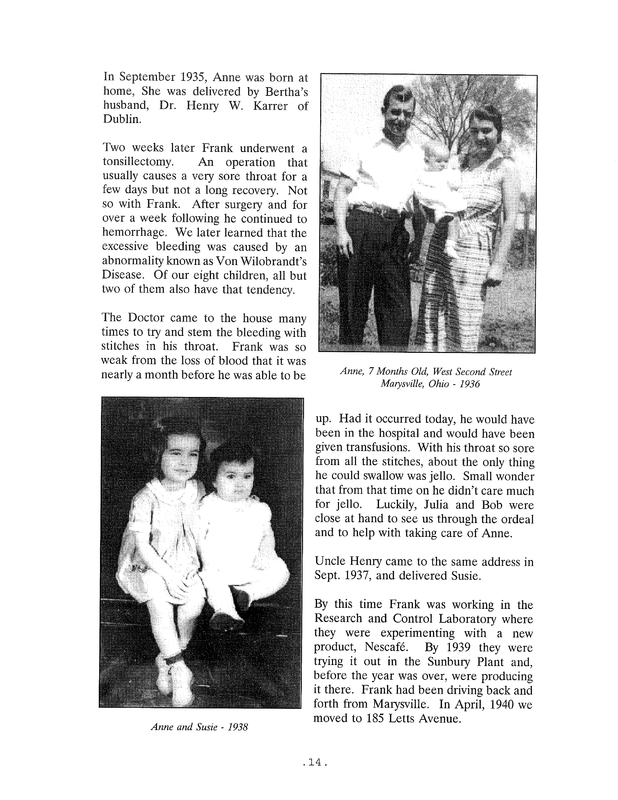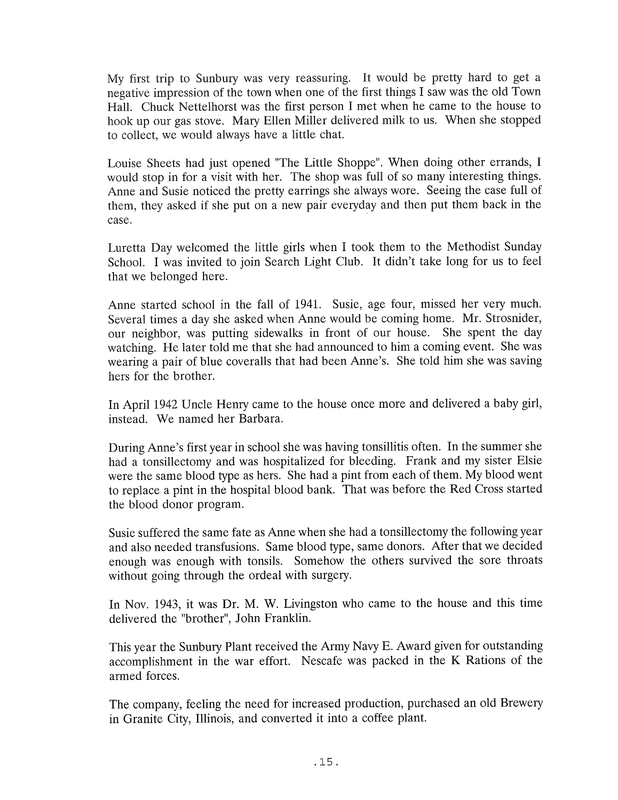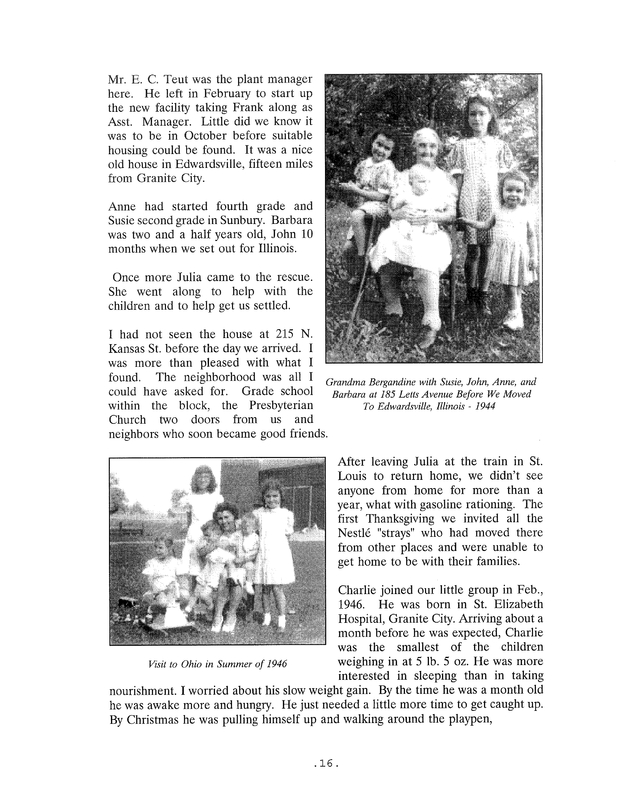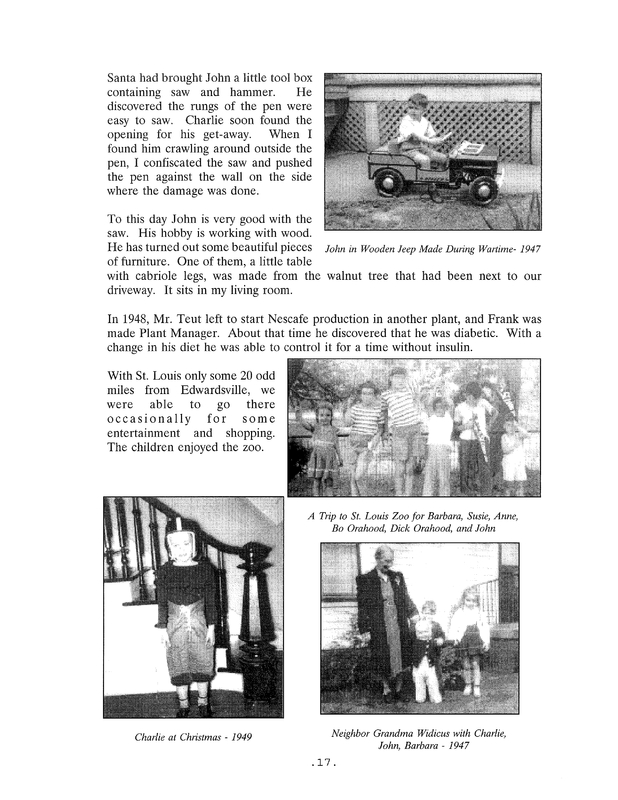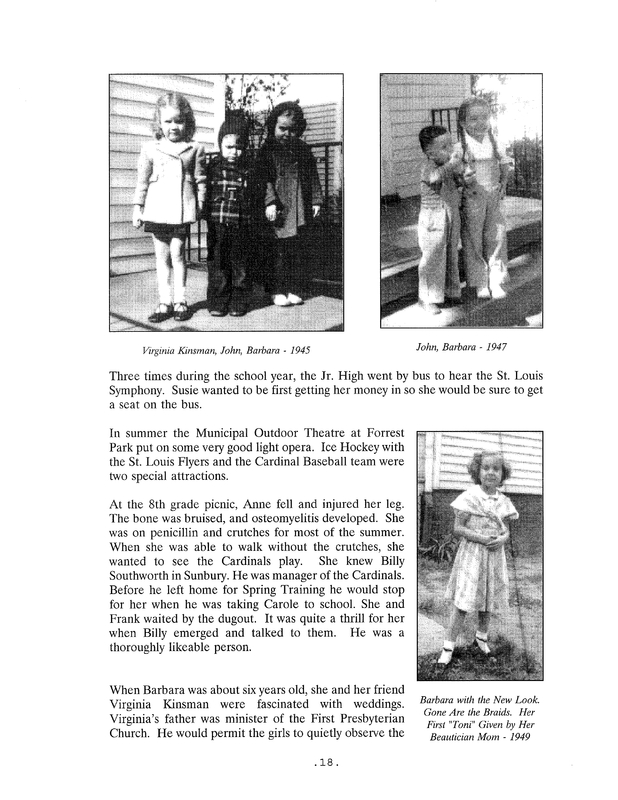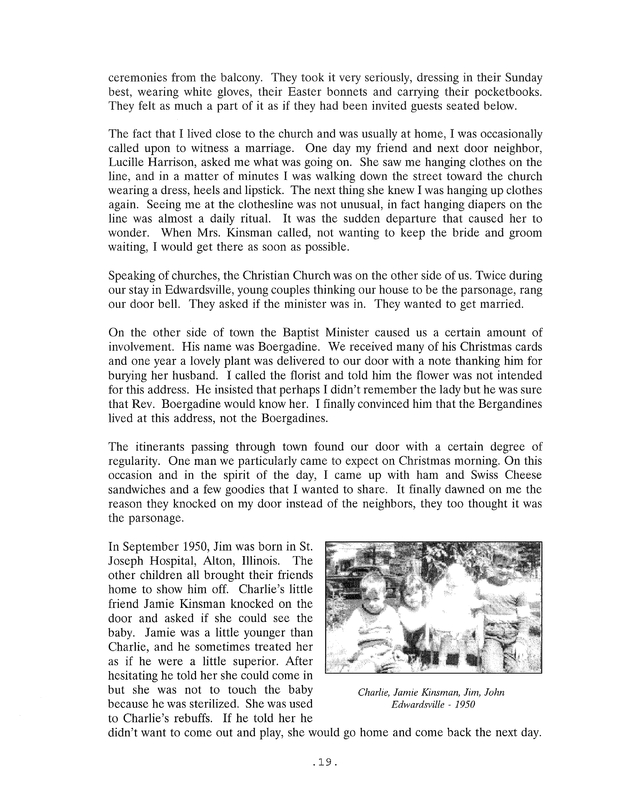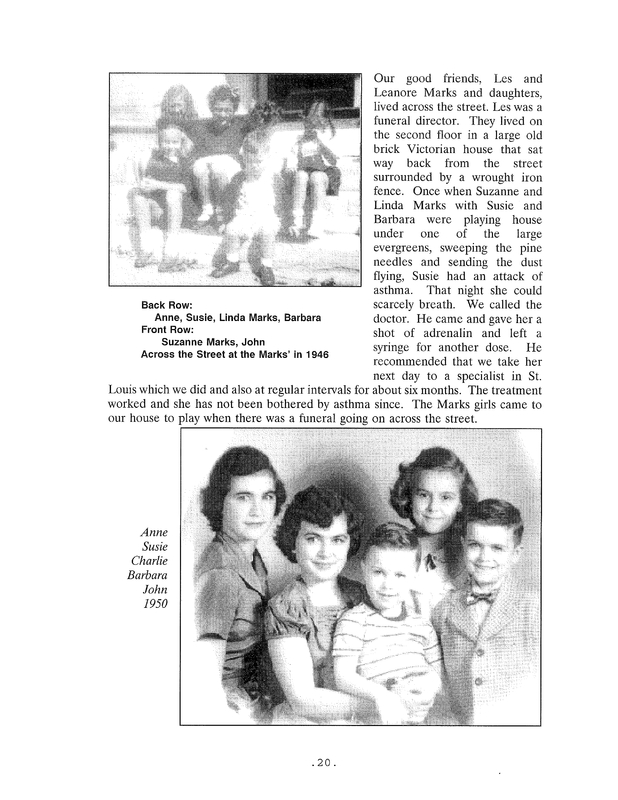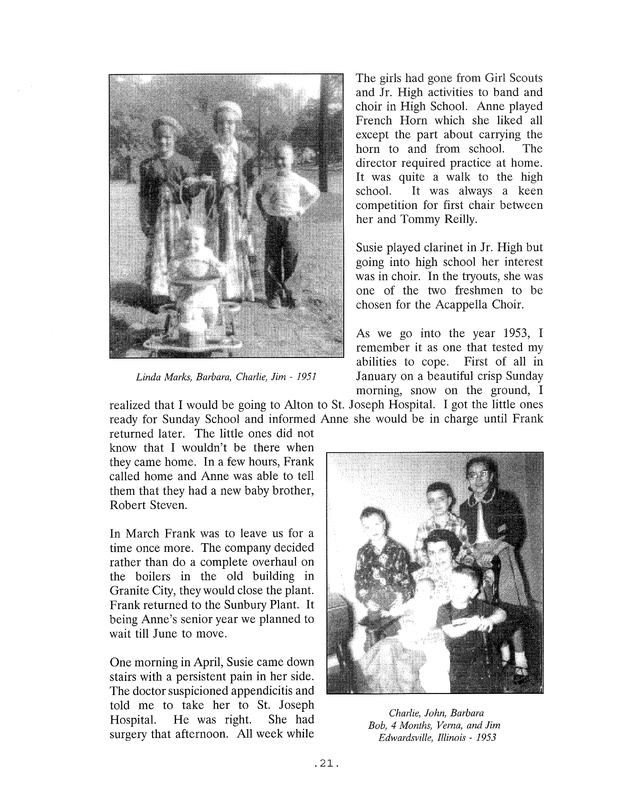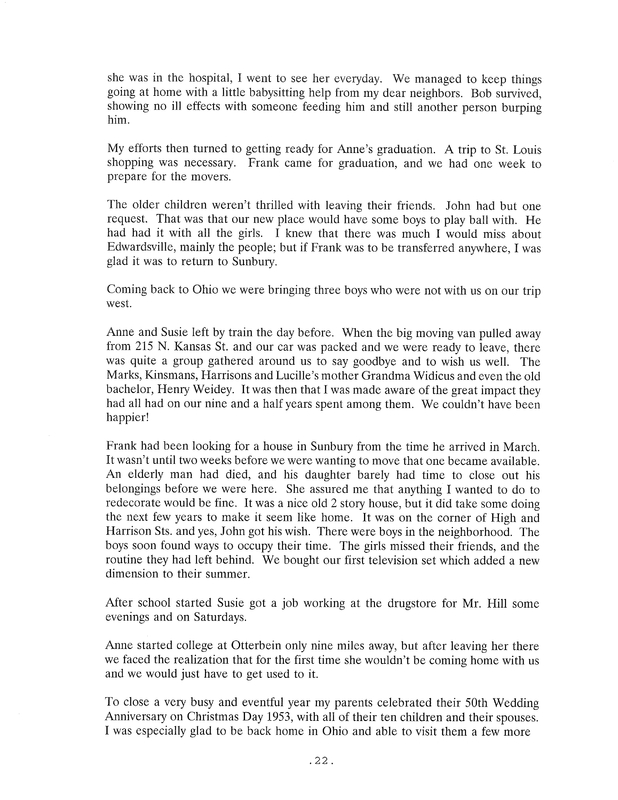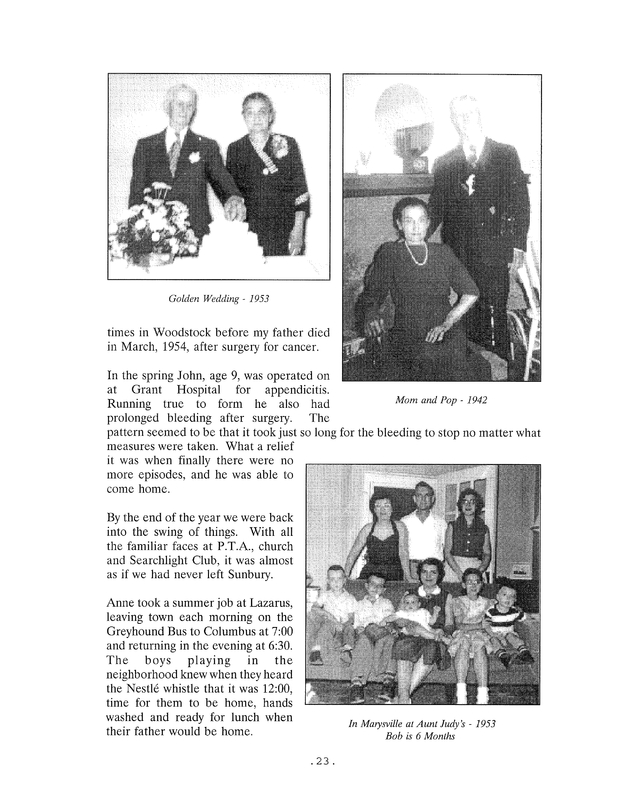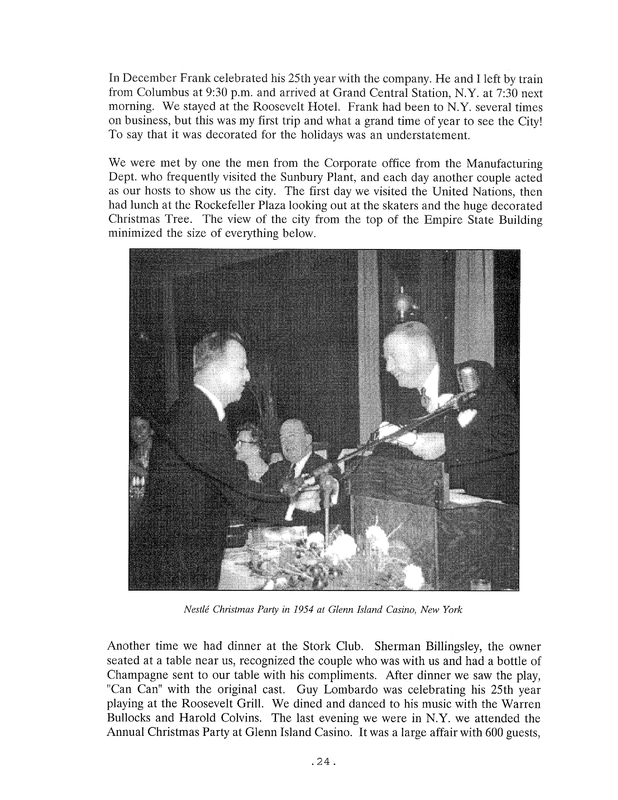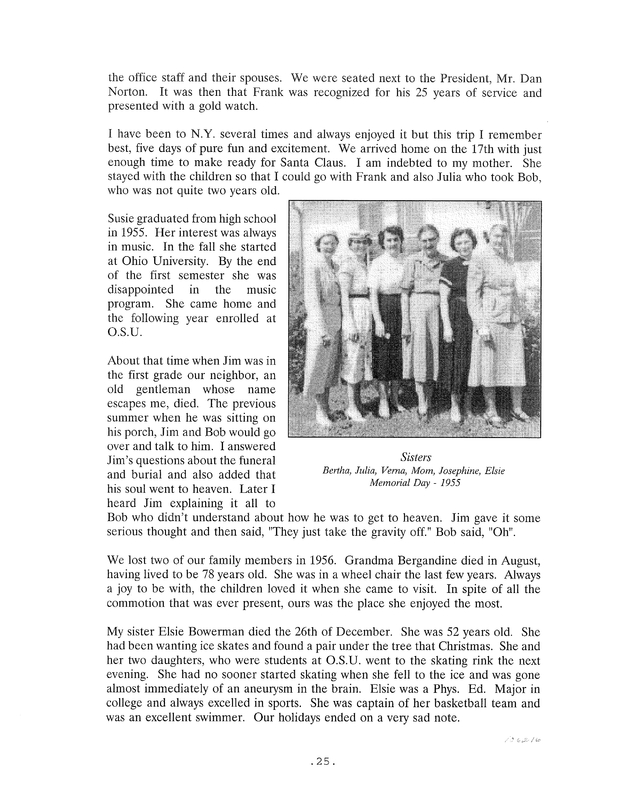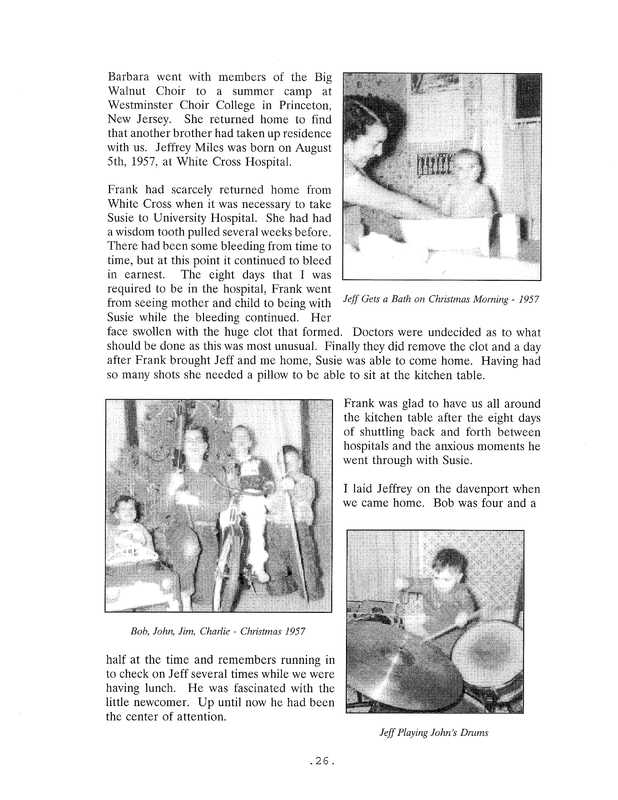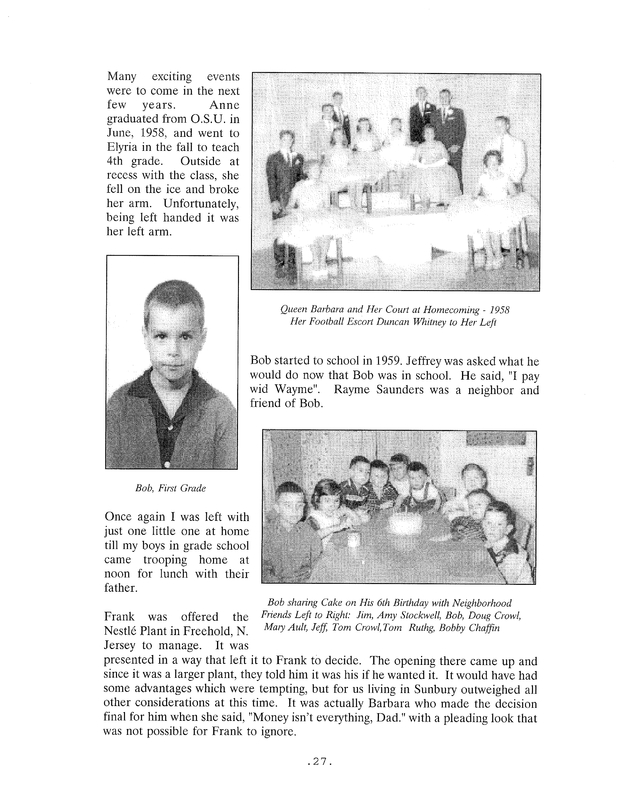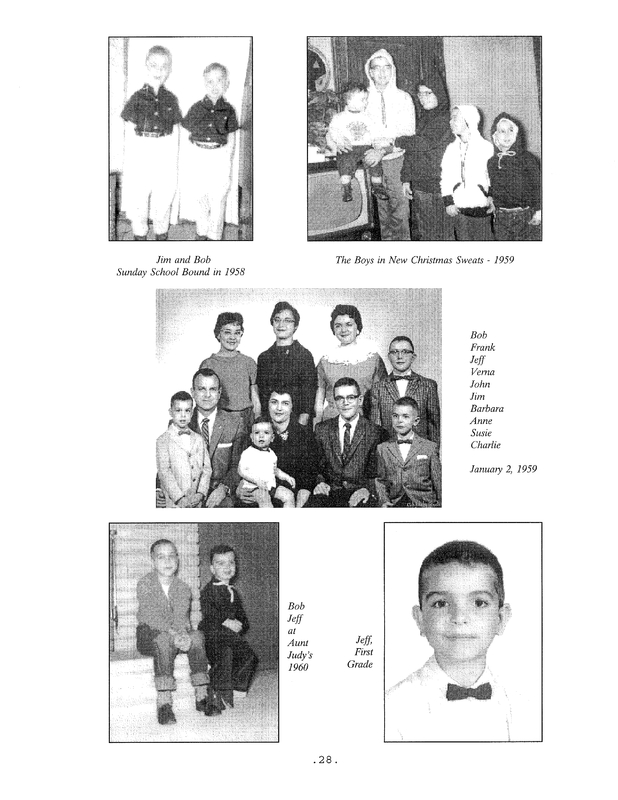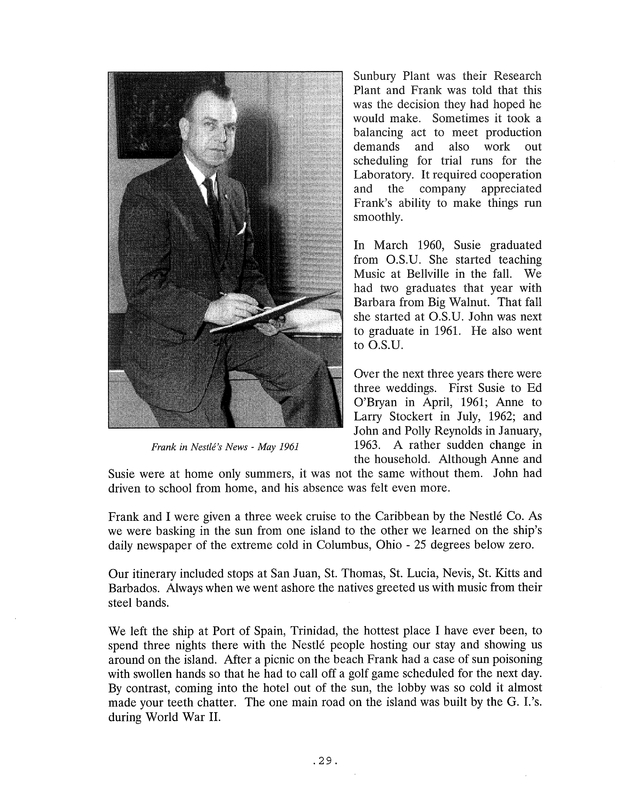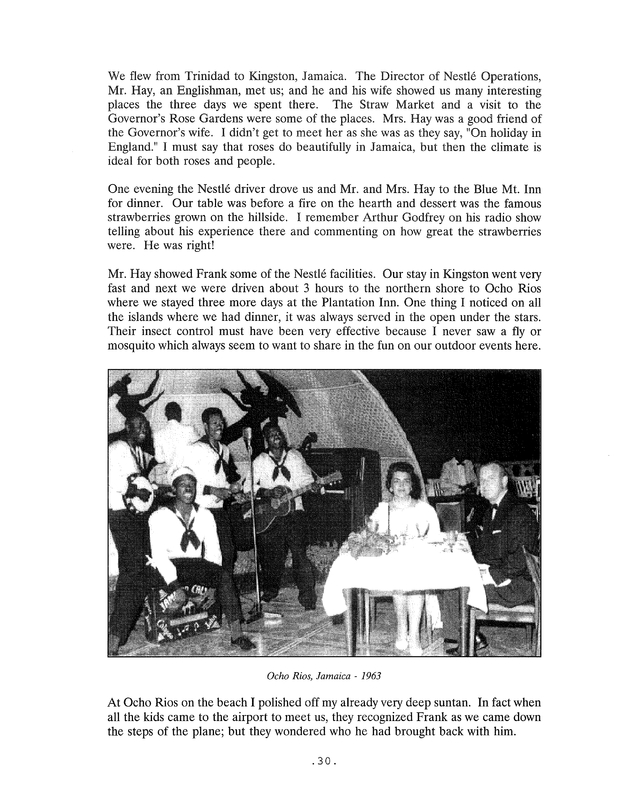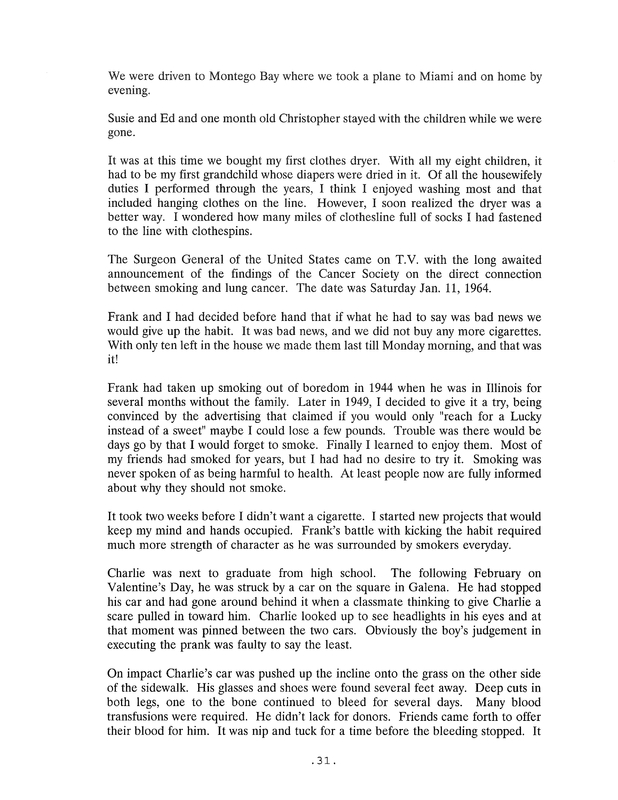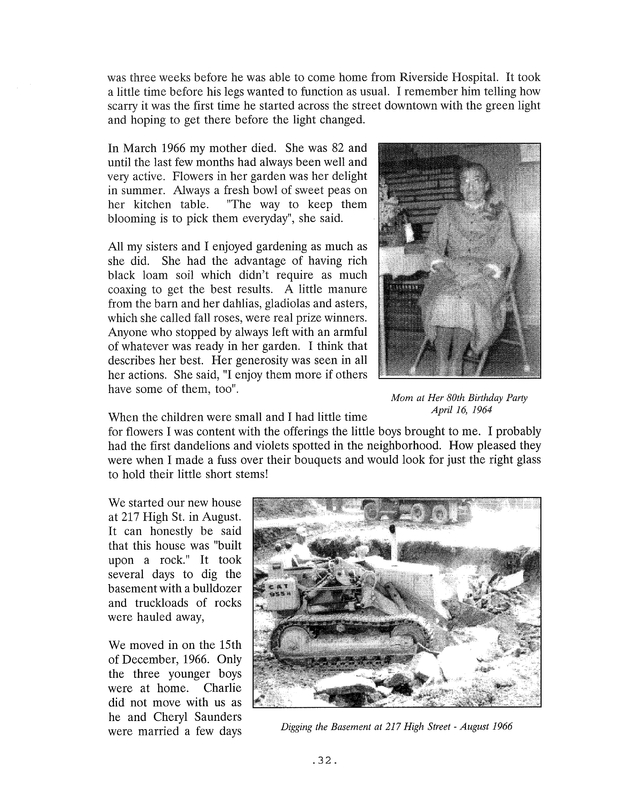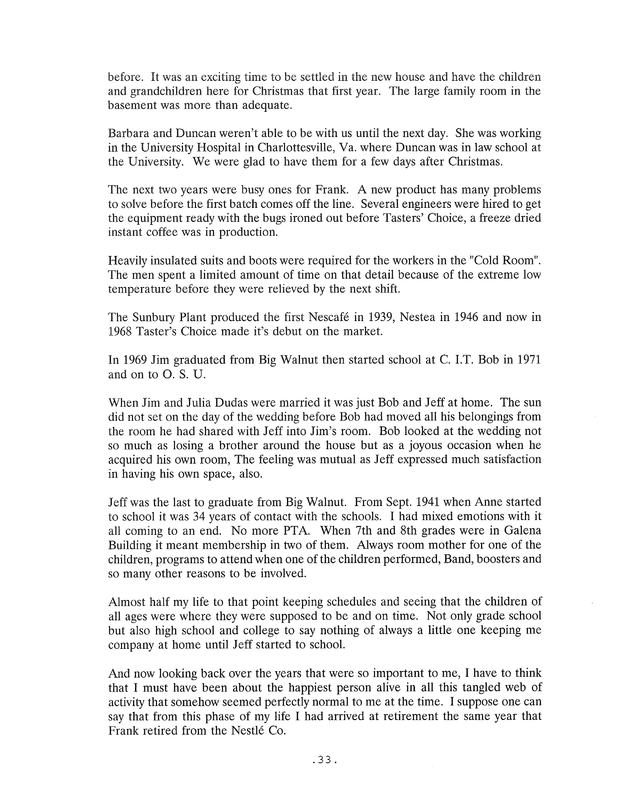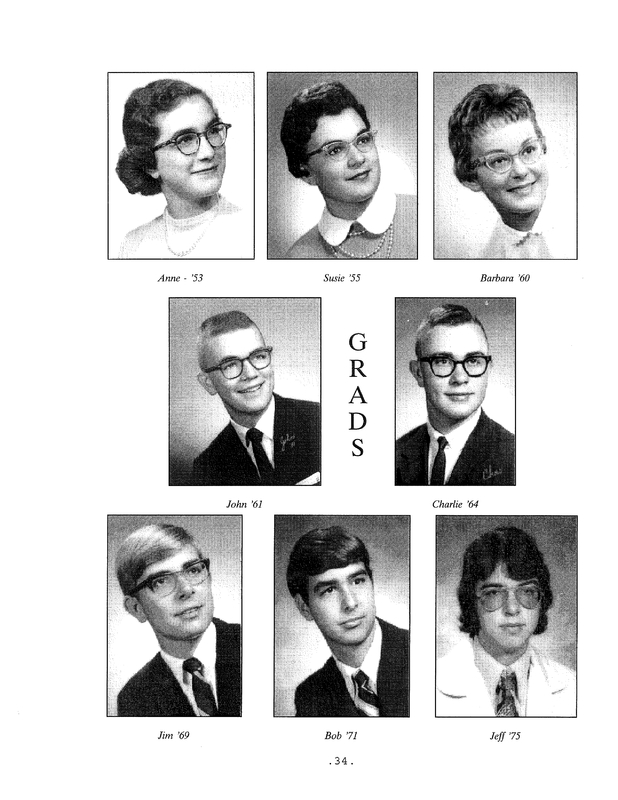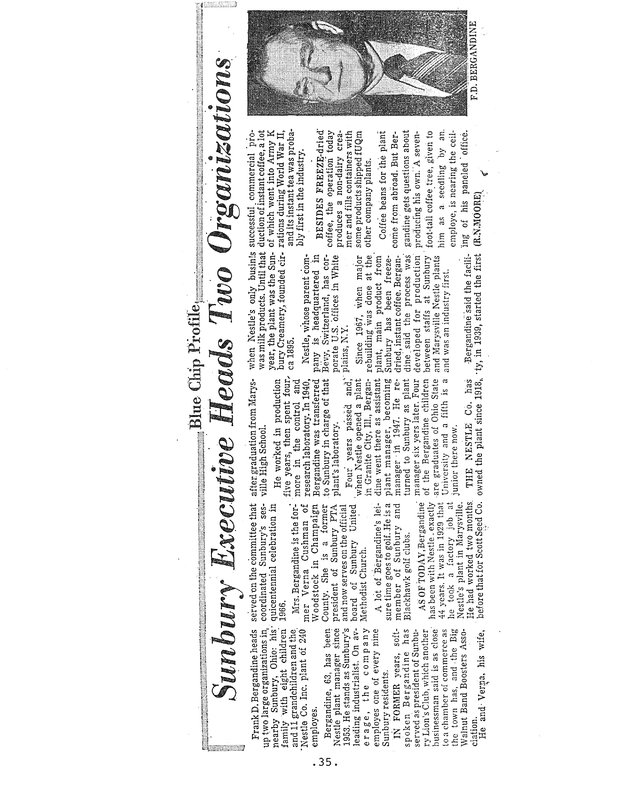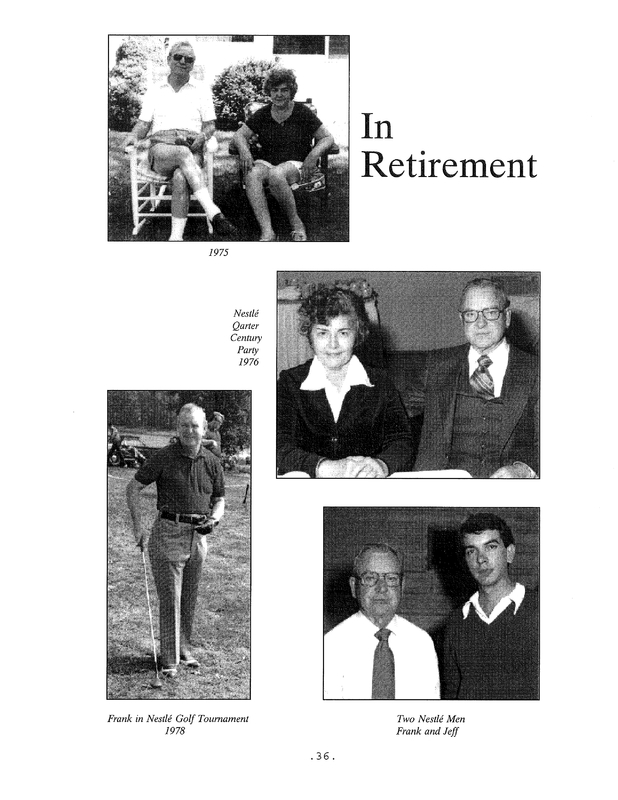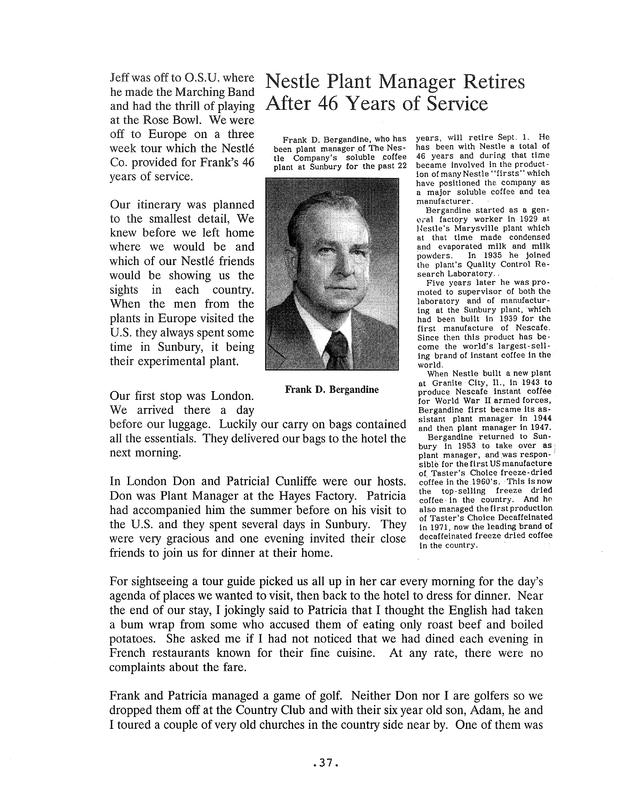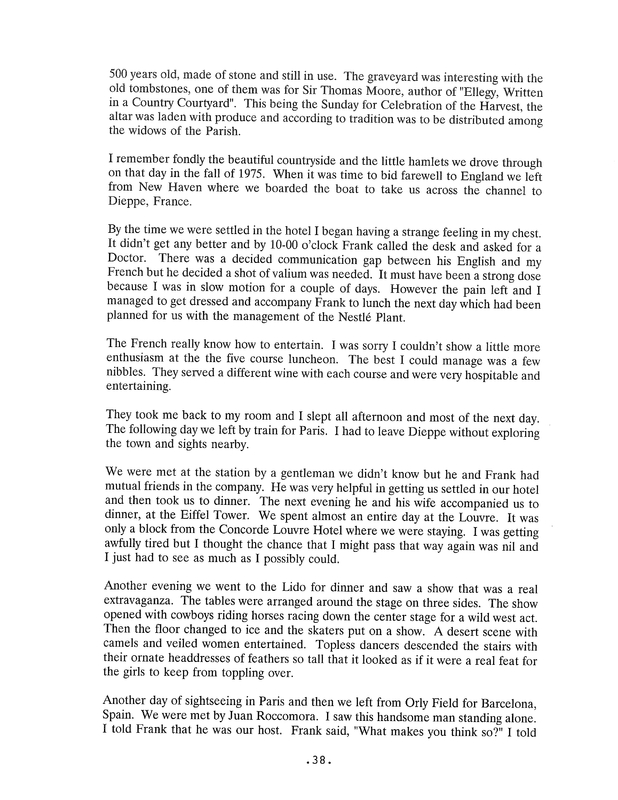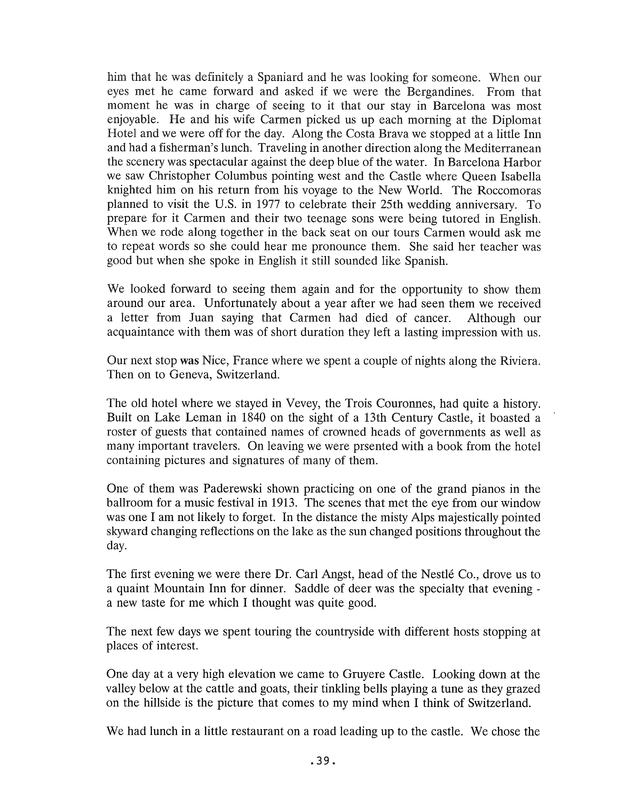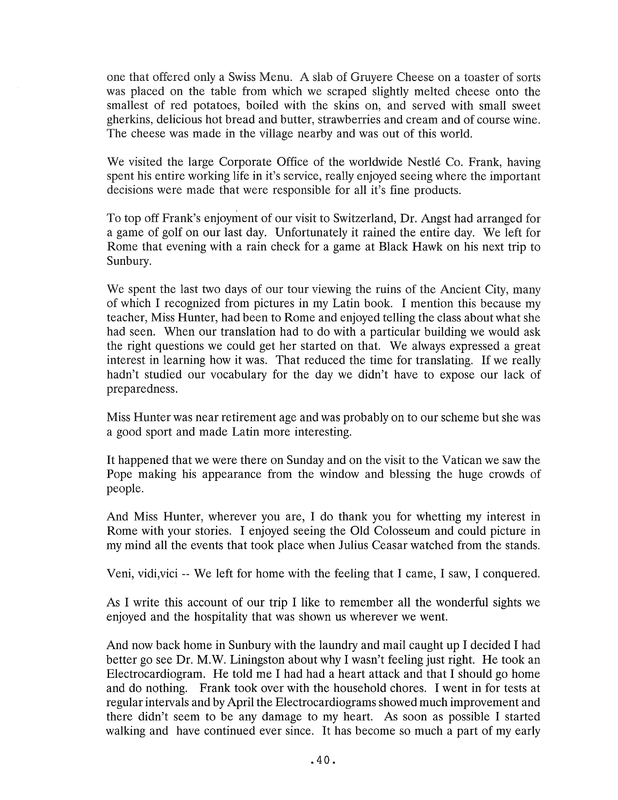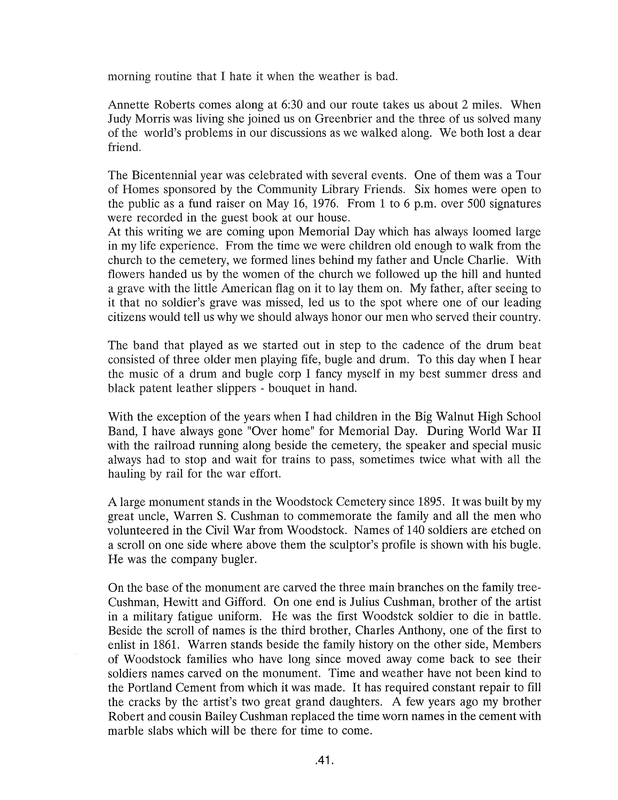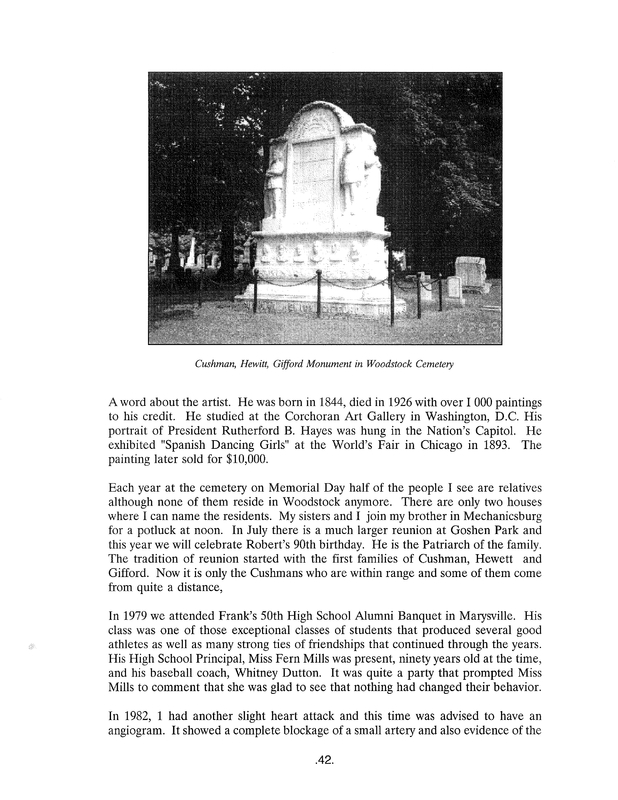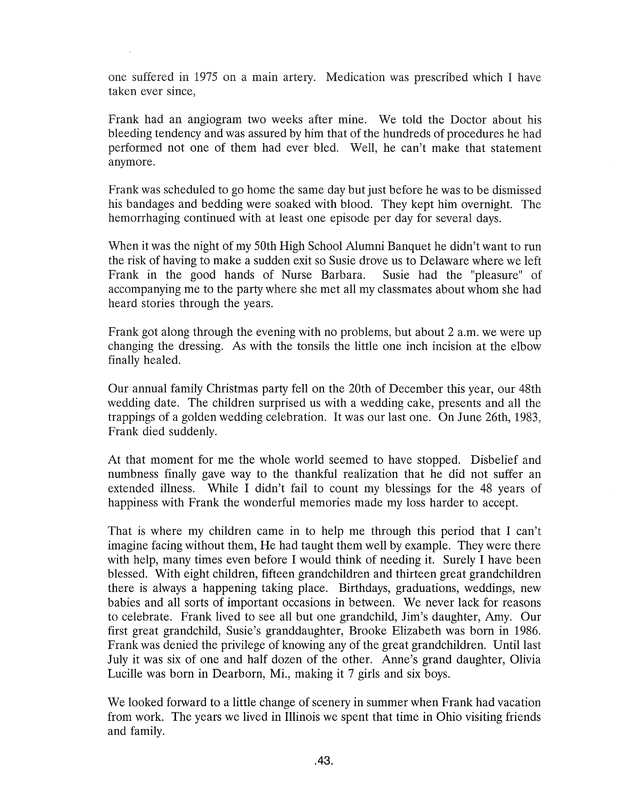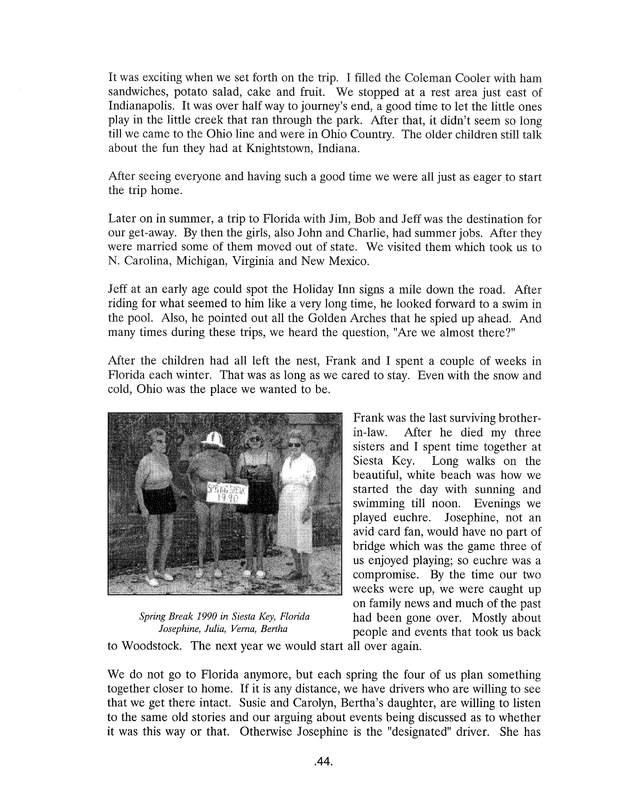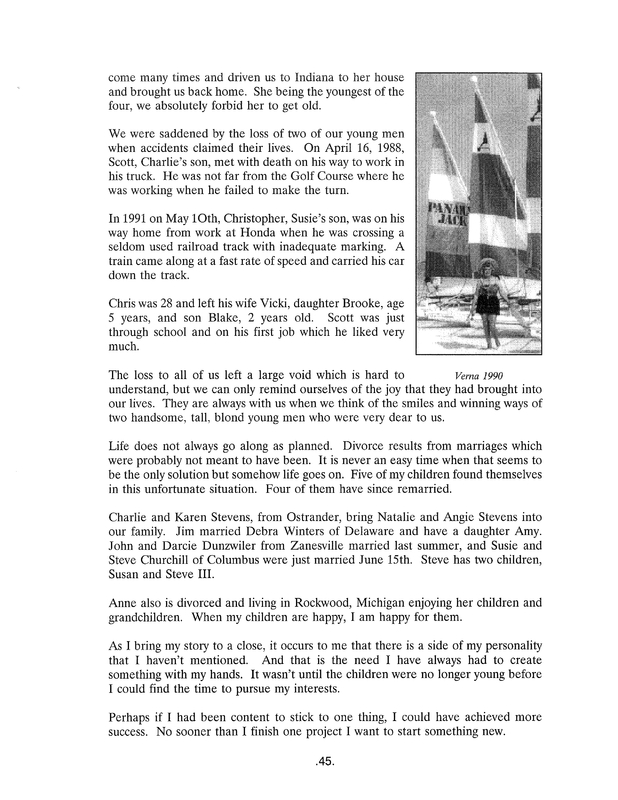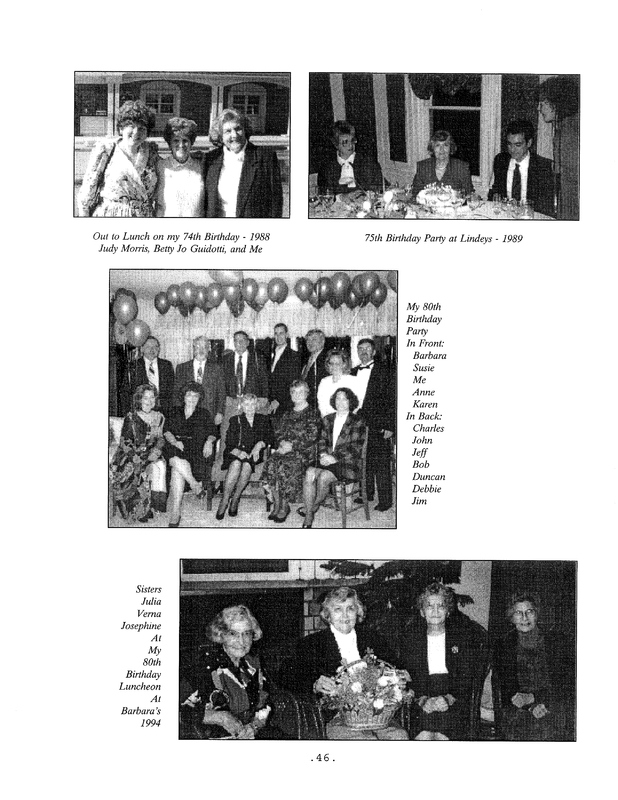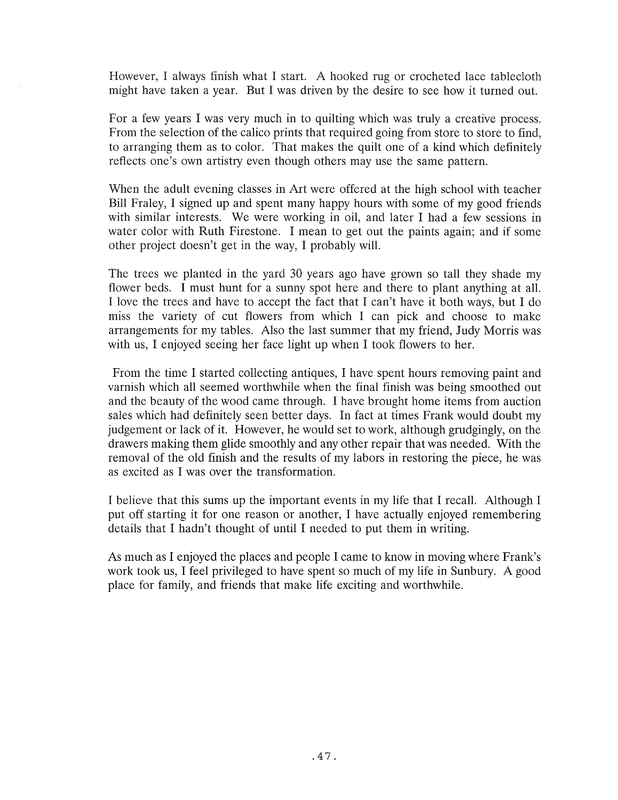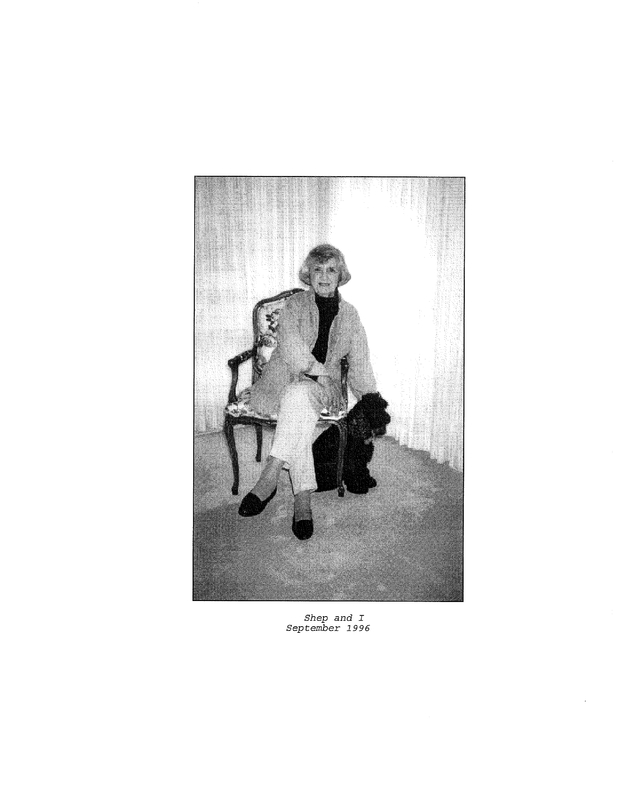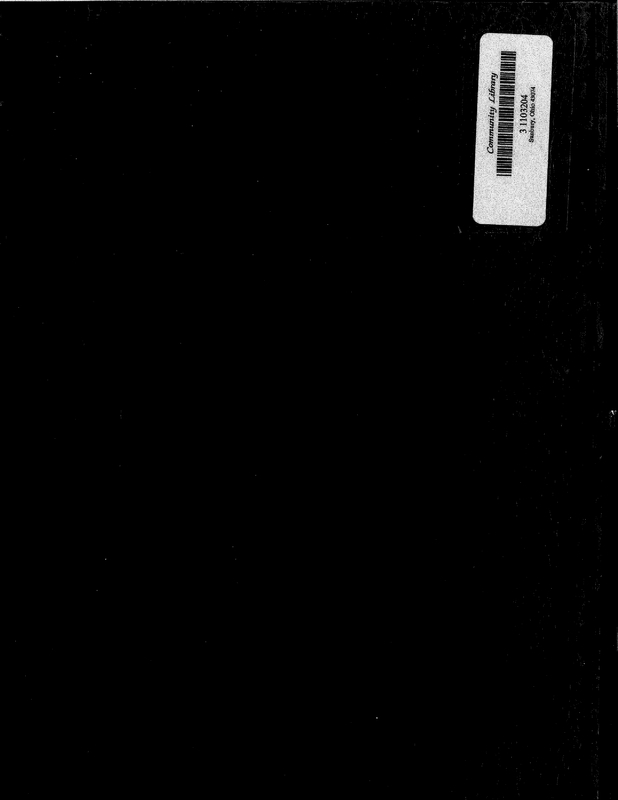From the Beginning
Title
From the Beginning (1)
Description
[corresponds to cover and unnumbered page 1 of From the Beginning]
From the Beginning
Verna Cushman Bergandine
[cover photo: Verna Cushman Bergandine]
From the Beginning
Verna Cushman Bergandine
[cover photo: Verna Cushman Bergandine]
Title
From the Beginning (2)
Description
[corresponds to inside cover and unnumbered page 2 of From the Beginning]
[illustration:Community Library Bookplate]
[illustration:Community Library Bookplate]
Title
From the Beginning (3)
Description
{corresponds to title page and unnumbered page 3 of From the Beginning]
From the Beginning
Verna Cushman Bergandine
[photo: Verna Cushman Bergandine]
Community Library
1996
Verna C. Bergandine [signature]
From the Beginning
Verna Cushman Bergandine
[photo: Verna Cushman Bergandine]
Community Library
1996
Verna C. Bergandine [signature]
Title
From the Beginning (4)
Description
[corresponds to numbered page 2 of From the Beginning]
Land in Champaign Co., Ohio known as the Darby Plains was purchased by parties
from the New England States in 1819. After considering Hartford for the settlers
from Connecticut, New Albany for the New Yorkers, the name Woodstock was
chosen for so many arriving from Vermont. After a while the Yankee School District
became the Woodstock School District.
Five families from Connecticut came in 1819, among them William Gifford. The
following year five more families joined the Colony including Harvey Cushman.
These two names of early settlers are the ones that are of interest to me.
Harvey Cushman was a direct descendent of Robert Cushman of London , business
agent for the Pilgrims. He and wife Lucinda Bennett Sears brought their young
son, four year old Franklin, with them from Massachusetts.
Harvey was a man of many interests. He was a farmer, Attorney, Physician and Inn
Keeper. He built the first Hotel in Woodstock. In the old History of Woodstock, I
found this account.
"In 1835 Harvey Cushman built a hotel on the east portion of lot 15. In those
days the ceremony of of "raising" a house was attended with the consumption of
vast quantities of corn whiskey. On the day that frame work of the
Cushman Hotel was raised, every man present, except Sylvanus Smith, was
drinking, and most were decidedly under the influence of the whiskey.
When the framework was finally up, it was decided to christen the future hotel
in some such manner as battleships are christened. A bottle of whiskey was
provided the soberest man, who climbed to the top, took a drink of the
contents, then threw the bottle, dripping its contents enroute over the building.
Thus was christened the Woodstock Hotel.
A heated discussion took place following the christening. Some said that hotel
was spelled with one I and others insisted that two were needed. The question
was referred to Sylvanus Smith, he being the only sober man in the crowd.
Smith surveyed the crowd around him and rendered his decision - If this was
a sample of what the hotel was to be, it should be spelled "hot-hell". It proved
to be that for three or four years. Gangs of hoodlums gathered there on
Saturday afternoons, staying until midnight, terrifying the people with their
demoniacal yells, fighting and running horses on the street.
The local residents finally put a stop to the weekly orgies. A vigilante committtee
gathered many eggs and let them age in the sun. The next Saturday night when
the "gang" emerged from the hotel the conspirators turned loose a volley of
eggs. A man has to be pretty drunk not to resent meeting an aged egg face to
face. The men in charge of the egg brigade must have had practice, for the
mob beat a hasty retreat. The hotel came in for a share of the omelet, and the
next morning presented a grotesque yellow appearance. The proprietor decided
Land in Champaign Co., Ohio known as the Darby Plains was purchased by parties
from the New England States in 1819. After considering Hartford for the settlers
from Connecticut, New Albany for the New Yorkers, the name Woodstock was
chosen for so many arriving from Vermont. After a while the Yankee School District
became the Woodstock School District.
Five families from Connecticut came in 1819, among them William Gifford. The
following year five more families joined the Colony including Harvey Cushman.
These two names of early settlers are the ones that are of interest to me.
Harvey Cushman was a direct descendent of Robert Cushman of London , business
agent for the Pilgrims. He and wife Lucinda Bennett Sears brought their young
son, four year old Franklin, with them from Massachusetts.
Harvey was a man of many interests. He was a farmer, Attorney, Physician and Inn
Keeper. He built the first Hotel in Woodstock. In the old History of Woodstock, I
found this account.
"In 1835 Harvey Cushman built a hotel on the east portion of lot 15. In those
days the ceremony of of "raising" a house was attended with the consumption of
vast quantities of corn whiskey. On the day that frame work of the
Cushman Hotel was raised, every man present, except Sylvanus Smith, was
drinking, and most were decidedly under the influence of the whiskey.
When the framework was finally up, it was decided to christen the future hotel
in some such manner as battleships are christened. A bottle of whiskey was
provided the soberest man, who climbed to the top, took a drink of the
contents, then threw the bottle, dripping its contents enroute over the building.
Thus was christened the Woodstock Hotel.
A heated discussion took place following the christening. Some said that hotel
was spelled with one I and others insisted that two were needed. The question
was referred to Sylvanus Smith, he being the only sober man in the crowd.
Smith surveyed the crowd around him and rendered his decision - If this was
a sample of what the hotel was to be, it should be spelled "hot-hell". It proved
to be that for three or four years. Gangs of hoodlums gathered there on
Saturday afternoons, staying until midnight, terrifying the people with their
demoniacal yells, fighting and running horses on the street.
The local residents finally put a stop to the weekly orgies. A vigilante committtee
gathered many eggs and let them age in the sun. The next Saturday night when
the "gang" emerged from the hotel the conspirators turned loose a volley of
eggs. A man has to be pretty drunk not to resent meeting an aged egg face to
face. The men in charge of the egg brigade must have had practice, for the
mob beat a hasty retreat. The hotel came in for a share of the omelet, and the
next morning presented a grotesque yellow appearance. The proprietor decided
Title
From the Beginning (5)
Description
[corresponds to numbered page 3 of From the Beginning]
to confine his liquor sales to travelers, and the hotel became a very respectable
tavern.
In the early days no social gathering was fully complete and enjoyable without
dancing. Several terms of Dancing School were taught in the hotel soon after
it was completed. Seldom a Fourth of July or New Years passed without having
a Grand Ball in the hotel ballroom on the second floor."
For many year, after the hotel was no longer used for travelers, it was a private
dwelling. It was torn down a few years ago, one of the oldest landmarks.
In 1837 Franklin Cushman married Susan Brown Gifford, daughter of William
Gifford. They had five children, Julius Jehiel, Charles Anthony, Lucy Lucinda,
Warren Sibley, and Daniel Harvey. Daniel died in infancy. Franklin died in 1848 leaving the
young widow to raise the children.
In 1857 another New England family came to Woodstock to make their
home. Samuel Standish set out from N.Y., N.Y. for Illinois with his family.
Not finding that area to their liking, after three years, came back east
as far as Woodstock. Samuel, a direct descendant of Miles Standish of
Plymouth the first white child born on Manhattan Island,
India, where his father Miles was a Methodist
Missionary.
There were five children in the Standish family.
[insert]
News from Our Files
Fifty Years Ago - 1863
February 25, 1927
Sixty four years ago on the 18th day of February in the little village of Woodstock,
the wedding bells rang out to announce the marriage of Charles Cushman and
Julia Standish. Both are old pioneer stock.
The bride, a descendent of the gruff old captain, Miles Standish, of Plymouth,
was a charming vivacious member of a group of young people, who make life
merry and pleasant not withstanding the dark days of the civil war that were
upon the land.
Charles Cushman was one of the first to enlist in 1861. Two sons, Arthur and
Charles are veterans of the Spanish-American war and a grandson, Frank
Cushman of the World war.
They have nine living children, Mrs. George Standish, Urbana; Mrs. John McCarty,
Mrs. Asa Owen, Arthur and Charles Cushman, Jr., of Woodstock;
Warren Cushman, Dayton; and Frank, Julius and Jared Cushman of California.
[Clipping from the Marysville Tribune]
[right photo: Woodstock Hotel -1935]
to confine his liquor sales to travelers, and the hotel became a very respectable
tavern.
In the early days no social gathering was fully complete and enjoyable without
dancing. Several terms of Dancing School were taught in the hotel soon after
it was completed. Seldom a Fourth of July or New Years passed without having
a Grand Ball in the hotel ballroom on the second floor."
For many year, after the hotel was no longer used for travelers, it was a private
dwelling. It was torn down a few years ago, one of the oldest landmarks.
In 1837 Franklin Cushman married Susan Brown Gifford, daughter of William
Gifford. They had five children, Julius Jehiel, Charles Anthony, Lucy Lucinda,
Warren Sibley, and Daniel Harvey. Daniel died in infancy. Franklin died in 1848 leaving the
young widow to raise the children.
In 1857 another New England family came to Woodstock to make their
home. Samuel Standish set out from N.Y., N.Y. for Illinois with his family.
Not finding that area to their liking, after three years, came back east
as far as Woodstock. Samuel, a direct descendant of Miles Standish of
Plymouth the first white child born on Manhattan Island,
India, where his father Miles was a Methodist
Missionary.
There were five children in the Standish family.
[insert]
News from Our Files
Fifty Years Ago - 1863
February 25, 1927
Sixty four years ago on the 18th day of February in the little village of Woodstock,
the wedding bells rang out to announce the marriage of Charles Cushman and
Julia Standish. Both are old pioneer stock.
The bride, a descendent of the gruff old captain, Miles Standish, of Plymouth,
was a charming vivacious member of a group of young people, who make life
merry and pleasant not withstanding the dark days of the civil war that were
upon the land.
Charles Cushman was one of the first to enlist in 1861. Two sons, Arthur and
Charles are veterans of the Spanish-American war and a grandson, Frank
Cushman of the World war.
They have nine living children, Mrs. George Standish, Urbana; Mrs. John McCarty,
Mrs. Asa Owen, Arthur and Charles Cushman, Jr., of Woodstock;
Warren Cushman, Dayton; and Frank, Julius and Jared Cushman of California.
[Clipping from the Marysville Tribune]
[right photo: Woodstock Hotel -1935]
Title
From the Beginning (6)
Description
[corresponds to numbered page 4 of From the Beginning]
Samuel, Mark, Miles, Josephine and Julia Augusta. In 1863 Julia
married Charles Anthony Cushman.
Up to now, I have written about some of my ancestors all of whom I had
to become acquainted with through genealogies and books written about
the history of the town where I was born. Now we are in the period of time
when I grew up, I knew the characters in this drama. Of course I didn't know
Julia Standish when she married during the Civil War, but much later when she
was my grandmother I had the privilege of spending time with her. I never tired
of asking questions about her journey from N.Y. in a covered wagon to the time
she finally arrived in Woodstock, Ohio. She was a petite, gentile lady with a
twinkle in her eye that told of her zest for life. Always busy with projects she
was working on. Sewing, knitting, crocheting lace and working crossword
puzzles. Always a student she was well read. She had taught school when
she was 16.
Of course when I knew her, she was in her declining years. She had raised her
family of 13 children and knew the heartache of losing 3 of them. Harriette
died of whooping cough when she was 4: Sara, at birth; and Robert died of
spinal meningitis when he was 19.
Arthur Garfield was her 9th child, born in 1880. He was my father. Between
his Junior and Senior years in high school he enlisted in the Spanish American
War along with his brother Charles. They were sent to the Everglades, Florida
to train; but the war
[photo lower left: Arthur G. Cushman and Charles W. Cushman - 1998]
[top right photo: Julia (Standish) and Charles A. Cushman - 1928]
Samuel, Mark, Miles, Josephine and Julia Augusta. In 1863 Julia
married Charles Anthony Cushman.
Up to now, I have written about some of my ancestors all of whom I had
to become acquainted with through genealogies and books written about
the history of the town where I was born. Now we are in the period of time
when I grew up, I knew the characters in this drama. Of course I didn't know
Julia Standish when she married during the Civil War, but much later when she
was my grandmother I had the privilege of spending time with her. I never tired
of asking questions about her journey from N.Y. in a covered wagon to the time
she finally arrived in Woodstock, Ohio. She was a petite, gentile lady with a
twinkle in her eye that told of her zest for life. Always busy with projects she
was working on. Sewing, knitting, crocheting lace and working crossword
puzzles. Always a student she was well read. She had taught school when
she was 16.
Of course when I knew her, she was in her declining years. She had raised her
family of 13 children and knew the heartache of losing 3 of them. Harriette
died of whooping cough when she was 4: Sara, at birth; and Robert died of
spinal meningitis when he was 19.
Arthur Garfield was her 9th child, born in 1880. He was my father. Between
his Junior and Senior years in high school he enlisted in the Spanish American
War along with his brother Charles. They were sent to the Everglades, Florida
to train; but the war
[photo lower left: Arthur G. Cushman and Charles W. Cushman - 1998]
[top right photo: Julia (Standish) and Charles A. Cushman - 1928]
Title
From the Beginning (7)
Description
[corresponds to numbered page 5 of From the Beginning]
ended before they went any farther. He was back in time to
finish high school with his class of 1899.
He went on to Buchtel College in Akron on a scholarship. It was
Universalist College, the denomination of his church in Woodstock.
One summer when he was home between classes, he was working in
the General Store where he met Mary Ellen Blake from Milford Center.
She was visiting a friend who insisted that she go with her to the store
so she could introduce them. It was a successful attempt at match-
making. They were married in 1903.
Unlike growing up with relatives on the Cushman side of the family, we
saw mom's family only now and then. Milford Center is 5 miles from
Woodstock. In the days before cars were commonplace we occasionally
went by train. I remember once when my sister and I were permitted
to go by ourselves. I'm not sure what the occasion was. We spent the
afternoon visiting relatives and then caught the train at 6:00 p.m. to
return home. I know I kept worrying about what time it was, afraid we might
miss our train. Mom's brother Uncle Johnny Blake always had a nice car and
would drive over on Sunday afternoon. Grandma Blake died before I was
old enough to remember her.
[insert]
PROGRAMME
TENTH ANNUAL
COMMENCEMENT
OF THE
Woodstock Public Schools
UNIVERSALIST CHURCH
ON
Wednesday Evening, May 24 , '99
"Non Honores, sed Honor."
Music-"On the Sea"............................................Buck
Apollo Quartet
Invocation........................................... Rev. Colgrove
"Education"....................................Arthur Cushman
"Alexander Hamilton"........................John Houser
"Effects of the Late War"............Leonard Kidder
"Sunshine"......................................Mabelle Kimball
Music-"Gay Hearts".......................................Macy
Apollo Quartette
"Clara Barton"......................................Elsie Lincoln
"Monuments of the Ages"..............Nelle Martin
"Grant and Lee"........................Nelson McClellan
Music-Jenk's Vegetable Compound........Macy
Apollo Quartette
"Environments"..............................Howard Sharp
"Oh Why Should the Spirit of Mortal be Proud?"..
.....................................................................Lena Smith
"Not Honors, but Honor".................Nena Smith
Music-"Ben Bolt"............................................Wiske
Apollo Quartette
Address........................................Hon. O.T. Corson
Presentation of Diplomas
Music-"Home, Sweet Home"......................Buck
Apollo Quartette
"Benediction"..................................Rev. Colgrove
NEWS PRINT, MECHANICSBURG, O.
ended before they went any farther. He was back in time to
finish high school with his class of 1899.
He went on to Buchtel College in Akron on a scholarship. It was
Universalist College, the denomination of his church in Woodstock.
One summer when he was home between classes, he was working in
the General Store where he met Mary Ellen Blake from Milford Center.
She was visiting a friend who insisted that she go with her to the store
so she could introduce them. It was a successful attempt at match-
making. They were married in 1903.
Unlike growing up with relatives on the Cushman side of the family, we
saw mom's family only now and then. Milford Center is 5 miles from
Woodstock. In the days before cars were commonplace we occasionally
went by train. I remember once when my sister and I were permitted
to go by ourselves. I'm not sure what the occasion was. We spent the
afternoon visiting relatives and then caught the train at 6:00 p.m. to
return home. I know I kept worrying about what time it was, afraid we might
miss our train. Mom's brother Uncle Johnny Blake always had a nice car and
would drive over on Sunday afternoon. Grandma Blake died before I was
old enough to remember her.
[insert]
PROGRAMME
TENTH ANNUAL
COMMENCEMENT
OF THE
Woodstock Public Schools
UNIVERSALIST CHURCH
ON
Wednesday Evening, May 24 , '99
"Non Honores, sed Honor."
Music-"On the Sea"............................................Buck
Apollo Quartet
Invocation........................................... Rev. Colgrove
"Education"....................................Arthur Cushman
"Alexander Hamilton"........................John Houser
"Effects of the Late War"............Leonard Kidder
"Sunshine"......................................Mabelle Kimball
Music-"Gay Hearts".......................................Macy
Apollo Quartette
"Clara Barton"......................................Elsie Lincoln
"Monuments of the Ages"..............Nelle Martin
"Grant and Lee"........................Nelson McClellan
Music-Jenk's Vegetable Compound........Macy
Apollo Quartette
"Environments"..............................Howard Sharp
"Oh Why Should the Spirit of Mortal be Proud?"..
.....................................................................Lena Smith
"Not Honors, but Honor".................Nena Smith
Music-"Ben Bolt"............................................Wiske
Apollo Quartette
Address........................................Hon. O.T. Corson
Presentation of Diplomas
Music-"Home, Sweet Home"......................Buck
Apollo Quartette
"Benediction"..................................Rev. Colgrove
NEWS PRINT, MECHANICSBURG, O.
Title
From the Beginning (8)
Description
[corresponds to numbered page 6 of From the Beginning]
[photo]
Cushman Family Reunion - 1910
Great-Gradfather Stanish in the Center
[photo]
Great Grandma Wetzel's 100th Birthday Party
Milford Center - 1910
[photo]
Cushman Family Reunion - 1910
Great-Gradfather Stanish in the Center
[photo]
Great Grandma Wetzel's 100th Birthday Party
Milford Center - 1910
Title
From the Beginning (9)
Description
[corresponds to numbered page 7 of From the Beginning]
William Henry Blake, my grandfather came to Milford Center sometime in the 1800's
He fought in the Civil War. He married Emma Parthmore who came from Harrisburg, Pennsylvania with her parents
and sister, Great Aunt Hattie Parthamore.
The Parthamores came to America in the
1700's. One of them fought in the
Revolutionary War. This I learned from
research a distant cousin had done on the
Parthamore family tree. Great Grandma
Wetzel lived to be 100. The picture is of
her birthday party at the Blake home in
Milford Center in 1919, My mother had three sisters, Carrie, Bertha, and Alice. Her
Two brother Henry and John served World War I.
I was born on November 14, 1914, the sixth child in a family of 11 - We were named
for aunts and uncles from both my parents families. Starting with the oldest, Elsie
Margaret, Robert Henry, William Howard, Bertha Lucille, Julia Virginia, Verna
Louise then Susan who lived only a few days, having been born with a heart defect.
Josephine Martha was next and then the three little boys as we called them when
referring to them collectively, Charles Blake, John Franklin and Arthur Garfield.
Naming the boys came out just right since the last one bore the name of my father.
It was a very happy childhood for all of us. My father was firm but fair. The boys
were kept busy with chores and work that went with his occupation. He worked for
the railroad and also had a large tract of land for truck farming. The soil in that
area was a rich black loam which with know how and hard work grew very good
crops. He raised all kinds of vegetables for sale as well as providing a wonderful diet
for the family. His hot beds in the early spring were the source of plants for most
of the gardens in town. Nearly everyone had a little plot. Also tomatoes were
canned in the W. G. Lincoln factory. He not only raised many of the plants for the
farmers who grew them but he also produced several acres of them himself. I must
not forget to mention the green beans. that is where we girls came in. I didn't
mind it so much unless swimming and a picnic had been planned for the day the
beans needed to be picked. then I would pray for rain, which was a little
shortsighted of me, because if it rained we wouldn't be going on the picnic anyway.
We girls all did babysitting and housework for some of the families for our spending
money and some of our clothes.
I would describe my mother as being easy going, always happy to turn the disciplining
of us over to my father. We all knew instinctively the things we would probably not
be allowed to do. If something came up we wanted to do that was questionable, we
would first ask Mom. She would say that we'd have to ask Pop. All in all we were
given much latitude, knowing that the consequences for any infractions would be ours
to deal with.
[photo]
Charles A. and Julia Cushman - 1923
William Henry Blake, my grandfather came to Milford Center sometime in the 1800's
He fought in the Civil War. He married Emma Parthmore who came from Harrisburg, Pennsylvania with her parents
and sister, Great Aunt Hattie Parthamore.
The Parthamores came to America in the
1700's. One of them fought in the
Revolutionary War. This I learned from
research a distant cousin had done on the
Parthamore family tree. Great Grandma
Wetzel lived to be 100. The picture is of
her birthday party at the Blake home in
Milford Center in 1919, My mother had three sisters, Carrie, Bertha, and Alice. Her
Two brother Henry and John served World War I.
I was born on November 14, 1914, the sixth child in a family of 11 - We were named
for aunts and uncles from both my parents families. Starting with the oldest, Elsie
Margaret, Robert Henry, William Howard, Bertha Lucille, Julia Virginia, Verna
Louise then Susan who lived only a few days, having been born with a heart defect.
Josephine Martha was next and then the three little boys as we called them when
referring to them collectively, Charles Blake, John Franklin and Arthur Garfield.
Naming the boys came out just right since the last one bore the name of my father.
It was a very happy childhood for all of us. My father was firm but fair. The boys
were kept busy with chores and work that went with his occupation. He worked for
the railroad and also had a large tract of land for truck farming. The soil in that
area was a rich black loam which with know how and hard work grew very good
crops. He raised all kinds of vegetables for sale as well as providing a wonderful diet
for the family. His hot beds in the early spring were the source of plants for most
of the gardens in town. Nearly everyone had a little plot. Also tomatoes were
canned in the W. G. Lincoln factory. He not only raised many of the plants for the
farmers who grew them but he also produced several acres of them himself. I must
not forget to mention the green beans. that is where we girls came in. I didn't
mind it so much unless swimming and a picnic had been planned for the day the
beans needed to be picked. then I would pray for rain, which was a little
shortsighted of me, because if it rained we wouldn't be going on the picnic anyway.
We girls all did babysitting and housework for some of the families for our spending
money and some of our clothes.
I would describe my mother as being easy going, always happy to turn the disciplining
of us over to my father. We all knew instinctively the things we would probably not
be allowed to do. If something came up we wanted to do that was questionable, we
would first ask Mom. She would say that we'd have to ask Pop. All in all we were
given much latitude, knowing that the consequences for any infractions would be ours
to deal with.
[photo]
Charles A. and Julia Cushman - 1923
Title
From the Beginning (10)
Description
[corresponds to numbered page 8 of From the Beginning]
I stared to school in 1920. Broshes, Clark, Conner,
Corbett, Cushman. That was the order of seating in
the first row in my class, grades one through 12.
During those years things went along pretty much the
same in the village also. For the most part the
inhabitants were four or five generations from the
early settlers.
It was a thriving community, population three
hundred. "Downtown Woodstock" boasted a Post
Office, 2 banks, 3 groceries, hardware, drugstore,
restaurant, 2 garages (one in the livery stable of days
gone by), a Taxi Service (consisting of a Model T
Ford Coup), Pennsylvania R.R. Station, grain elevator,
family doctor, 3 churches, grade school and high
school and later electric shop and furniture store.
I like to think of Woodstock as I knew it. To my way
of thinking just about the best place on earth! I
wouldn't have changed a thing. I knew everyone I
would meet on the streets and where they lived. But
alas, an event over which no one had any control occurred in 1933 that was to be the
beginning of the end of the town as we knew it. President Roosevelt declared a
moratorium on the banks. Ours closed and never reopened. In due time the villages
nearby were to profit by the commerce which formerly was done in Woodstock. The
loss of the bank combined with the times of the depression resulted in business
failures. After a time not even a grocery store was doing business there.
[top right photo: Verna in Grade School]
[bottom left photo: 1929 Back row left to right: Bill, Robert, Bertha, Mom, Julia, Pop, Verna, Elsie
Front row: Josephine, Charles, John and Arthur]
I stared to school in 1920. Broshes, Clark, Conner,
Corbett, Cushman. That was the order of seating in
the first row in my class, grades one through 12.
During those years things went along pretty much the
same in the village also. For the most part the
inhabitants were four or five generations from the
early settlers.
It was a thriving community, population three
hundred. "Downtown Woodstock" boasted a Post
Office, 2 banks, 3 groceries, hardware, drugstore,
restaurant, 2 garages (one in the livery stable of days
gone by), a Taxi Service (consisting of a Model T
Ford Coup), Pennsylvania R.R. Station, grain elevator,
family doctor, 3 churches, grade school and high
school and later electric shop and furniture store.
I like to think of Woodstock as I knew it. To my way
of thinking just about the best place on earth! I
wouldn't have changed a thing. I knew everyone I
would meet on the streets and where they lived. But
alas, an event over which no one had any control occurred in 1933 that was to be the
beginning of the end of the town as we knew it. President Roosevelt declared a
moratorium on the banks. Ours closed and never reopened. In due time the villages
nearby were to profit by the commerce which formerly was done in Woodstock. The
loss of the bank combined with the times of the depression resulted in business
failures. After a time not even a grocery store was doing business there.
[top right photo: Verna in Grade School]
[bottom left photo: 1929 Back row left to right: Bill, Robert, Bertha, Mom, Julia, Pop, Verna, Elsie
Front row: Josephine, Charles, John and Arthur]
Title
From the Beginning (11)
Description
[corresponds to numbered page 9 of From the Beginning]
I remember the oldest inhabitants fondly. A few of them still wore the lace trimmed
high neck blouses and long dark skirts. One old gentleman still wore a long black
cape when he sallied forth in winter. They were kindly folks some of whom we
called Aunts and Uncles. Often times when we couldn't think of any thing to do we
went to "Aunt Mayme's and Uncle Winn's" house to listen to the phonograph with
the horn. We never asked; but he would ask us if we would like to hear it, knowing
of course that was the reason for our visit.
When I was about twelve we moved to the country. At the time my father went to
farming full time. My sister Elsie moved to Columbus where she went to Ohio State
University and worked part time for Ohio Bell Telephone Co. as a long distance
operator.
Robert was next to go to the University where he made the wrestling team. The
matches were broadcast on radio. We heard them on a set with two ear phones at
my uncle's house. He and my father listened and reported to us what was going on.
The team traveled by train. On the return trip when they had been to Indiana or
Illinois, Robert threw off a note tied to a cake of soap as they went through
Woodstock on the Pennsylvania Railroad. One of the section hands would find it
and bring it to our house. That created much excitement in our little town. Robert
nicknamed "Shrimp", wrestled in the lightest weight class. Even if it appears that I
am bragging, I must say he won most of his matches.
Bill also went O.S.U. One of his courses was in Forestry. He and a friend decided
to go to Montana to work in the fire season as a lookout. They did that for two
summers coming back home for the winter quarter. Always an outdoors person,
hunting and fishing, he decided that Montana was where he wanted to hive. He
worked for many years in the Forest Service taking courses in winter at the
University in Missoula. He was married there and returned to Ohio only occasionally
for a visit.
Bertha studied Horticulture. She also worked at Ohio Bell when she was in school.
Julia and I came along in 1930 and 32 when the depression was a big factor in
everything one might want to do. College was put on hold for us. After a time both
of us married. I forgot my hopes of becoming a teacher. Josephine went to business
school in Columbus. Charles, upon graduation left the next day for Ft. Bragg, N.C.
as a Second Lieutenent in the Army. The year was 1942. John was starting his
second year when Pearl Harbor was attacked. He left school and enlisted in the
Marines. Arthur was the youngest and the only one at home helping run the farm.
At that time my father bought a smaller farm, one that he and a hired man could
manage. Art was off serving as paratrooper in the 101 st Airborne.
The two older boys, although married and with families also enlisted in World War
II, Robert in the Navy and Bill in the CB's. When we asked of my mother if she weren't
worried with all five boys in the service, she replied, "I expect them all to come
home." That says much about her wonderful way of looking of at life. Always cheerful
and not wearing her innermost concerns on her sleeve.
I remember the oldest inhabitants fondly. A few of them still wore the lace trimmed
high neck blouses and long dark skirts. One old gentleman still wore a long black
cape when he sallied forth in winter. They were kindly folks some of whom we
called Aunts and Uncles. Often times when we couldn't think of any thing to do we
went to "Aunt Mayme's and Uncle Winn's" house to listen to the phonograph with
the horn. We never asked; but he would ask us if we would like to hear it, knowing
of course that was the reason for our visit.
When I was about twelve we moved to the country. At the time my father went to
farming full time. My sister Elsie moved to Columbus where she went to Ohio State
University and worked part time for Ohio Bell Telephone Co. as a long distance
operator.
Robert was next to go to the University where he made the wrestling team. The
matches were broadcast on radio. We heard them on a set with two ear phones at
my uncle's house. He and my father listened and reported to us what was going on.
The team traveled by train. On the return trip when they had been to Indiana or
Illinois, Robert threw off a note tied to a cake of soap as they went through
Woodstock on the Pennsylvania Railroad. One of the section hands would find it
and bring it to our house. That created much excitement in our little town. Robert
nicknamed "Shrimp", wrestled in the lightest weight class. Even if it appears that I
am bragging, I must say he won most of his matches.
Bill also went O.S.U. One of his courses was in Forestry. He and a friend decided
to go to Montana to work in the fire season as a lookout. They did that for two
summers coming back home for the winter quarter. Always an outdoors person,
hunting and fishing, he decided that Montana was where he wanted to hive. He
worked for many years in the Forest Service taking courses in winter at the
University in Missoula. He was married there and returned to Ohio only occasionally
for a visit.
Bertha studied Horticulture. She also worked at Ohio Bell when she was in school.
Julia and I came along in 1930 and 32 when the depression was a big factor in
everything one might want to do. College was put on hold for us. After a time both
of us married. I forgot my hopes of becoming a teacher. Josephine went to business
school in Columbus. Charles, upon graduation left the next day for Ft. Bragg, N.C.
as a Second Lieutenent in the Army. The year was 1942. John was starting his
second year when Pearl Harbor was attacked. He left school and enlisted in the
Marines. Arthur was the youngest and the only one at home helping run the farm.
At that time my father bought a smaller farm, one that he and a hired man could
manage. Art was off serving as paratrooper in the 101 st Airborne.
The two older boys, although married and with families also enlisted in World War
II, Robert in the Navy and Bill in the CB's. When we asked of my mother if she weren't
worried with all five boys in the service, she replied, "I expect them all to come
home." That says much about her wonderful way of looking of at life. Always cheerful
and not wearing her innermost concerns on her sleeve.
Title
From the Beginning (12)
Description
[corresponds to numbered page 10 of From the Beginning]
And now I must go back to my high school days. I always liked school and all my
teachers. One I especially admired was my Music Teacher, Adah Madden. Every
spring she conducted an operetta wherein all the students participated in one way or
another. If not chosen for a major roll, she made chorus seem very important to the
production. She knew how to get the best out of all of us. Our high school girls
sextet was called upon to sing for many occasions. The one I shall never forget was
a funeral. It was for a young mother who died and left six children. The funeral was
held in the little tenant house where they lived. The oldest girl, about twelve, sat
holding the baby. There didn't seem to be any other family members present only
the distraught father and a few neighbors. Rather than sing, I felt more like crying.
Somehow we managed to get through it. The man expressed his appreciation to us
for our part in the service. To say the least, it was a very sobering experience for us
who were usually so happy go lucky.
Basketball was the highlight in winter months. When I was a freshman as a lowly
substitute, I wore the bloomers and middy blouse that were handed down through
the years. My oldest sister, Elsie, then Bertha and finally Julia had worn them before
me. That year new suits were purchased for the first team. Julia's team was the first
[photo:'28-'29 Junior Julia is second from left in front row
Freshman Verna is fourth from left in second row]
And now I must go back to my high school days. I always liked school and all my
teachers. One I especially admired was my Music Teacher, Adah Madden. Every
spring she conducted an operetta wherein all the students participated in one way or
another. If not chosen for a major roll, she made chorus seem very important to the
production. She knew how to get the best out of all of us. Our high school girls
sextet was called upon to sing for many occasions. The one I shall never forget was
a funeral. It was for a young mother who died and left six children. The funeral was
held in the little tenant house where they lived. The oldest girl, about twelve, sat
holding the baby. There didn't seem to be any other family members present only
the distraught father and a few neighbors. Rather than sing, I felt more like crying.
Somehow we managed to get through it. The man expressed his appreciation to us
for our part in the service. To say the least, it was a very sobering experience for us
who were usually so happy go lucky.
Basketball was the highlight in winter months. When I was a freshman as a lowly
substitute, I wore the bloomers and middy blouse that were handed down through
the years. My oldest sister, Elsie, then Bertha and finally Julia had worn them before
me. That year new suits were purchased for the first team. Julia's team was the first
[photo:'28-'29 Junior Julia is second from left in front row
Freshman Verna is fourth from left in second row]
Title
From the Beginning (13)
Description
[corresponds to numbered page 11 of From the Beginning]
to appear in the "shorts". They came to the knees but after being so fully clothed
they seemed downright risque. How important it was to look one's best out on the
floor! We rushed home from school on Friday, washed our tennis shoe strings and
curled our hair with a curling iron. The iron was heated by inserting it in the
chimney of a coal oil lamp. Woe to the blonde girls who turned the wick up too
high! She could count on a few black streaks.
No chance for me and my friends to get into the game until our sisters had
graduated. Then we were the first team! My younger sister Josephine also played
basketball. soon after she graduated, all the county schools dropped girl's basketball
from the curriculum.
[photo:The Woodstock girls
Leah B. Lincoln of North Lewisburg loaned the Citizen this
photograph of the Woodstock girls basketball team in
their 1931-32 season. With some married names added,
the first row, seated, are from left Mary Rhodes Stittings,
Mildred Lucas, Verna Cushman Bergandine, Ruby
Lucas, Harriet Lincoln West and Darlene Westfall
Seaver. The second row from left are Winifred Clark
Raff, Leah Broshes Lincoln, Coach Willis Pond, Erelene
Westfall Simpson and Mary Connor Tackman.]
to appear in the "shorts". They came to the knees but after being so fully clothed
they seemed downright risque. How important it was to look one's best out on the
floor! We rushed home from school on Friday, washed our tennis shoe strings and
curled our hair with a curling iron. The iron was heated by inserting it in the
chimney of a coal oil lamp. Woe to the blonde girls who turned the wick up too
high! She could count on a few black streaks.
No chance for me and my friends to get into the game until our sisters had
graduated. Then we were the first team! My younger sister Josephine also played
basketball. soon after she graduated, all the county schools dropped girl's basketball
from the curriculum.
[photo:The Woodstock girls
Leah B. Lincoln of North Lewisburg loaned the Citizen this
photograph of the Woodstock girls basketball team in
their 1931-32 season. With some married names added,
the first row, seated, are from left Mary Rhodes Stittings,
Mildred Lucas, Verna Cushman Bergandine, Ruby
Lucas, Harriet Lincoln West and Darlene Westfall
Seaver. The second row from left are Winifred Clark
Raff, Leah Broshes Lincoln, Coach Willis Pond, Erelene
Westfall Simpson and Mary Connor Tackman.]
Title
From the Beginning (14)
Description
[corresponds to numbered page 12 of From the Beginning]
In the summer the favorite pastime was swimming. Brush lake, located two miles,
from town was the place to go. there were no swimming pools until
later, consequently the young people from towns around were there
frequently. We knew many of them from seeing them at events where
our schools competed in sports. At any rate that was the highlight of the
week when we could spend Sunday afternoon at the lake.
One Sunday when I was still in high school, Julia and I met these two
fellows from Marysville, Bob Orahood and Frank Bergandine. Julia and
Bob were married in 1932.
Frank's family lived in Union Co., starting with his Grandfather, Samuel
Bergandine where in the mid eighteen hundreds he bought a farm in
Allen Township.
Jesse, Frank's father, was born there and married Myrtle Burroughs.
Their five children were born there also. When Frank, the youngest child
was three years old, they left the farm and moved to Marysville.
Frank's mother's family also settled in that general area. His great
grandmother Holycross lived to be 104. I didn't
know Frank's father. He died in 1930.
[top left photo: Brush Lake - 1929 Bert, Judy, Josephine, Verna]
[top right photo: School Picnic at Darby Creek - 1930 Verna, Julia]
[bottom left photo: My Last Day of School]
middle right photo: Woodstock High School] ]
In the summer the favorite pastime was swimming. Brush lake, located two miles,
from town was the place to go. there were no swimming pools until
later, consequently the young people from towns around were there
frequently. We knew many of them from seeing them at events where
our schools competed in sports. At any rate that was the highlight of the
week when we could spend Sunday afternoon at the lake.
One Sunday when I was still in high school, Julia and I met these two
fellows from Marysville, Bob Orahood and Frank Bergandine. Julia and
Bob were married in 1932.
Frank's family lived in Union Co., starting with his Grandfather, Samuel
Bergandine where in the mid eighteen hundreds he bought a farm in
Allen Township.
Jesse, Frank's father, was born there and married Myrtle Burroughs.
Their five children were born there also. When Frank, the youngest child
was three years old, they left the farm and moved to Marysville.
Frank's mother's family also settled in that general area. His great
grandmother Holycross lived to be 104. I didn't
know Frank's father. He died in 1930.
[top left photo: Brush Lake - 1929 Bert, Judy, Josephine, Verna]
[top right photo: School Picnic at Darby Creek - 1930 Verna, Julia]
[bottom left photo: My Last Day of School]
middle right photo: Woodstock High School] ]
Title
From the Beginning (15)
Description
[corresponds to numbered page 13 of From the Beginning]
Frank had graduated from Marysville High in 1929. A fine athlete, he
especially liked playing basketball. In his Junior and Senior years they
won the district Championship. Jobs were hard to come by at that time.
It so happened that the Plant Manager for the Nestle Co., Mr. Grout was
an avid basketball fan. He followed the team and had gotten to know the
boys. Frank applied at the Milk Plant and Mr. Grout found a place for him.
That is where he was working when we were married in Dec. 1934.
Julia and Bob were living in a double at the time, and we were able to rent the other
side. We spent evenings playing bridge and making popcorn which came from
home. Rarely could we come up with the price of a movie on the small paychecks.
That summer Julia and I would be waiting with sandwiches when the boys came
home from work and off to Millcreek we would go. I don't think there were any real
keepers where we fished, but it was great fun.
As neighbors we borrowed not only the proverbial cup of sugar from each other but
anything else we needed that the other one had. I used her food grinder as often as
she did. When Frank and I later moved to Sunbury, she presented me with a gift,
a food grinder, a cherished possession which I still use from time to time even
though I have a more up to date food processor.
Annual Commencement
Woodstock High School May 19, 1932
Reflections From The Operas Huffer Orchestra
Invocation Mrs. Hulda Kimball
The Old Refrain Kreisler Girls Senior Sextett
Objectives of Education
Health and Fundamental Processes
Worthy Use of Leisure Winfred Clark
Citizenship Mary Lininger
Vesper Bells Are Ringing Van Norman Boys Senior Sextette
Santus Schubert Junior High School Chorus
Vocations Leah Broshes
Character and Home Membership Mary Connor
Nightfall In Granada Bueno High School Chorus
Listen To The Lambs Dett Nash High School Chorus
Goodbye Old Hi Moore Boys Senior Sexette
Presentation of Class Memorial Clarence Barnette
Acceptance of Memorial Harriette Lincoln
Out of Dusk to you Zamenik Girls Senior Sexette
Presentation of Diplomas W. V. Pond
[top left photo: Frank - 1926]
Frank had graduated from Marysville High in 1929. A fine athlete, he
especially liked playing basketball. In his Junior and Senior years they
won the district Championship. Jobs were hard to come by at that time.
It so happened that the Plant Manager for the Nestle Co., Mr. Grout was
an avid basketball fan. He followed the team and had gotten to know the
boys. Frank applied at the Milk Plant and Mr. Grout found a place for him.
That is where he was working when we were married in Dec. 1934.
Julia and Bob were living in a double at the time, and we were able to rent the other
side. We spent evenings playing bridge and making popcorn which came from
home. Rarely could we come up with the price of a movie on the small paychecks.
That summer Julia and I would be waiting with sandwiches when the boys came
home from work and off to Millcreek we would go. I don't think there were any real
keepers where we fished, but it was great fun.
As neighbors we borrowed not only the proverbial cup of sugar from each other but
anything else we needed that the other one had. I used her food grinder as often as
she did. When Frank and I later moved to Sunbury, she presented me with a gift,
a food grinder, a cherished possession which I still use from time to time even
though I have a more up to date food processor.
Annual Commencement
Woodstock High School May 19, 1932
Reflections From The Operas Huffer Orchestra
Invocation Mrs. Hulda Kimball
The Old Refrain Kreisler Girls Senior Sextett
Objectives of Education
Health and Fundamental Processes
Worthy Use of Leisure Winfred Clark
Citizenship Mary Lininger
Vesper Bells Are Ringing Van Norman Boys Senior Sextette
Santus Schubert Junior High School Chorus
Vocations Leah Broshes
Character and Home Membership Mary Connor
Nightfall In Granada Bueno High School Chorus
Listen To The Lambs Dett Nash High School Chorus
Goodbye Old Hi Moore Boys Senior Sexette
Presentation of Class Memorial Clarence Barnette
Acceptance of Memorial Harriette Lincoln
Out of Dusk to you Zamenik Girls Senior Sexette
Presentation of Diplomas W. V. Pond
[top left photo: Frank - 1926]
Title
From the Beginning (16)
Description
[corresponds to numbered page 14 of From the Beginning]
In September 1935, Anne was born at home, She was delivered by
Bertha's husband, Dr. Henry W. Katter of Dublin.
Two weeks later Frank underwent a tonsillectomy. An operation
that usually causes a very sore throat for a few days but not a long
recovery. Not so with Frank. After surgery and for over a week
following he continued to hemorrhage. We later learned that the
excessive bleeding was caused by an abnormality known as
Von Wilobrandt's Disease. Of our eight children, all but two of
them also have that tendency.
The Doctor came to the house many times to try and stem the
bleeding with stitches in his throat. Frank was so weak from the
loss of blood that it was nearly a month before he was able to be up.
Had it occurred today, he would been in the hospital and would
have been given transfusions. With his throat so sore from all the
stitches, about the only thing he could swallow was jello. Small wonder
that from time on he didn't care much for jello. Luckily, Julia and Bob
were close at hand to see us through the ordeal and help with taking
care of Anne.
Uncle Henry came to the same address in Sept. 1937, and delivered Susie.
By this time Frank was working in the Research and Control Laboratory
where they were experimenting with a new product, Nescafé. By 1939
they were trying it out in the Sunbury Plant and before the year was over,
were producing it there. Frank had been driving back and forth from
Marysville. In April 1940 we moved to 185 Letts Avenue.
[upper right photo: Anne, 7 months Old, West Second Street Marysville,
Ohio - 1936]
[lower left photo: Anne and Susie - 1938]
In September 1935, Anne was born at home, She was delivered by
Bertha's husband, Dr. Henry W. Katter of Dublin.
Two weeks later Frank underwent a tonsillectomy. An operation
that usually causes a very sore throat for a few days but not a long
recovery. Not so with Frank. After surgery and for over a week
following he continued to hemorrhage. We later learned that the
excessive bleeding was caused by an abnormality known as
Von Wilobrandt's Disease. Of our eight children, all but two of
them also have that tendency.
The Doctor came to the house many times to try and stem the
bleeding with stitches in his throat. Frank was so weak from the
loss of blood that it was nearly a month before he was able to be up.
Had it occurred today, he would been in the hospital and would
have been given transfusions. With his throat so sore from all the
stitches, about the only thing he could swallow was jello. Small wonder
that from time on he didn't care much for jello. Luckily, Julia and Bob
were close at hand to see us through the ordeal and help with taking
care of Anne.
Uncle Henry came to the same address in Sept. 1937, and delivered Susie.
By this time Frank was working in the Research and Control Laboratory
where they were experimenting with a new product, Nescafé. By 1939
they were trying it out in the Sunbury Plant and before the year was over,
were producing it there. Frank had been driving back and forth from
Marysville. In April 1940 we moved to 185 Letts Avenue.
[upper right photo: Anne, 7 months Old, West Second Street Marysville,
Ohio - 1936]
[lower left photo: Anne and Susie - 1938]
Title
From the Beginning (17)
Description
[corresponds to numbered page 15 of From the Beginning]
My first trip to Sunbury was very reassuring. It would be pretty hard to get a
negative impression of the town when one of the first things I saw was the old Town
Hall. Chuck Nettelhorst was the first person I met when he came to the house to
hook up our gas stove. Mary Ellen Miller delivered milk to us. When she stopped
to collect, we would always have a little chat.
Louise Sheets had just opened "The Little Shoppe". When doing other errands, I
would stop in for a visit with her. The shop was full of so many interesting things.
Anne and Susie noticed the pretty earrings she always wore. Seeing the case full of
them, they asked if she put on a new pair everyday and then put them back in the
case.
Luretta Day welcomed the little girls when I took them to the Methodist Sunday
School. I was invited to join Search Light Club. It didn't take long for us to feel
that we belonged here.
Anne started School in the fall of 1941. Susie, age four, missed her very much.
Several times a day she asked when Anne would be coming home. Mr Strosnider,
our neighbor, was putting sidewalks in front of our house. She spent the day
watching. He later told me that she had announced to him a coming event. She was
wearing a pair of blue coveralls that had been Anne's. She told him she was saving
hers for the brother.
In April 1942 Uncle Henry came to the house once more and delivered a baby girl,
instead. We named her Barbara.
During Anne's first year in school she was having tonsillitis often. In the summer she
had a tonsillectomy and was hospitalized for bleeding. Frank and my sister Elsie
were the same blood type as hers. She had a pint from each of them. My blood went
to replace a pint in the hospital blood bank. That was before the Red Cross started
the blood donor program.
Susie suffered the same fate as Anne when she had a tonsillectomy the following year
and also needed transfusions. Same blood type, same donors. After that we decided
enough was enough with tonsils. Somehow the others survived the sore throats
without going through the ordeal with surgery.
In Nov. 1943 , it was Dr. M. W. Livingston who came to the house and this time
delivered the "brother", John Franklin.
This year the Sunbury Plant received the Army Navy E. Award given for outstanding
accomplishment in the war effort. Nescafé was packed in the K Rations of the
armed Forces.
The company, feeling the need for increased production, purchased an old Brewery
in Granite City, Illinois, and converted it into a coffee plant.
My first trip to Sunbury was very reassuring. It would be pretty hard to get a
negative impression of the town when one of the first things I saw was the old Town
Hall. Chuck Nettelhorst was the first person I met when he came to the house to
hook up our gas stove. Mary Ellen Miller delivered milk to us. When she stopped
to collect, we would always have a little chat.
Louise Sheets had just opened "The Little Shoppe". When doing other errands, I
would stop in for a visit with her. The shop was full of so many interesting things.
Anne and Susie noticed the pretty earrings she always wore. Seeing the case full of
them, they asked if she put on a new pair everyday and then put them back in the
case.
Luretta Day welcomed the little girls when I took them to the Methodist Sunday
School. I was invited to join Search Light Club. It didn't take long for us to feel
that we belonged here.
Anne started School in the fall of 1941. Susie, age four, missed her very much.
Several times a day she asked when Anne would be coming home. Mr Strosnider,
our neighbor, was putting sidewalks in front of our house. She spent the day
watching. He later told me that she had announced to him a coming event. She was
wearing a pair of blue coveralls that had been Anne's. She told him she was saving
hers for the brother.
In April 1942 Uncle Henry came to the house once more and delivered a baby girl,
instead. We named her Barbara.
During Anne's first year in school she was having tonsillitis often. In the summer she
had a tonsillectomy and was hospitalized for bleeding. Frank and my sister Elsie
were the same blood type as hers. She had a pint from each of them. My blood went
to replace a pint in the hospital blood bank. That was before the Red Cross started
the blood donor program.
Susie suffered the same fate as Anne when she had a tonsillectomy the following year
and also needed transfusions. Same blood type, same donors. After that we decided
enough was enough with tonsils. Somehow the others survived the sore throats
without going through the ordeal with surgery.
In Nov. 1943 , it was Dr. M. W. Livingston who came to the house and this time
delivered the "brother", John Franklin.
This year the Sunbury Plant received the Army Navy E. Award given for outstanding
accomplishment in the war effort. Nescafé was packed in the K Rations of the
armed Forces.
The company, feeling the need for increased production, purchased an old Brewery
in Granite City, Illinois, and converted it into a coffee plant.
Title
From the Beginning (18)
Description
[corresponds to numbered page 16 of From the Beginning]
Mr. E. C. Teut was the plant manger here. He left in February to start up
the new facility taking Frank along as Asst. Manager. Little did we know it
was to be in October before suitable housing could be found. It was a
nice old house in Edwardsville, fifteen miles from Granite City.
Anne had started fourth grade and Susie second grade in Sunbury.
Barbara was two and half years old. John 10 months when we set
out for Illinois.
Once more Julia came to the rescue. She went along to help with the
children and to help get us settled.
I had not seen the house at 215 N. Kansas St. before the day we arrived. I
was more than pleased with what I found. The neighborhood was all I
could have asked for. Grade school within the block, the Presbyterian
Church two doors from us and neighbors who soon became good friends.
After leaving Julia at the train in St. Louis to return home, we didn't see
anyone from home for more than a year, with gasoline rationing. The
first Thanksgiving we invited all the Nestle "strays" who had moved
there from other places and were unable to get home to be with their families
Charlie joined our little group in Feb. 1946. He was born in St. Elizabeth Hospital,
Granite City. Arriving about a month before he was expected, Charlie was
the smallest of the children weighing in at 5 lb. 5 oz. He was more interested
in sleeping than in taking in nourishment. I worried about his slow weight gain.
By the time he was a month old he was awake more and hungry. He just needed
a little more time to get caught up. By Christmas he was pulling himself up and
walking around the play pen,
[top right photo: Grandma Bergandine with Susie, John, Anne, and Barbara at 185 Letts Avenue Before We Moved To Edwardsville, Illinois - 1944]
[ bottom left photo: Visit to Ohio in Summer of 1946]
Mr. E. C. Teut was the plant manger here. He left in February to start up
the new facility taking Frank along as Asst. Manager. Little did we know it
was to be in October before suitable housing could be found. It was a
nice old house in Edwardsville, fifteen miles from Granite City.
Anne had started fourth grade and Susie second grade in Sunbury.
Barbara was two and half years old. John 10 months when we set
out for Illinois.
Once more Julia came to the rescue. She went along to help with the
children and to help get us settled.
I had not seen the house at 215 N. Kansas St. before the day we arrived. I
was more than pleased with what I found. The neighborhood was all I
could have asked for. Grade school within the block, the Presbyterian
Church two doors from us and neighbors who soon became good friends.
After leaving Julia at the train in St. Louis to return home, we didn't see
anyone from home for more than a year, with gasoline rationing. The
first Thanksgiving we invited all the Nestle "strays" who had moved
there from other places and were unable to get home to be with their families
Charlie joined our little group in Feb. 1946. He was born in St. Elizabeth Hospital,
Granite City. Arriving about a month before he was expected, Charlie was
the smallest of the children weighing in at 5 lb. 5 oz. He was more interested
in sleeping than in taking in nourishment. I worried about his slow weight gain.
By the time he was a month old he was awake more and hungry. He just needed
a little more time to get caught up. By Christmas he was pulling himself up and
walking around the play pen,
[top right photo: Grandma Bergandine with Susie, John, Anne, and Barbara at 185 Letts Avenue Before We Moved To Edwardsville, Illinois - 1944]
[ bottom left photo: Visit to Ohio in Summer of 1946]
Title
From the Beginning (19)
Description
[corresponds to numbered page 17 of From the Beginning]
Santa had brought John a little tool box containing saw and hammer.
He discovered the rungs of the pen were easy to saw. Charlie soon
the opening for his get-away. When I found him crawling around outside
the pen, I confiscated the saw and pushed the pen against the wall on the side
where the damage was done.
To this day John is very good with the saw. His hobby is working with wood.
He has turned out some beautiful pieces of furniture. One of them, a little
table with cabriole legs, was made from the walnut tree that had been
next to our driveway. It sits in my living room.
In 1948, Mr. Teut left to start Nescafé production in another plant, and Frank was
made Plant Manager. About that time he discovered that he was diabetic.
With a change in his diet he was able to control it for a time without
insulin.
With St Louis only some 20 odd miles from Edwardsville, we were able to
go there occasionally for some entertainment and shopping. The children
enjoyed the zoo.
[top right photo: John in Wooden Jeep Made During Wartime - 1947]
[middle right photo: A trip to St. Louis for Barbara, Susie, Anna, B Orahood,
Dick Orahood, and John]
[bottom left photo: Charlie at Christmas - 1949]
[bottom right photo: Grandma Widicus with Charlie, John, Barbara - 1947}
Santa had brought John a little tool box containing saw and hammer.
He discovered the rungs of the pen were easy to saw. Charlie soon
the opening for his get-away. When I found him crawling around outside
the pen, I confiscated the saw and pushed the pen against the wall on the side
where the damage was done.
To this day John is very good with the saw. His hobby is working with wood.
He has turned out some beautiful pieces of furniture. One of them, a little
table with cabriole legs, was made from the walnut tree that had been
next to our driveway. It sits in my living room.
In 1948, Mr. Teut left to start Nescafé production in another plant, and Frank was
made Plant Manager. About that time he discovered that he was diabetic.
With a change in his diet he was able to control it for a time without
insulin.
With St Louis only some 20 odd miles from Edwardsville, we were able to
go there occasionally for some entertainment and shopping. The children
enjoyed the zoo.
[top right photo: John in Wooden Jeep Made During Wartime - 1947]
[middle right photo: A trip to St. Louis for Barbara, Susie, Anna, B Orahood,
Dick Orahood, and John]
[bottom left photo: Charlie at Christmas - 1949]
[bottom right photo: Grandma Widicus with Charlie, John, Barbara - 1947}
Title
From the Beginning (20)
Description
[corresponds to numbered page 18 of From the Beginning]
Three times during the school year, the Jr. High went by bus to hear the St Louis
Symphony. Susie wanted to be first getting her money in so she would be sure to
get a seat on the bus.
In summer the Municipal Outdoor Theatre at Forest Park put on some very
good light opera. Ice Hockey with the St. Louis Flyers and the Cardinal Baseball
team were two special attractions.
At the 8th grade picnic, Anne fell and injured her leg. The bone was bruised, an
osteomyelitis developed. She was on penicillin and crutches for most of the
summer. When she was able to walk without the crutches, she wanted to see
the Cardinals play. She knew Billy Southworth in Sunbury. He was manager of
the Cardinals. Before he left home for Spring Training he would stop for her
when he was taking Carole to school. She and Frank waited by the dugout. It
was quite a thrill for her when Billy emerged and talked to them. He was a
thoroughly likeable person.
When Barbara was about six years old, she and her friend
Virginia Kinsman were fascinated with weddings.
Virginia's father was minister of the First Presbyterian
Church. He would permit the girls to quietly
observe the
[top left photo: Virginia Kinsman John Barbara - 1945]
[top right photo: John, Barbara - 1947]
[bottom right photo: Barbara with the New Look. Gone Are the Braids. Her
First "Toni" Given by Her
Beautician Mom - 1949]
Three times during the school year, the Jr. High went by bus to hear the St Louis
Symphony. Susie wanted to be first getting her money in so she would be sure to
get a seat on the bus.
In summer the Municipal Outdoor Theatre at Forest Park put on some very
good light opera. Ice Hockey with the St. Louis Flyers and the Cardinal Baseball
team were two special attractions.
At the 8th grade picnic, Anne fell and injured her leg. The bone was bruised, an
osteomyelitis developed. She was on penicillin and crutches for most of the
summer. When she was able to walk without the crutches, she wanted to see
the Cardinals play. She knew Billy Southworth in Sunbury. He was manager of
the Cardinals. Before he left home for Spring Training he would stop for her
when he was taking Carole to school. She and Frank waited by the dugout. It
was quite a thrill for her when Billy emerged and talked to them. He was a
thoroughly likeable person.
When Barbara was about six years old, she and her friend
Virginia Kinsman were fascinated with weddings.
Virginia's father was minister of the First Presbyterian
Church. He would permit the girls to quietly
observe the
[top left photo: Virginia Kinsman John Barbara - 1945]
[top right photo: John, Barbara - 1947]
[bottom right photo: Barbara with the New Look. Gone Are the Braids. Her
First "Toni" Given by Her
Beautician Mom - 1949]
Title
From the Beginning (21)
Description
[corresponds to numbered page 18 of From the Beginning]
ceremonies from the balcony. They took it very seriously in their Sunday
best, wearing white gloves, their Easter bonnets and carrying their pocketbooks.
They felt as much a part of it as if they had been invited guests seated below.
The fact that I lived close to the church and was usually at home, I was occasionally
called upon to witness a marriage. One day my friend and next door neighbor
Lucille Harrison, asked me what was going on. She saw me hanging clothes on the
line, and in a matter of minutes I was walking down the street toward the church
wearing a dress, heels and lipstick. The next thing she knew I was hanging up clothes
again. Seeing me at the clothesline was not unusual, in fact hanging diapers on the
line was almost a daily ritual. It was the sudden departure that caused her to
wonder. When Mrs. Kinsman called, not wanting to keep the bride and groom
waiting, I would get there as soon as possible.
Speaking of churches, the Christian church was on the other side of us. Twice during
our stay in Edwardsville, young couples thinking our house to be the parsonage, rang
our door bell. They asked if the minister was in. They wanted to get married.
On the other side of town the Baptist Minister caused us a certain amount of
involvement. His name was Boergadine. We received many of his Christmas cards
and one year a lovely plant was delivered to our door with a note thinking him for
burying her husband. I called the florist and told him the flower was not intended
for this address. He insisted that perhaps I didn't remember the lady but he was sure
that Rev. Boergadine would know her. I finally convinced him that the Bergandines
lived at this address, not the Boergadines.
The itinerants passing through town found our door with a certain degree of
regularity. One man we particularly came to expect on Christmas morning. On this
occasion and in the spirit of the day, I came up with ham and Swiss Cheese
sandwiches and a few goodies that I wanted to share. It finally dawned on me the
reason they knocked on my door instead of the neighbors, they too thought it was
the parsonage.
In September 1950, Jim was born in St. Joseph Hospital, Alton, Illinois. The
other children all brought their friends home to show him off. Charlie's little
friend Jamie Kinsman knocked on the door and asked if she could see the
baby. Jamie was a little younger than Charlie, and he sometimes treated her
as if he were a little superior. After hesitating he told her she could come in
but she was not to touch the baby because he was sterilized. She was used
to Charlie's rebuffs. If he told her he didn't want to come out and play, she
would go home and come back the next day.
[bottom right photo: Charlie, Jamie Kinsman, Jim, John
Edwardsville - 1959]
ceremonies from the balcony. They took it very seriously in their Sunday
best, wearing white gloves, their Easter bonnets and carrying their pocketbooks.
They felt as much a part of it as if they had been invited guests seated below.
The fact that I lived close to the church and was usually at home, I was occasionally
called upon to witness a marriage. One day my friend and next door neighbor
Lucille Harrison, asked me what was going on. She saw me hanging clothes on the
line, and in a matter of minutes I was walking down the street toward the church
wearing a dress, heels and lipstick. The next thing she knew I was hanging up clothes
again. Seeing me at the clothesline was not unusual, in fact hanging diapers on the
line was almost a daily ritual. It was the sudden departure that caused her to
wonder. When Mrs. Kinsman called, not wanting to keep the bride and groom
waiting, I would get there as soon as possible.
Speaking of churches, the Christian church was on the other side of us. Twice during
our stay in Edwardsville, young couples thinking our house to be the parsonage, rang
our door bell. They asked if the minister was in. They wanted to get married.
On the other side of town the Baptist Minister caused us a certain amount of
involvement. His name was Boergadine. We received many of his Christmas cards
and one year a lovely plant was delivered to our door with a note thinking him for
burying her husband. I called the florist and told him the flower was not intended
for this address. He insisted that perhaps I didn't remember the lady but he was sure
that Rev. Boergadine would know her. I finally convinced him that the Bergandines
lived at this address, not the Boergadines.
The itinerants passing through town found our door with a certain degree of
regularity. One man we particularly came to expect on Christmas morning. On this
occasion and in the spirit of the day, I came up with ham and Swiss Cheese
sandwiches and a few goodies that I wanted to share. It finally dawned on me the
reason they knocked on my door instead of the neighbors, they too thought it was
the parsonage.
In September 1950, Jim was born in St. Joseph Hospital, Alton, Illinois. The
other children all brought their friends home to show him off. Charlie's little
friend Jamie Kinsman knocked on the door and asked if she could see the
baby. Jamie was a little younger than Charlie, and he sometimes treated her
as if he were a little superior. After hesitating he told her she could come in
but she was not to touch the baby because he was sterilized. She was used
to Charlie's rebuffs. If he told her he didn't want to come out and play, she
would go home and come back the next day.
[bottom right photo: Charlie, Jamie Kinsman, Jim, John
Edwardsville - 1959]
Title
From the Beginning (22)
Description
[corresponds to numbered page 20 of From the Beginning]
Our good friends. Les and Leanore Marks and daughters, lived across the
street. Les was a funeral director. They lived on the second floor in a large
old brick Victorian house that sat way back from the street surrounded by
a wrought iron fence. Once when Suzanne and Linda Marks with Susie
and Barbara were playing house under one of the large evergreens,
sweeping the pine needles and sending the dust flying, Susie had an
attack of asthma. That night she could scarcely breath. We called the
doctor. He came and gave her a shot of adrenalin and left a syringe for
another dose. He recommended that we take her next day to a specialist in St.
Louis which we did and also at regular intervals for about six months. The treatment
worked and she has not been bothered by asthma since. The Marks girls came to
our house to play when there was a funeral going on across the street.
[top left photo: Back Row:
Anne, Susie, Linda Marks, Barbara
Front Row:
Suzanne Marks, John Across the street at the Mark's in 1946]
[bottom photo:
Anne
Susie
Charlie
Barbara
John
1950]
Our good friends. Les and Leanore Marks and daughters, lived across the
street. Les was a funeral director. They lived on the second floor in a large
old brick Victorian house that sat way back from the street surrounded by
a wrought iron fence. Once when Suzanne and Linda Marks with Susie
and Barbara were playing house under one of the large evergreens,
sweeping the pine needles and sending the dust flying, Susie had an
attack of asthma. That night she could scarcely breath. We called the
doctor. He came and gave her a shot of adrenalin and left a syringe for
another dose. He recommended that we take her next day to a specialist in St.
Louis which we did and also at regular intervals for about six months. The treatment
worked and she has not been bothered by asthma since. The Marks girls came to
our house to play when there was a funeral going on across the street.
[top left photo: Back Row:
Anne, Susie, Linda Marks, Barbara
Front Row:
Suzanne Marks, John Across the street at the Mark's in 1946]
[bottom photo:
Anne
Susie
Charlie
Barbara
John
1950]
Title
From the Beginning (23)
Description
[corresponds to numbered page 21 of From the Beginning]
The girls had gone from Girl Scouts
and Jr. High activities to band and
choir in High School. Anne played
French Horn which she liked all
except the part about carrying the
horn to and from school. The
director required practice at home.
It was quite a walk to the high
school. It was always a keen
competition for first chair between
her and Tommy Reilly.
Susie played clarinet in Jr. High but
going into high school her interest
was in choir. In the tryouts, she was
one of the two freshmen to be
chosen for the Acappella Choir.
As we go into the year 1953, I
remember it as one that tested my
abilities to cope. First of all in
January on a beautiful crisp Sunday
morning, snow on the ground, I
realized that I would be going to Alton to St. Joseph Hospital. I got the little ones
ready for Sunday School and informed
Anne she would be in charge until Frank
returned later. The little ones did not
know that I wouldn't be there when
they came home. In a few hours, Frank
called home and Anne was able to tell
them that they had a a new baby brother,
Robert Steven.
In March Frank was to leave us for a
time once more. The company decided
rather than do a complete overhaul on
the boilers in the old building in
Granite City, they would close the plant.
Frank returned to the Sunbury Plant. It
being Anne's senior year we planned to
wait till June to move.
On morning in April, Susie came down
stairs with a persistent pain in her side.
The doctor suspicioned appendicitis and
told me to take her to St Joseph
Hospital. He was right. She had
surgery that afternoon. All week while
[top left photo: Linda Marks, Barbara, Charlie, Jim - 1951]
[bottom right photo: Charlie, John , Barbara,
Bob, 4 Months, Verna, and Jim
Edwardsville, Illinois - 1953]
The girls had gone from Girl Scouts
and Jr. High activities to band and
choir in High School. Anne played
French Horn which she liked all
except the part about carrying the
horn to and from school. The
director required practice at home.
It was quite a walk to the high
school. It was always a keen
competition for first chair between
her and Tommy Reilly.
Susie played clarinet in Jr. High but
going into high school her interest
was in choir. In the tryouts, she was
one of the two freshmen to be
chosen for the Acappella Choir.
As we go into the year 1953, I
remember it as one that tested my
abilities to cope. First of all in
January on a beautiful crisp Sunday
morning, snow on the ground, I
realized that I would be going to Alton to St. Joseph Hospital. I got the little ones
ready for Sunday School and informed
Anne she would be in charge until Frank
returned later. The little ones did not
know that I wouldn't be there when
they came home. In a few hours, Frank
called home and Anne was able to tell
them that they had a a new baby brother,
Robert Steven.
In March Frank was to leave us for a
time once more. The company decided
rather than do a complete overhaul on
the boilers in the old building in
Granite City, they would close the plant.
Frank returned to the Sunbury Plant. It
being Anne's senior year we planned to
wait till June to move.
On morning in April, Susie came down
stairs with a persistent pain in her side.
The doctor suspicioned appendicitis and
told me to take her to St Joseph
Hospital. He was right. She had
surgery that afternoon. All week while
[top left photo: Linda Marks, Barbara, Charlie, Jim - 1951]
[bottom right photo: Charlie, John , Barbara,
Bob, 4 Months, Verna, and Jim
Edwardsville, Illinois - 1953]
Title
From the Beginning (24)
Description
[corresponds to numbered page 22 of From the Beginning]
she was in the hospital, I went to see her everyday. We managed to keep things
going at home with a little babysitting help from my dear neighbors. Bob survived,
showing no ill effects with someone feeding him and still another person burping
him.
My efforts then turned to getting ready for Anne's graduation. A trip to St. Louis
shopping was necessary. Frank came for graduation, and we had one week to
prepare for the movers.
The older children weren't thrilled with leaving their friends. John had but one
request. That was that our new place would have some boys to play ball with. He
had had it with all the girls. I knew that there was much I would miss about
Edwardsville, mainly the people; but if Frank was to be transferred anywhere, I was
glad it was to return to Sunbury.
Coming back to Ohio we were bringing three boys who were not with us on our trip
west.
Anne and Susie left by train the day before. when the big moving van pulled away
from 215 N. Kansas St. and our car was packed and we were ready to leave, there
was quite a group gathered around us to say goodbye and to wish us well. The
Marks, Kinsmans, Harrisons and Lucille's mother Grandma Widicus and even the old
bachelor, Henry Weidey. It was then that I was made aware of the great impact they
had all had on our nine and a half years spent among them. We couldn't have been
happier!
Frank had been looking for a house in Sunbury from the time he arrived in March.
It wasn't until two weeks before we were wanting to move that one became available.
An elderly man had died, and his daughter barely had time to close out his
belongings before we were here. She assured me that anything I wanted to do to
redecorate would be fine. It was a nice old 2 story house, but it did take some doing
the next few years to make it seem like home. It was on the corner of High and
Harrison Sts. and yes, John got his wish. There were boys in the neighborhood. The
boys soon found way to occupy their time. The girls missed their friends, and the
routine they had left behind. We bought our first television set which added a new
dimension to their summer.
After school started Susie got a job working at the drugstore for Mr. Hill some
evenings and on Saturdays.
Anne started college at Otterbein only nine miles away, but after leaving her there
we faced the realization that for the first time she wouldn't be coming home with us
and we would just have to get used to it.
To close a very busy and eventful year my parents celebrated their 50th Wedding
Anniversary on Christmas Day 1953, with all of their ten children and their spouses.
I was especially glad to be back home in Ohio and able to visit them a few more
she was in the hospital, I went to see her everyday. We managed to keep things
going at home with a little babysitting help from my dear neighbors. Bob survived,
showing no ill effects with someone feeding him and still another person burping
him.
My efforts then turned to getting ready for Anne's graduation. A trip to St. Louis
shopping was necessary. Frank came for graduation, and we had one week to
prepare for the movers.
The older children weren't thrilled with leaving their friends. John had but one
request. That was that our new place would have some boys to play ball with. He
had had it with all the girls. I knew that there was much I would miss about
Edwardsville, mainly the people; but if Frank was to be transferred anywhere, I was
glad it was to return to Sunbury.
Coming back to Ohio we were bringing three boys who were not with us on our trip
west.
Anne and Susie left by train the day before. when the big moving van pulled away
from 215 N. Kansas St. and our car was packed and we were ready to leave, there
was quite a group gathered around us to say goodbye and to wish us well. The
Marks, Kinsmans, Harrisons and Lucille's mother Grandma Widicus and even the old
bachelor, Henry Weidey. It was then that I was made aware of the great impact they
had all had on our nine and a half years spent among them. We couldn't have been
happier!
Frank had been looking for a house in Sunbury from the time he arrived in March.
It wasn't until two weeks before we were wanting to move that one became available.
An elderly man had died, and his daughter barely had time to close out his
belongings before we were here. She assured me that anything I wanted to do to
redecorate would be fine. It was a nice old 2 story house, but it did take some doing
the next few years to make it seem like home. It was on the corner of High and
Harrison Sts. and yes, John got his wish. There were boys in the neighborhood. The
boys soon found way to occupy their time. The girls missed their friends, and the
routine they had left behind. We bought our first television set which added a new
dimension to their summer.
After school started Susie got a job working at the drugstore for Mr. Hill some
evenings and on Saturdays.
Anne started college at Otterbein only nine miles away, but after leaving her there
we faced the realization that for the first time she wouldn't be coming home with us
and we would just have to get used to it.
To close a very busy and eventful year my parents celebrated their 50th Wedding
Anniversary on Christmas Day 1953, with all of their ten children and their spouses.
I was especially glad to be back home in Ohio and able to visit them a few more
Title
From the Beginning (25)
Description
[corresponds to numbered page 23 of From the Beginning]
times in Woodstock before my father died
in March, 1954, after surgery for cancer.
In the spring John, age 9, was operated on
at Grant Hospital for appendicitis.
Running true to form he also had
prolonged bleeding after surgery. The
pattern seemed to be that it took just so long for the bleeding to stop no matter what
measures were taken. What a relief
it was when finally there were no
more episodes, and he was able to
come home.
By the end of the year we were back
nto the swing of things. With all
the familiar faces at P.T.A., church
and Searchlight Club, it was almost
as if we had never left Sunbury.
Anne took a summer job at Lazarus,
leaving town each morning on the
Greyhound Bus to
Columbus at 7:00
and returning in the evening at 6:30.
The boys playing in the
neighborhood
knew when they heard
the Nestlé whistle that it was 12:00,
time for them to be home, hands
washed and ready for lunch when
their father would be home.
[left top photo: Golden Wedding - 1958]
[top right photo: Mom and Pop - 1942]
[bottom right photo: In Marysville at Aunt Judy's - 1953
Bob is 6 Months]
times in Woodstock before my father died
in March, 1954, after surgery for cancer.
In the spring John, age 9, was operated on
at Grant Hospital for appendicitis.
Running true to form he also had
prolonged bleeding after surgery. The
pattern seemed to be that it took just so long for the bleeding to stop no matter what
measures were taken. What a relief
it was when finally there were no
more episodes, and he was able to
come home.
By the end of the year we were back
nto the swing of things. With all
the familiar faces at P.T.A., church
and Searchlight Club, it was almost
as if we had never left Sunbury.
Anne took a summer job at Lazarus,
leaving town each morning on the
Greyhound Bus to
Columbus at 7:00
and returning in the evening at 6:30.
The boys playing in the
neighborhood
knew when they heard
the Nestlé whistle that it was 12:00,
time for them to be home, hands
washed and ready for lunch when
their father would be home.
[left top photo: Golden Wedding - 1958]
[top right photo: Mom and Pop - 1942]
[bottom right photo: In Marysville at Aunt Judy's - 1953
Bob is 6 Months]
Title
From the Beginning (26)
Description
[corresponds to numbered page 24 of From the Beginning]
In December Frank celebrated his 25th year with the company. He and I left by train
from Columbus at 9:30 p.m. and arrived at Grand Central station, N.Y. at 7:30 next
morning. We stayed at the Roosevelt Hotel. Frank had been to N.Y. several times
on business, but this was my first trip and what a grand time of year to see the City!
To say that it was decorated for the holidays was an understatement.
We were met by one of the men from the corporate office from the Manufacturing
Dept. who frequently visited the Sunbury Plant, and each day another couple, acted
as our hosts to show us the city. The first day we visited the United Nations, then
had lunch at the Rockefeller Plaza looking out at the skaters and the huge decorated
Christmas Tree. The view of the city from the top of the Empire State Building
minimized the size of everything below.
Another time we had dinner at the Stork Club. Sherman Billingsley, the owner
seated at a table near us, recognized the couple who was with us and had a bottle of
Champagne sent to our table with his compliments. After we saw the play,
"Can Can" with the original cast. Guy Lombardo was celebrating his 25th year
playing at the Roosevelt Grill. We dined and danced to his music with the Warren
Bullocks and Harold Colvins. The last evening we were in N.Y. we attended the
Annual Christmas Party at Glenn Island Casino. It was a large affair with 600 guests,
[photo: Nestle Christmas Party in 1954 at Glenn Island Casino, New York}
In December Frank celebrated his 25th year with the company. He and I left by train
from Columbus at 9:30 p.m. and arrived at Grand Central station, N.Y. at 7:30 next
morning. We stayed at the Roosevelt Hotel. Frank had been to N.Y. several times
on business, but this was my first trip and what a grand time of year to see the City!
To say that it was decorated for the holidays was an understatement.
We were met by one of the men from the corporate office from the Manufacturing
Dept. who frequently visited the Sunbury Plant, and each day another couple, acted
as our hosts to show us the city. The first day we visited the United Nations, then
had lunch at the Rockefeller Plaza looking out at the skaters and the huge decorated
Christmas Tree. The view of the city from the top of the Empire State Building
minimized the size of everything below.
Another time we had dinner at the Stork Club. Sherman Billingsley, the owner
seated at a table near us, recognized the couple who was with us and had a bottle of
Champagne sent to our table with his compliments. After we saw the play,
"Can Can" with the original cast. Guy Lombardo was celebrating his 25th year
playing at the Roosevelt Grill. We dined and danced to his music with the Warren
Bullocks and Harold Colvins. The last evening we were in N.Y. we attended the
Annual Christmas Party at Glenn Island Casino. It was a large affair with 600 guests,
[photo: Nestle Christmas Party in 1954 at Glenn Island Casino, New York}
Title
From the Beginning (27)
Description
[corresponds to numbered page 25 of From the Beginning]
the office staff and their spouses. We were seated next to the President, Mr. Dan
Notion. It was than that Frank was recognized for his 25 years of service and
presented with a gold watch.
I have been to N. Y. several times and always enjoyed it but this trip I remember
best, five days of pure fun and excitement. We arrived home on the 17th with just
enough time to make ready for Santa Caus. I am indebted to my mother. She
stayed with the children so that I could go with Frank and also Julia who took Bob,
who was not quite two years old.
Susie graduated from high school in 1955. Her interest was always in music. In the
fall she started at Ohio University. By the end of the first semester she was
disappointed in the the music program. She came home and the following year
enrolled at O.S.U.
About that time when Jim was in the first grade our neighbor, an old gentleman
whose name escapes me, died. the previous summer when he was sitting on his
porch, Jim and Bob would go over and talk to him. I answered Jim's questions about
the funeral and burial and also added that his soul went to heaven. Later I heard Jim
explaining it all to Bob who didn't understand about how he was to get to heaven.
Jim gave it some serious thought and then said, "They just take the gravity off." Bob said, "Oh".
We lost two of our family members in 1956. Grandma Bergandine died in August,
having lived to be 78 years old. She was in a wheel chair the last few years. always
a joy to be with, the children loved it when she came to visit. In spite of all the
commotion that was ever present, ours was the place she enjoyed the most.
My sister Elsie Bowerman died the 26th of December. She was 52 years old. She
had been wanting ice skates and found a pair under the tree that Christmas. She and
her two daughters, who were students O.S.U. went to the skating rink the next
evening. She had no sooner started skating when she fell to the ice and was gone
almost immediately of an aneurysm in the brain. Elsie was a Phys. E. Major in
college and always excelled in sports. She was captain of her basketball team and
was an excellent swimmer. Our holidays ended on a very sad note.
[photo: Sisters Bertha, Julia, Verna, Mom, Josephine, Elsie
Memorial Day -1955]
the office staff and their spouses. We were seated next to the President, Mr. Dan
Notion. It was than that Frank was recognized for his 25 years of service and
presented with a gold watch.
I have been to N. Y. several times and always enjoyed it but this trip I remember
best, five days of pure fun and excitement. We arrived home on the 17th with just
enough time to make ready for Santa Caus. I am indebted to my mother. She
stayed with the children so that I could go with Frank and also Julia who took Bob,
who was not quite two years old.
Susie graduated from high school in 1955. Her interest was always in music. In the
fall she started at Ohio University. By the end of the first semester she was
disappointed in the the music program. She came home and the following year
enrolled at O.S.U.
About that time when Jim was in the first grade our neighbor, an old gentleman
whose name escapes me, died. the previous summer when he was sitting on his
porch, Jim and Bob would go over and talk to him. I answered Jim's questions about
the funeral and burial and also added that his soul went to heaven. Later I heard Jim
explaining it all to Bob who didn't understand about how he was to get to heaven.
Jim gave it some serious thought and then said, "They just take the gravity off." Bob said, "Oh".
We lost two of our family members in 1956. Grandma Bergandine died in August,
having lived to be 78 years old. She was in a wheel chair the last few years. always
a joy to be with, the children loved it when she came to visit. In spite of all the
commotion that was ever present, ours was the place she enjoyed the most.
My sister Elsie Bowerman died the 26th of December. She was 52 years old. She
had been wanting ice skates and found a pair under the tree that Christmas. She and
her two daughters, who were students O.S.U. went to the skating rink the next
evening. She had no sooner started skating when she fell to the ice and was gone
almost immediately of an aneurysm in the brain. Elsie was a Phys. E. Major in
college and always excelled in sports. She was captain of her basketball team and
was an excellent swimmer. Our holidays ended on a very sad note.
[photo: Sisters Bertha, Julia, Verna, Mom, Josephine, Elsie
Memorial Day -1955]
Title
From the Beginning (28)
Description
[corresponds to numbered page 26 of From the Beginning]
Barbara went with members of the Big Walnut Choir to a summer camp at Westminster
Choir College in Princeton, New Jersey. She returned home to find that another brother
had taken up residence with us. Jeffrey Miles was born on August 5th, 1957 , at White
Cross Hospital.
Frank had scarcely returned home from White Cross when it was necessary to take
Susie to University Hospital. She had had a wisdom tooth pulled several weeks before.
There had been some bleeding from time to time, but at this point it continued to bleed
in earnest. The eight days that I was required to be in the hospital, Frank went from
seeing mother and child to being with Susie while the bleeding continued. Her face
swollen with the huge clot that formed. Doctors were undecided as to what should be
done as this was most unusual. Finally they did remove the clot and a day after Frank
brought Jeff and me home, Susie was able to come home. Having had
so many shots she needed a pillow to be able to sit at the kitchen table.
Frank was glad to have us all around the kitchen table after eight days
of shuttling back and forth between
hospitals and the anxious moments he
went through with Susie.
I laid Jeffrey on the davenport when
we came home. Bob was four and
a half at the
time and remembers running in
to check on Jeff several times while we were
having lunch. He was fascinated with the
little newcomer. Up until now he had been the
center of attention.
[top right photo: Jeff Gets a Bath on Christmas Morning - 1957]
[middle left photo: Bob, John, Jim, Charlie - Christmas 1957]
[bottom right photo: Jeff Playing John's Drums]
Barbara went with members of the Big Walnut Choir to a summer camp at Westminster
Choir College in Princeton, New Jersey. She returned home to find that another brother
had taken up residence with us. Jeffrey Miles was born on August 5th, 1957 , at White
Cross Hospital.
Frank had scarcely returned home from White Cross when it was necessary to take
Susie to University Hospital. She had had a wisdom tooth pulled several weeks before.
There had been some bleeding from time to time, but at this point it continued to bleed
in earnest. The eight days that I was required to be in the hospital, Frank went from
seeing mother and child to being with Susie while the bleeding continued. Her face
swollen with the huge clot that formed. Doctors were undecided as to what should be
done as this was most unusual. Finally they did remove the clot and a day after Frank
brought Jeff and me home, Susie was able to come home. Having had
so many shots she needed a pillow to be able to sit at the kitchen table.
Frank was glad to have us all around the kitchen table after eight days
of shuttling back and forth between
hospitals and the anxious moments he
went through with Susie.
I laid Jeffrey on the davenport when
we came home. Bob was four and
a half at the
time and remembers running in
to check on Jeff several times while we were
having lunch. He was fascinated with the
little newcomer. Up until now he had been the
center of attention.
[top right photo: Jeff Gets a Bath on Christmas Morning - 1957]
[middle left photo: Bob, John, Jim, Charlie - Christmas 1957]
[bottom right photo: Jeff Playing John's Drums]
Title
From the Beginning (29)
Description
[corresponds to numbered page 27 of From the Beginning]
Many exciting events were to come in the next few years. Anne graduated from O.S.U.
in June, 1958, and went to Elyria in the fall to teach 4th grade. Outside at recess with
the class, she fell on the ice and broke her arm. Unfortunately, being left handed it was
her left arm.
Bob started to school in 1959. Jeffrey was asked what he would do now that Bob was
in School. He said, "I pay wid Wayme". Rayme Saunders was a neighbor and friend of
Bob.
Once again I was left with just one little one at home till my boys in grade school
came trooping home at noon for lunch with their father.
Frank was offered the Nestlé Plant in Freehold, N. Jersey to manage. It was
presented in a way that left Frank to decide. The opening there came up and
since it was a larger plant, they told him it was his if he wanted it. It would have had
some advantages at this time. It was actually Barbara who made the decision
final for him when she said, "Money isn't everything, Dad." with a pleading look that
was not possible for Frank to ignore.
[top right photo: Queen Barbara and Her Court at Homecoming - 1958
Her Football Escort Duncan Whitney to Her Left]
[middle left photo: Bob, First Grade]
[middle right photo: Bob sharing Cake on His 6th Birthday with Neighborhood Friends Left to Right: Jim, Amy Stockwell, Bob, Doug Crowl, Mary Ault, Jeff Tom Crowl, Tom Ruthg, Booby Chaffin]
Many exciting events were to come in the next few years. Anne graduated from O.S.U.
in June, 1958, and went to Elyria in the fall to teach 4th grade. Outside at recess with
the class, she fell on the ice and broke her arm. Unfortunately, being left handed it was
her left arm.
Bob started to school in 1959. Jeffrey was asked what he would do now that Bob was
in School. He said, "I pay wid Wayme". Rayme Saunders was a neighbor and friend of
Bob.
Once again I was left with just one little one at home till my boys in grade school
came trooping home at noon for lunch with their father.
Frank was offered the Nestlé Plant in Freehold, N. Jersey to manage. It was
presented in a way that left Frank to decide. The opening there came up and
since it was a larger plant, they told him it was his if he wanted it. It would have had
some advantages at this time. It was actually Barbara who made the decision
final for him when she said, "Money isn't everything, Dad." with a pleading look that
was not possible for Frank to ignore.
[top right photo: Queen Barbara and Her Court at Homecoming - 1958
Her Football Escort Duncan Whitney to Her Left]
[middle left photo: Bob, First Grade]
[middle right photo: Bob sharing Cake on His 6th Birthday with Neighborhood Friends Left to Right: Jim, Amy Stockwell, Bob, Doug Crowl, Mary Ault, Jeff Tom Crowl, Tom Ruthg, Booby Chaffin]
Title
From the Beginning (30)
Description
[corresponds to numbered page 28 of From the Beginning]
[top left photo: Jim and Bob
Sunday School bound in 1958]
[top right photo: The Boys in New Christmas Sweats - 1959]
[middle photo: Bob, Frank, Jeff, Verna, John, Barbara, Anne, Susie, Charlie
January 2, 1959]
[bottom left photo: Bob, Jeff at Aunt Judy's 1960]
[bottom right photo: Jeff First Grade]
[top left photo: Jim and Bob
Sunday School bound in 1958]
[top right photo: The Boys in New Christmas Sweats - 1959]
[middle photo: Bob, Frank, Jeff, Verna, John, Barbara, Anne, Susie, Charlie
January 2, 1959]
[bottom left photo: Bob, Jeff at Aunt Judy's 1960]
[bottom right photo: Jeff First Grade]
Title
From the Beginning (31)
Description
[corresponds to numbered page 29 of From the Beginning]
Sunbury Plant was their Research Plant and Frank was told that this was
the decision they had hoped would make. sometimes it took a balancing act to
meet production demands and also work out scheduling trial runs for the
Laboratory. It required cooperation and the company appreciated Frank's
ability to make things run smoothly.
In March 1960, Susie graduated from O.S.U. She started teaching Music at
Bellville in the fall. We had two graduates that year with Barbara from Big Walnut.
That fall she started at O.S.U. John was next to graduate in 1961. He also went to
O.S.U.
Over the next three years there were three weddings. First Susie to Ed O'Bryan in
April 1961; Anne to Larry Stockert in July, 1962; and John and Polly Reynolds in
January, 1963. A rather sudden change in the household. Although Anne and
Susie were at home only summers, it was not the same without them. John had
driven to school from home, and his absence was felt even more.
Frank and I were given a three week cruise to the Caribbean by the Nestle Co. As
we were basking in the sun from one island to the other we learned on the ship's
daily newspaper of the extreme cold in Columbus, Ohio - 25 degrees below zero.
Our itinerary included stops at San Juan, St Thomas, St. Lucia, Nevis, St Kitts and
Barbados. Always when we went ashore the natives greeting us with music from their
steel bands.
We left the ship at Port of Spain., Trinidad, the hottest place I have ever been, to
spend three nights there with the Nestlé people hosting our stay and showing us
around the island. After a picnic on the beach Frank had a case of sun poisoning
with swollen hands so that he had to call off a golf game scheduled for the next day.
By contrast, coming into the hotel out of the sun, the lobby was so cold it almost
made your teeth chatter. The one main road on the island was built by the G. I.'s.
during World War II.
[photo: Frank in Nestlé's News - May 1961]
Sunbury Plant was their Research Plant and Frank was told that this was
the decision they had hoped would make. sometimes it took a balancing act to
meet production demands and also work out scheduling trial runs for the
Laboratory. It required cooperation and the company appreciated Frank's
ability to make things run smoothly.
In March 1960, Susie graduated from O.S.U. She started teaching Music at
Bellville in the fall. We had two graduates that year with Barbara from Big Walnut.
That fall she started at O.S.U. John was next to graduate in 1961. He also went to
O.S.U.
Over the next three years there were three weddings. First Susie to Ed O'Bryan in
April 1961; Anne to Larry Stockert in July, 1962; and John and Polly Reynolds in
January, 1963. A rather sudden change in the household. Although Anne and
Susie were at home only summers, it was not the same without them. John had
driven to school from home, and his absence was felt even more.
Frank and I were given a three week cruise to the Caribbean by the Nestle Co. As
we were basking in the sun from one island to the other we learned on the ship's
daily newspaper of the extreme cold in Columbus, Ohio - 25 degrees below zero.
Our itinerary included stops at San Juan, St Thomas, St. Lucia, Nevis, St Kitts and
Barbados. Always when we went ashore the natives greeting us with music from their
steel bands.
We left the ship at Port of Spain., Trinidad, the hottest place I have ever been, to
spend three nights there with the Nestlé people hosting our stay and showing us
around the island. After a picnic on the beach Frank had a case of sun poisoning
with swollen hands so that he had to call off a golf game scheduled for the next day.
By contrast, coming into the hotel out of the sun, the lobby was so cold it almost
made your teeth chatter. The one main road on the island was built by the G. I.'s.
during World War II.
[photo: Frank in Nestlé's News - May 1961]
Title
From the Beginning (32)
Description
[corresponds to numbered page 30 of From the Beginning]
We flew from Trinidad to Kingston, Jamaica. The Director of Nestlé Operations,
Mr. Hay, an Englishman, met us; and he and his wife showed us many interesting
places the three days we spent there. The Straw Market and a visit to the
Governor's Rose Gardens were some of the places. Mrs. Hay was a good friend of
the Governor's wife. I didn't get to meet her as she was as they say, "On holiday in
England." I must say that roses do beautifully in Jamaica, but then the climate is
ideal for both roses and people.
One evening the Nestlé driver drove us and Mr. and Mrs. Hay to Blue Mt. Inn
for dinner. Our table was before a fire on the hearth and dessert was the famous
strawberries grown on the hillside. I remember Arthur Godfrey on his radio show
telling about his experience there and commenting on how great the strawberries
were. He was right!
Mr. Hay showed Frank some of the Nestlé facilities. Our stay in Kingston went very
fast and next we were driven about 3 hours to the northern shore to Ocho Rios
where we stayed three more days at the Plantation Inn. One thing I noticed on all
the islands where we had dinner, it was always served in the open under the stars.
Their insect control must have been very effective because I never saw a fly or
mosquito which always seem to want to share in the fun on our outdoor events here.
At ocho Rios on the beach I polished off my already very deep suntan. In fact when
all the kids came to the airport to meet us, they recognized Frank as we came down
the steps of the plane; but they wondered who he had brought back with him.
[photo: Ocho Rios, Jamaica - 1963]
We flew from Trinidad to Kingston, Jamaica. The Director of Nestlé Operations,
Mr. Hay, an Englishman, met us; and he and his wife showed us many interesting
places the three days we spent there. The Straw Market and a visit to the
Governor's Rose Gardens were some of the places. Mrs. Hay was a good friend of
the Governor's wife. I didn't get to meet her as she was as they say, "On holiday in
England." I must say that roses do beautifully in Jamaica, but then the climate is
ideal for both roses and people.
One evening the Nestlé driver drove us and Mr. and Mrs. Hay to Blue Mt. Inn
for dinner. Our table was before a fire on the hearth and dessert was the famous
strawberries grown on the hillside. I remember Arthur Godfrey on his radio show
telling about his experience there and commenting on how great the strawberries
were. He was right!
Mr. Hay showed Frank some of the Nestlé facilities. Our stay in Kingston went very
fast and next we were driven about 3 hours to the northern shore to Ocho Rios
where we stayed three more days at the Plantation Inn. One thing I noticed on all
the islands where we had dinner, it was always served in the open under the stars.
Their insect control must have been very effective because I never saw a fly or
mosquito which always seem to want to share in the fun on our outdoor events here.
At ocho Rios on the beach I polished off my already very deep suntan. In fact when
all the kids came to the airport to meet us, they recognized Frank as we came down
the steps of the plane; but they wondered who he had brought back with him.
[photo: Ocho Rios, Jamaica - 1963]
Title
From the Beginning (33)
Description
[corresponds to numbered page 31 of From the Beginning]
We were driven to Montego Bay where we took a plane to Miami and on home by
evening.
Susie and Ed and one month old Christopher stayed with the children while we were gone.
It was at this time we bought my first clothes dryer. With all my eight children, it
had to be my first grandchild whose diapers were dried in it. Of all the housewifely
duties I performed through the years, I think I enjoyed washing most and that
included hanging clothes on the line. However, I soon realized the dryer was a
better way. I wondered how many miles of clothesline full of socks I had fastened
to the line with clothespins.
The Surgeon General of the United States came on T.V. with the long awaited
announcement of the findings of the Cancer Society on the direct connection
between smoking and lung cancer. The date was Saturday Jan. 11, 1964.
Frank and I had decided before hand that if what he had to say was bad news we
would give up the habit. It was bad news, and we did not buy any more cigarettes.
With only ten left in the house we made them last till Monday morning, and that was
it!
Frank had taken up smoking out of boredom in 1944 when he was in Illinois for
several months with the family. Later in 1949, I decided to give it a try, being
convinced by the advertising that claimed if you only "reach for a Lucky
instead of a sweet" maybe I could lose a few pounds. Trouble was there would be
days go by that I would forget to smoke. Finally I learned to enjoy them. Most of
my friends had smoked for years, but I had had no desire to try it. Smoking was
never spoken of as being harmful to health. At least people now are fully informed
about why they should not smoke.
It took two weeks before I didn't want a cigarette. I started new projects that would
keep my mind and hands occupied. Frank's battle with kicking the habit required
much more strength of character as he was surrounded by smokers everyday.
Charlie was next to graduate from high school. The following February on
Valentine's Day, he was struck by a car on the square in Galena. He had stopped
his car and had gone around behind it when a classmate thinking to give Charlie a
scare pulled in toward him. Charlie looked up to see headlights in his eyes and at
that moment was pinned between the two cars. Obviously the boy's judgement in
executing the prank was faulty to say the least.
On impact Charlie's car was pushed up the incline onto the grass on the other side
of the sidewalk. His glasses and shoes were found several feet away. Deep cuts in
both legs, one to the bone continued to bleed for several day. Many blood
transfusions were required. He didn't lack for donors. Friends came forth to offer
their blood for him. It was nip and tuck for a time before the bleeding stopped. It
We were driven to Montego Bay where we took a plane to Miami and on home by
evening.
Susie and Ed and one month old Christopher stayed with the children while we were gone.
It was at this time we bought my first clothes dryer. With all my eight children, it
had to be my first grandchild whose diapers were dried in it. Of all the housewifely
duties I performed through the years, I think I enjoyed washing most and that
included hanging clothes on the line. However, I soon realized the dryer was a
better way. I wondered how many miles of clothesline full of socks I had fastened
to the line with clothespins.
The Surgeon General of the United States came on T.V. with the long awaited
announcement of the findings of the Cancer Society on the direct connection
between smoking and lung cancer. The date was Saturday Jan. 11, 1964.
Frank and I had decided before hand that if what he had to say was bad news we
would give up the habit. It was bad news, and we did not buy any more cigarettes.
With only ten left in the house we made them last till Monday morning, and that was
it!
Frank had taken up smoking out of boredom in 1944 when he was in Illinois for
several months with the family. Later in 1949, I decided to give it a try, being
convinced by the advertising that claimed if you only "reach for a Lucky
instead of a sweet" maybe I could lose a few pounds. Trouble was there would be
days go by that I would forget to smoke. Finally I learned to enjoy them. Most of
my friends had smoked for years, but I had had no desire to try it. Smoking was
never spoken of as being harmful to health. At least people now are fully informed
about why they should not smoke.
It took two weeks before I didn't want a cigarette. I started new projects that would
keep my mind and hands occupied. Frank's battle with kicking the habit required
much more strength of character as he was surrounded by smokers everyday.
Charlie was next to graduate from high school. The following February on
Valentine's Day, he was struck by a car on the square in Galena. He had stopped
his car and had gone around behind it when a classmate thinking to give Charlie a
scare pulled in toward him. Charlie looked up to see headlights in his eyes and at
that moment was pinned between the two cars. Obviously the boy's judgement in
executing the prank was faulty to say the least.
On impact Charlie's car was pushed up the incline onto the grass on the other side
of the sidewalk. His glasses and shoes were found several feet away. Deep cuts in
both legs, one to the bone continued to bleed for several day. Many blood
transfusions were required. He didn't lack for donors. Friends came forth to offer
their blood for him. It was nip and tuck for a time before the bleeding stopped. It
Title
From the Beginning (34)
Description
[corresponds to numbered page 32 of From the Beginning]
was three weeks before he was able to come home from Riverside Hospital. I++t took
a little time before his legs wanted to function as usual. I remember him telling how
scarry it was the first time he started across the street downtown with the green light
and hoping to get there before the light changed.
In March 1966 my mother died. She was 82 and until the last few months had always
been well and very active. Flowers in her garden was her delight in summer.
Always a fresh bowl of sweet peas on her kitchen table. "The way to keep them
blooming is to pick them everyday", she said.
All my sisters and I enjoyed gardening as much as she did. She had the advantage
of having rich black loam soil which didn't require as much coaxing to get the best
results. A little manure from the barn and her dahlias, gladiolas and asters, which
she called fall roses, were real prize winners. Anyone who stopped by always
left with and armful of whatever was ready in her garden. I think that describes
her best. Her generosity was seen in all her actions. She said, "I enjoy them more
if others have some of them, too".
When the children were small and I had little time for flowers I was content with the
offerings the little boys brought to me. I probably had the first dandelions and violets
spotted in the neighborhood. How pleased they were when I made a fuss over their
bouquets and would look for just the right glass to hold their little short stems!
We started our new house at 217 High St. in August. It can honestly be said that this
house was "built upon a rock." It took several days to dig the basement with a bulldozer
and truckloads of rocks were hauled away.
We moved in on the 15th of December, 1966. Only the three younger boys were at
home. Charlie did not move with us as he and Cheryl Saunders were married a few days
[upper right photo: Mom at Her 80th Birthday Party April 16, 1964]
[bottom right photo: Digging the Basement at 217 High Street - August 1966]
was three weeks before he was able to come home from Riverside Hospital. I++t took
a little time before his legs wanted to function as usual. I remember him telling how
scarry it was the first time he started across the street downtown with the green light
and hoping to get there before the light changed.
In March 1966 my mother died. She was 82 and until the last few months had always
been well and very active. Flowers in her garden was her delight in summer.
Always a fresh bowl of sweet peas on her kitchen table. "The way to keep them
blooming is to pick them everyday", she said.
All my sisters and I enjoyed gardening as much as she did. She had the advantage
of having rich black loam soil which didn't require as much coaxing to get the best
results. A little manure from the barn and her dahlias, gladiolas and asters, which
she called fall roses, were real prize winners. Anyone who stopped by always
left with and armful of whatever was ready in her garden. I think that describes
her best. Her generosity was seen in all her actions. She said, "I enjoy them more
if others have some of them, too".
When the children were small and I had little time for flowers I was content with the
offerings the little boys brought to me. I probably had the first dandelions and violets
spotted in the neighborhood. How pleased they were when I made a fuss over their
bouquets and would look for just the right glass to hold their little short stems!
We started our new house at 217 High St. in August. It can honestly be said that this
house was "built upon a rock." It took several days to dig the basement with a bulldozer
and truckloads of rocks were hauled away.
We moved in on the 15th of December, 1966. Only the three younger boys were at
home. Charlie did not move with us as he and Cheryl Saunders were married a few days
[upper right photo: Mom at Her 80th Birthday Party April 16, 1964]
[bottom right photo: Digging the Basement at 217 High Street - August 1966]
Title
From the Beginning (35)
Description
[corresponds to numbered page 33 of From the Beginning]
before. It was an exciting time to be settled in the new house and have the children
and grandchildren here for Christmas that first year. The large family room in
basement was more than adequate.
Barbara and Duncan weren't able to be with us until the next day. She was working
in the University Hospital in Charlottesville, Va. where Duncan was in law school at
the University. We were glad to have them for a few days after Christmas.
The next two years were busy ones for Frank. A new product has many problems
to solve before the first batch comes off the line. Several engineers were hired to get
the equipment ready with the bugs ironed out before Tasters' Choice, a freeze dried
instant coffee was in production.
Heavily insulated suits and boots were required for the workers in the "Cold Room".
The men spent a limited amount of time on that detail because of the extreme low
temperature before they were relieved by the next shift.
The Sunbury Plant produced the first Nescafé in 1939, Nestea in 1946 and now in
1968 Taster's Choice made it's debut on the market.
In 1969 Jim graduated from Big Walnut then started school at C. I. T. Bob in 1971
and on to O. S. U.
When Jim and Julia Dudas were married it was just Bob and Jeff at home. The sun
did not set on the day of the wedding before Bob had moved all his belongings from
the room he had shared with Jeff into Jim's room. Bob looked at the wedding not
so much as losing a brother around the house but as a joyous occasion when he
acquired his own room. The feeling was mutual as Jeff expressed much satisfaction
in having his own space, also.
Jeff was the last to graduate from Big Walnut. From Sept. 1941 when Anne started
to school it was 34 years of contact with the schools. I had mixed emotions with it
all coming to an end. No more PTA. When 7th and 8th grades were in Galena
Building it meant membership in two of them. Always room mother for one of the
children, programs to attend when on of the children performed, Band, boosters and
so many other reasons to be involved.
Almost half my life to that point keeping schedules and seeing that the children of
all ages were where they were supposed to be and on time. Not only grade school
but also high school and college to say nothing of always a little one keeping me
company at home until Jeff started to school.
And now looking back over the years that were so important to me, I have to think
that I must have been about the happiest person alive in all this tangled web of
activity that some how seemed perfectly normal to me at the time. I suppose one can
say that from this phase of my life I had arrived at retirement the same year that
Frank retired from the Nestlé Co.
before. It was an exciting time to be settled in the new house and have the children
and grandchildren here for Christmas that first year. The large family room in
basement was more than adequate.
Barbara and Duncan weren't able to be with us until the next day. She was working
in the University Hospital in Charlottesville, Va. where Duncan was in law school at
the University. We were glad to have them for a few days after Christmas.
The next two years were busy ones for Frank. A new product has many problems
to solve before the first batch comes off the line. Several engineers were hired to get
the equipment ready with the bugs ironed out before Tasters' Choice, a freeze dried
instant coffee was in production.
Heavily insulated suits and boots were required for the workers in the "Cold Room".
The men spent a limited amount of time on that detail because of the extreme low
temperature before they were relieved by the next shift.
The Sunbury Plant produced the first Nescafé in 1939, Nestea in 1946 and now in
1968 Taster's Choice made it's debut on the market.
In 1969 Jim graduated from Big Walnut then started school at C. I. T. Bob in 1971
and on to O. S. U.
When Jim and Julia Dudas were married it was just Bob and Jeff at home. The sun
did not set on the day of the wedding before Bob had moved all his belongings from
the room he had shared with Jeff into Jim's room. Bob looked at the wedding not
so much as losing a brother around the house but as a joyous occasion when he
acquired his own room. The feeling was mutual as Jeff expressed much satisfaction
in having his own space, also.
Jeff was the last to graduate from Big Walnut. From Sept. 1941 when Anne started
to school it was 34 years of contact with the schools. I had mixed emotions with it
all coming to an end. No more PTA. When 7th and 8th grades were in Galena
Building it meant membership in two of them. Always room mother for one of the
children, programs to attend when on of the children performed, Band, boosters and
so many other reasons to be involved.
Almost half my life to that point keeping schedules and seeing that the children of
all ages were where they were supposed to be and on time. Not only grade school
but also high school and college to say nothing of always a little one keeping me
company at home until Jeff started to school.
And now looking back over the years that were so important to me, I have to think
that I must have been about the happiest person alive in all this tangled web of
activity that some how seemed perfectly normal to me at the time. I suppose one can
say that from this phase of my life I had arrived at retirement the same year that
Frank retired from the Nestlé Co.
Title
From the Beginning (36)
Description
[corresponds to numbered page 34 of From the Beginning]
[top left photo: Anne - '53]
[top middle photo: Susie '55]
[top right photo : Barbara '60]
[ middle left photo: John '61]
GRADS
[middle right photo: Charlie '64]
[bottom left photo: Jim '69]
[bottom middle photo: Bob '71]
[bottom right photo: Jeff '75]
[top left photo: Anne - '53]
[top middle photo: Susie '55]
[top right photo : Barbara '60]
[ middle left photo: John '61]
GRADS
[middle right photo: Charlie '64]
[bottom left photo: Jim '69]
[bottom middle photo: Bob '71]
[bottom right photo: Jeff '75]
Title
From the Beginning (37)
Description
[corresponds to numbered page 35 of From the Beginning]
Blue Chip Profile
Sunbury Executive Heads Two Organizations
Frank D Bergandine heads up two large organizations in nearby Sunbury, Ohio: his family
with eight children and 11 grandchildren and the Nestle Co. Inc. plant of 240 employes.
Bergandine, 63, has been Nestle plant manager since 1953. He stands as Sunbury's leading
industrialist. On average the company employs one of every nine Sunbury residents.
In former years, soft-spoken Bergandine has served as president of Sunbury Lion's Club,
which another businessman said is as close to a chamber of commerce as the town has,
and the Big Walnut Band Boosters Association.
He and Verna, his wife, served on the committee that coordinated Sunbury's
sesquicentennial celebration in 1966.
Mrs. Bergandine is the former Verna Cushman of Woodstock in Champaign County. She
a former president of Sunbury PTA and now serves on the official board of Sunbury
United Methodist Church.
A lot of Bergadine's leisure time goes to golf. He is a member of Sunbury
and Blackhawk golf clubs.
AS OF TODAY, Bergandine has been with Nestle exactly 44 years. It was in
1929 that he took a factory job at Nestle's plant in Marysville. He had
worked two months before that for Scott Seed Co. after graduation from
Marysville High School.
He worked in production five years, then spent four more in the control
and research laboratory. In 1940, Bergandine was transferred to Sunbury
in charge of the plant's laboratory.
Four years passed and when Nestle opened a plant in Granite City, Ill.,
Bergandine went there as assistant plant manger, becoming manager in 1947.
He returned to Sunbury as plant manager six years later.
Four of the Bergandine children are graduates of Ohio State
University and fifth is a junior there now.
THE NESTLE Co. has owned the plant since 1918, when Nestle's only
business was milk products. Until that year , the plant was the Sunbury
Creamery, founded circa 1895.
Nestle, whose parent company is headquartered in Bevy, Switzerland,
has corporate U.S. offices in White Plains, N.Y.
Since 1967, when major rebuilding was done at the plant, main product
from Sunbury has been freeze-dried, instant coffee. Bergandine said the
process was developed for production between staffs at Sunbury and
Marysville Nestle plants and was an industry first.
Bergandine said the facility, in 1939, started the first successful, commercial
production of instant coffee, a lot of which went into Army K rations during World
War II, and its instant tea was probably first in the industry.
BESIDES FREEZE-dried coffee, the operation today produces a non-dairy creamer
and fills containers with some products shipped from other company plants.
Coffee beans for the plant come from abroad. But Bergandine gets questions about
producing his own. A seven-foot tall coffee tree, given to him as a seedling by an
employee, is nearing the ceiling of his paneled office. (R. N. Moore)
[photo: F. D. Bergandine]
Blue Chip Profile
Sunbury Executive Heads Two Organizations
Frank D Bergandine heads up two large organizations in nearby Sunbury, Ohio: his family
with eight children and 11 grandchildren and the Nestle Co. Inc. plant of 240 employes.
Bergandine, 63, has been Nestle plant manager since 1953. He stands as Sunbury's leading
industrialist. On average the company employs one of every nine Sunbury residents.
In former years, soft-spoken Bergandine has served as president of Sunbury Lion's Club,
which another businessman said is as close to a chamber of commerce as the town has,
and the Big Walnut Band Boosters Association.
He and Verna, his wife, served on the committee that coordinated Sunbury's
sesquicentennial celebration in 1966.
Mrs. Bergandine is the former Verna Cushman of Woodstock in Champaign County. She
a former president of Sunbury PTA and now serves on the official board of Sunbury
United Methodist Church.
A lot of Bergadine's leisure time goes to golf. He is a member of Sunbury
and Blackhawk golf clubs.
AS OF TODAY, Bergandine has been with Nestle exactly 44 years. It was in
1929 that he took a factory job at Nestle's plant in Marysville. He had
worked two months before that for Scott Seed Co. after graduation from
Marysville High School.
He worked in production five years, then spent four more in the control
and research laboratory. In 1940, Bergandine was transferred to Sunbury
in charge of the plant's laboratory.
Four years passed and when Nestle opened a plant in Granite City, Ill.,
Bergandine went there as assistant plant manger, becoming manager in 1947.
He returned to Sunbury as plant manager six years later.
Four of the Bergandine children are graduates of Ohio State
University and fifth is a junior there now.
THE NESTLE Co. has owned the plant since 1918, when Nestle's only
business was milk products. Until that year , the plant was the Sunbury
Creamery, founded circa 1895.
Nestle, whose parent company is headquartered in Bevy, Switzerland,
has corporate U.S. offices in White Plains, N.Y.
Since 1967, when major rebuilding was done at the plant, main product
from Sunbury has been freeze-dried, instant coffee. Bergandine said the
process was developed for production between staffs at Sunbury and
Marysville Nestle plants and was an industry first.
Bergandine said the facility, in 1939, started the first successful, commercial
production of instant coffee, a lot of which went into Army K rations during World
War II, and its instant tea was probably first in the industry.
BESIDES FREEZE-dried coffee, the operation today produces a non-dairy creamer
and fills containers with some products shipped from other company plants.
Coffee beans for the plant come from abroad. But Bergandine gets questions about
producing his own. A seven-foot tall coffee tree, given to him as a seedling by an
employee, is nearing the ceiling of his paneled office. (R. N. Moore)
[photo: F. D. Bergandine]
Title
From the Beginning (38)
Description
[corresponds to numbered page 36 of From the Beginning]
In Retirement
[top left photo: 1975]
[middle right photo: Nestlé Quarter Century Party 1976]
[bottom left photo: Frank in Nestlé Golf Tournament 1978]
[bottom right photo: Two Nestlé Men Frank and Jeff]
In Retirement
[top left photo: 1975]
[middle right photo: Nestlé Quarter Century Party 1976]
[bottom left photo: Frank in Nestlé Golf Tournament 1978]
[bottom right photo: Two Nestlé Men Frank and Jeff]
Title
From the Beginning (39)
Description
[corresponds to numbered page 37 of From the Beginning]
Jeff was off to O.S.U. where he made the Marching Band and had the thrill
of playing at the Rose Bowl. We were off to Europe on a three week tour which
the Nestlé Co. provided for Frank's 46 years of service.
Our itinerary was planned to the smallest detail. We knew before we left home
where we would be and which of our Nestlé friends would be showing us the sights
in each country. When the men from the plants in Europe visited the U.S. they
always spent some time in Sunbury, it being their experimental plant.
Our first stop was London. We arrived there a day before our luggage. Luckily
our carry on bags contained all the essentials. They delivered our bags to the
hotel the next morning.
In London Don and Patricia Cunliffe were our hosts. Don was Plant Manager
at the Hayes Factory. Patricia had accompanied him the summer before on his
visit to the U.S. and they spent several days in Sunbury. They were very
gracious and one evening invited their close friends to join us for dinner at
their home.
For sightseeing a tour guide picked us all up in her car every morning for the day's
agenda of places we wanted to visit, then back to the hotel to dress for dinner. Near
the end of our stay, I jokingly said to Patricia that I thought the English had taken
a bum wrap from some who accused them of eating only roast beef an boiled
potatoes. She asked me if I had not noticed that we had dined each evening in
French restaurants known for their fine cuisine. At any rate, there were no
complaints about the fare.
Frank and Patricia managed a game of golf. Neither Don nor I are golfers so we
dropped them off at the Country Club and with their six year old son, Adam, he and
I toured a couple of very old churches in the country side near by. One of them was
[photo inserted into article: Frank D. Bergandine]
Nestle Plant Manager Retires After 46 Years of Service
Frank D. Bergandine, who has been plant manager of The Nestle Company's soluble
coffee plant at Sunbury for the past 22 years will retire Sept. 1. He has been with
Nestle a total of 46 years and during that time became involved in the production of many
Nestle's " firsts" which have positioned the company as a major soluble coffee and tea
manufacturer.
Bergandine started as a general factory worker in 1929 at Nestle's Marysville plant which
at the time made condensed and evaporated milk and milk powders. In 1935 he joined
the plant's Quality Control Research Laboratory.
Five years later he was promoted to supervisor of both the laboratory and of manufacturing
at the Sunbury plant, which had been built in 1939 for the first manufacture of Nescafe.
Since then this product has become the world's largest selling brand of instant coffee in
the world.
When Nestle build a new plant at Granite City. Ill., in 1943 to produce Nescafe instant
coffee for World War II armed forces, Bergandine first became its assistant plant
manger in 1944 and then plant manager in 1947.
Bergandine returned to Sunbury in 1953 to take over as plant manager, and was
responsible for the first US manufacture of Taster's Choice freeze-dried coffee in the
1960's. This is now the top-selling freeze dried coffee in the country. And he also
managed the first production of Taster's Choice Decaffeinated in 1971, now the leading
brand of decaffeinated freeze dried coffee in the country.
Jeff was off to O.S.U. where he made the Marching Band and had the thrill
of playing at the Rose Bowl. We were off to Europe on a three week tour which
the Nestlé Co. provided for Frank's 46 years of service.
Our itinerary was planned to the smallest detail. We knew before we left home
where we would be and which of our Nestlé friends would be showing us the sights
in each country. When the men from the plants in Europe visited the U.S. they
always spent some time in Sunbury, it being their experimental plant.
Our first stop was London. We arrived there a day before our luggage. Luckily
our carry on bags contained all the essentials. They delivered our bags to the
hotel the next morning.
In London Don and Patricia Cunliffe were our hosts. Don was Plant Manager
at the Hayes Factory. Patricia had accompanied him the summer before on his
visit to the U.S. and they spent several days in Sunbury. They were very
gracious and one evening invited their close friends to join us for dinner at
their home.
For sightseeing a tour guide picked us all up in her car every morning for the day's
agenda of places we wanted to visit, then back to the hotel to dress for dinner. Near
the end of our stay, I jokingly said to Patricia that I thought the English had taken
a bum wrap from some who accused them of eating only roast beef an boiled
potatoes. She asked me if I had not noticed that we had dined each evening in
French restaurants known for their fine cuisine. At any rate, there were no
complaints about the fare.
Frank and Patricia managed a game of golf. Neither Don nor I are golfers so we
dropped them off at the Country Club and with their six year old son, Adam, he and
I toured a couple of very old churches in the country side near by. One of them was
[photo inserted into article: Frank D. Bergandine]
Nestle Plant Manager Retires After 46 Years of Service
Frank D. Bergandine, who has been plant manager of The Nestle Company's soluble
coffee plant at Sunbury for the past 22 years will retire Sept. 1. He has been with
Nestle a total of 46 years and during that time became involved in the production of many
Nestle's " firsts" which have positioned the company as a major soluble coffee and tea
manufacturer.
Bergandine started as a general factory worker in 1929 at Nestle's Marysville plant which
at the time made condensed and evaporated milk and milk powders. In 1935 he joined
the plant's Quality Control Research Laboratory.
Five years later he was promoted to supervisor of both the laboratory and of manufacturing
at the Sunbury plant, which had been built in 1939 for the first manufacture of Nescafe.
Since then this product has become the world's largest selling brand of instant coffee in
the world.
When Nestle build a new plant at Granite City. Ill., in 1943 to produce Nescafe instant
coffee for World War II armed forces, Bergandine first became its assistant plant
manger in 1944 and then plant manager in 1947.
Bergandine returned to Sunbury in 1953 to take over as plant manager, and was
responsible for the first US manufacture of Taster's Choice freeze-dried coffee in the
1960's. This is now the top-selling freeze dried coffee in the country. And he also
managed the first production of Taster's Choice Decaffeinated in 1971, now the leading
brand of decaffeinated freeze dried coffee in the country.
Title
From the Beginning (40)
Description
[corresponds to numbered page 38 of From the Beginning]
500 years old, made of stone and still in use. The graveyard was interesting with the
old tombstones, one of them was Sir Thomas Moore, author of "Ellegy, Written
in a Country Courtyard". This being the Sunday for Celebration of the Harvest, the
altar was laden with produce and according to tradition was to be distributed among
the widows of the Parish.
I remember fondly the beautiful countryside and the little hamlets we drove through
on that day in the fall of 1975. When it was time to bid farewell to England we left
from New Haven where we boarded the boat to take us across the channel to
Dieppe, France.
By the time we were settled in the hotel I began having a strange feeling in my chest.
It didn't get any better and by 10:00 o'clock Frank called the desk and asked for a
Doctor. There was a decided communication gap between his English and my
French but he decided a shot of valium was needed. It must have been a strong dose
because I was in slow motion for a couple of days. However the pain left and I
managed to get dressed and accompany Frank to lunch the next day which had been
planned for us with the management of the Nestlé Plant.
The French really know how to entertain. I was sorry I couldn't show a little more
enthusiasm at the five course luncheon. The best I could manage was a few
nibbles. They served a different wine with each course and were very hospitable and
entertaining.
They took me back to my room and I slept all afternoon and most of the next day.
The following day we left by train for Paris. I had to leave Dieppe with exploring
the town and sights nearby.
We were met at the station by a gentleman we didn't know but he and Frank had
mutual friends in the company. He was very helpful in getting us settled in our hotel
and then took us to dinner. The next evening he and his wife accompanied us to
dinner, at the Eiffel Tower. We spent almost an entire day at the Louvre. It was
only a block from the Concorde Louvre Hotel where we were staying. I was getting
awfully tired but I thought the chance that I might pass that way again was nil and
I just had to see as much as I possibly could.
Another evening we went to the Lido for dinner and saw a show that was a real
extravaganza. The tables were arranged around the stage on three sides. The show
opened with cowboys riding horses racing down the center stage for a wild west act.
Then the floor changed to ice and the skaters put on a show. A desert scene with
camels and veiled women entertained. Topless dancers descended the stairs with
their ornate headdresses of feathers so tall that it looked as if it were a real feat for
the girls to keep from toppling over.
Another day of sightseeing in Paris and then we left from Orly Field for Barcelona,
Spain. We were met by Juan Roccomora. I saw this handsome man standing alone,
I told Frank that he was was our host. Frank said, "What makes you thing so?' I told
500 years old, made of stone and still in use. The graveyard was interesting with the
old tombstones, one of them was Sir Thomas Moore, author of "Ellegy, Written
in a Country Courtyard". This being the Sunday for Celebration of the Harvest, the
altar was laden with produce and according to tradition was to be distributed among
the widows of the Parish.
I remember fondly the beautiful countryside and the little hamlets we drove through
on that day in the fall of 1975. When it was time to bid farewell to England we left
from New Haven where we boarded the boat to take us across the channel to
Dieppe, France.
By the time we were settled in the hotel I began having a strange feeling in my chest.
It didn't get any better and by 10:00 o'clock Frank called the desk and asked for a
Doctor. There was a decided communication gap between his English and my
French but he decided a shot of valium was needed. It must have been a strong dose
because I was in slow motion for a couple of days. However the pain left and I
managed to get dressed and accompany Frank to lunch the next day which had been
planned for us with the management of the Nestlé Plant.
The French really know how to entertain. I was sorry I couldn't show a little more
enthusiasm at the five course luncheon. The best I could manage was a few
nibbles. They served a different wine with each course and were very hospitable and
entertaining.
They took me back to my room and I slept all afternoon and most of the next day.
The following day we left by train for Paris. I had to leave Dieppe with exploring
the town and sights nearby.
We were met at the station by a gentleman we didn't know but he and Frank had
mutual friends in the company. He was very helpful in getting us settled in our hotel
and then took us to dinner. The next evening he and his wife accompanied us to
dinner, at the Eiffel Tower. We spent almost an entire day at the Louvre. It was
only a block from the Concorde Louvre Hotel where we were staying. I was getting
awfully tired but I thought the chance that I might pass that way again was nil and
I just had to see as much as I possibly could.
Another evening we went to the Lido for dinner and saw a show that was a real
extravaganza. The tables were arranged around the stage on three sides. The show
opened with cowboys riding horses racing down the center stage for a wild west act.
Then the floor changed to ice and the skaters put on a show. A desert scene with
camels and veiled women entertained. Topless dancers descended the stairs with
their ornate headdresses of feathers so tall that it looked as if it were a real feat for
the girls to keep from toppling over.
Another day of sightseeing in Paris and then we left from Orly Field for Barcelona,
Spain. We were met by Juan Roccomora. I saw this handsome man standing alone,
I told Frank that he was was our host. Frank said, "What makes you thing so?' I told
Title
From the Beginning (41)
Description
[corresponds to numbered page 39 of From the Beginning]
him that he was definitely a Spaniard and he was looking for someone. When our
eyes met he came forward and asked if we were the Bergandines. From that
moment he was in charge of seeing to it that our stay in Barcelona was most
enjoyable. He and his wife Carmen picked us up each morning at the Diplomat
Hotel and we were off for the day. Along the Costa Brava we stopped at a little Inn
and had a fisherman's lunch. Traveling in another direction along the Mediterranean
the scenery was spectacular against the deep blue of the water. In Barcelona Harbor
we saw Christopher Columbus pointing west and the Castle where Queen Isabella
knighted him on his return from his voyage to the New World. The Roccomoras
planned to visit the U.S. in 1977 to celebrate their 25th wedding anniversary. To
prepare for it Carmen and their two teenage sons were being tutored in English.
When we rode along together in the back seat on our tours Carmen would ask me
to repeat words so she could hear me pronounce them. She said her teacher was
good but when she spoke in English it still sounded like Spanish.
We looked forward to seeing them again and for the opportunity to show them
around our area. Unfortunately about a year after we had seen them we received
a letter from Juan saying Carmen had died of cancer. Although our
acquaintance with them was of short duration they lift a lasting impression with us.
Our next stop was Nice, France where we spent a couple of nights along the Riviera.
Then on to Geneva, Switzerland.
The old hotel where we stayed in Vevey, the Trois Couronnes, had quite a history.
Built on Lake Leman in 1840 on the site of a 13th Century Castle, it boasted a
roster of guests that contained names of crowned heads of governments as well as
many important travelers. On leaving we were presented with a book from the hotel
containing pictures and signatures of many of them.
One of them was Paderewski shown practicing on one of the grand pianos in the
ballroom for a music festival in 1913. The scenes that met the eye from our window
was one I am not likely to forget. In the distance the misty Alps majestically pointed
skyward changing reflections on the lake as the sun changed positions throughout the
day.
The first evening we were there Dr. Carl Angst, head of the Nestlé Co., drove us to
a quaint Mountain Inn for dinner. Saddle of deer was the specialty that evening -
a new taste for me which I thought was quite good.
The next few days we spent touring the countryside with different hosts stopping at
places of interest.
One day at a very high elevation we came to Gruyere Castle. looking down at the
valley below at the cattle and goats, their tinkling bells playing a tune as they grazed
on the hillside is the picture that comes to my mind when I think of Switzerland.
We had lunch in a little restaurant on a road leading up to the castle. We chose the
him that he was definitely a Spaniard and he was looking for someone. When our
eyes met he came forward and asked if we were the Bergandines. From that
moment he was in charge of seeing to it that our stay in Barcelona was most
enjoyable. He and his wife Carmen picked us up each morning at the Diplomat
Hotel and we were off for the day. Along the Costa Brava we stopped at a little Inn
and had a fisherman's lunch. Traveling in another direction along the Mediterranean
the scenery was spectacular against the deep blue of the water. In Barcelona Harbor
we saw Christopher Columbus pointing west and the Castle where Queen Isabella
knighted him on his return from his voyage to the New World. The Roccomoras
planned to visit the U.S. in 1977 to celebrate their 25th wedding anniversary. To
prepare for it Carmen and their two teenage sons were being tutored in English.
When we rode along together in the back seat on our tours Carmen would ask me
to repeat words so she could hear me pronounce them. She said her teacher was
good but when she spoke in English it still sounded like Spanish.
We looked forward to seeing them again and for the opportunity to show them
around our area. Unfortunately about a year after we had seen them we received
a letter from Juan saying Carmen had died of cancer. Although our
acquaintance with them was of short duration they lift a lasting impression with us.
Our next stop was Nice, France where we spent a couple of nights along the Riviera.
Then on to Geneva, Switzerland.
The old hotel where we stayed in Vevey, the Trois Couronnes, had quite a history.
Built on Lake Leman in 1840 on the site of a 13th Century Castle, it boasted a
roster of guests that contained names of crowned heads of governments as well as
many important travelers. On leaving we were presented with a book from the hotel
containing pictures and signatures of many of them.
One of them was Paderewski shown practicing on one of the grand pianos in the
ballroom for a music festival in 1913. The scenes that met the eye from our window
was one I am not likely to forget. In the distance the misty Alps majestically pointed
skyward changing reflections on the lake as the sun changed positions throughout the
day.
The first evening we were there Dr. Carl Angst, head of the Nestlé Co., drove us to
a quaint Mountain Inn for dinner. Saddle of deer was the specialty that evening -
a new taste for me which I thought was quite good.
The next few days we spent touring the countryside with different hosts stopping at
places of interest.
One day at a very high elevation we came to Gruyere Castle. looking down at the
valley below at the cattle and goats, their tinkling bells playing a tune as they grazed
on the hillside is the picture that comes to my mind when I think of Switzerland.
We had lunch in a little restaurant on a road leading up to the castle. We chose the
Title
From the Beginning (42)
Description
[corresponds to numbered page 40 of From the Beginning]
one that offered only a Swiss Menu. A slab of Gruyere Cheese on a toaster of sorts
was placed on the table from which we scraped slightly melted cheese onto the
smallest of red potatoes, boiled with the skins on, and served with small sweet
gherkins, delicious hot bread and butter, strawberries and cream and of course wine.
The cheese was made in the village nearby and was out of this world.
We visited the large Corporate Office of the worldwide Nestlé Co. Frank, having
spent his entire working life in it's service, really enjoyed seeing where the important
decisions were made that were responsible for all it's fine products.
To top off Frank's enjoyment of our visit Switzerland, Dr. Angst had arranged for
a game of golf on our last day. Unfortunately it rained the entire day. We left for
Rome that evening with a rain check for a game at Black Hawk on his next trip to
Sunbury.
We spent the last two days of our tour viewing the ruins of the Ancient City, many
of which I recognized from pictures in my Latin book. I mention this because my
teacher, Miss Hunter, had been to Rome and enjoyed telling the class about what she
had seen. When our translation had to do with a particular building we would ask
the right questions we could get her started on that. We always expressed a great
interest in learning how it was. That reduced the time for translation. If we really
hadn't studied our vocabulary for the day we didn't have to expose our lack of
preparedness.
Miss Hunter was near retirement age and was probably on to our scheme but she was
a good sport and made Latin more interesting.
It happened that we were there on Sunday and on the visit to the Vatican we saw the
Pope making his appearance from the window and blessing the huge crowds of
people.
And Miss Hunter, whenever you are, I do thank you for whetting my interest in
Rome with your stories. I enjoyed seeing the Old Colosseum and could picture in
my mind all the events that took place when Julius Caesar watched from the stands.
Veni, vidi, vici - We left for home with the feeling that I came, I saw, I conquered.
As I write this account of our trip I like to remember all the wonderful sights we
enjoyed and the hospitality that was shown us where ever we went.
And now back home in Sunbury with the laundry and mail caught up I decided I had
better go see Dr. M. W. Liningston about why I wasn't feeling just right. He took an
Electrocardiogram. He told me I had had a heart attack and that I should go home
and do nothing. Frank took over with the house hold chores. I went in for tests at
regular intervals and by April the Electrocardiograms showed much improvement and
there didn't seem to be any damage to my heart. As soon as possible I started
walking and have continued ever since. It has become so much a part of my early
one that offered only a Swiss Menu. A slab of Gruyere Cheese on a toaster of sorts
was placed on the table from which we scraped slightly melted cheese onto the
smallest of red potatoes, boiled with the skins on, and served with small sweet
gherkins, delicious hot bread and butter, strawberries and cream and of course wine.
The cheese was made in the village nearby and was out of this world.
We visited the large Corporate Office of the worldwide Nestlé Co. Frank, having
spent his entire working life in it's service, really enjoyed seeing where the important
decisions were made that were responsible for all it's fine products.
To top off Frank's enjoyment of our visit Switzerland, Dr. Angst had arranged for
a game of golf on our last day. Unfortunately it rained the entire day. We left for
Rome that evening with a rain check for a game at Black Hawk on his next trip to
Sunbury.
We spent the last two days of our tour viewing the ruins of the Ancient City, many
of which I recognized from pictures in my Latin book. I mention this because my
teacher, Miss Hunter, had been to Rome and enjoyed telling the class about what she
had seen. When our translation had to do with a particular building we would ask
the right questions we could get her started on that. We always expressed a great
interest in learning how it was. That reduced the time for translation. If we really
hadn't studied our vocabulary for the day we didn't have to expose our lack of
preparedness.
Miss Hunter was near retirement age and was probably on to our scheme but she was
a good sport and made Latin more interesting.
It happened that we were there on Sunday and on the visit to the Vatican we saw the
Pope making his appearance from the window and blessing the huge crowds of
people.
And Miss Hunter, whenever you are, I do thank you for whetting my interest in
Rome with your stories. I enjoyed seeing the Old Colosseum and could picture in
my mind all the events that took place when Julius Caesar watched from the stands.
Veni, vidi, vici - We left for home with the feeling that I came, I saw, I conquered.
As I write this account of our trip I like to remember all the wonderful sights we
enjoyed and the hospitality that was shown us where ever we went.
And now back home in Sunbury with the laundry and mail caught up I decided I had
better go see Dr. M. W. Liningston about why I wasn't feeling just right. He took an
Electrocardiogram. He told me I had had a heart attack and that I should go home
and do nothing. Frank took over with the house hold chores. I went in for tests at
regular intervals and by April the Electrocardiograms showed much improvement and
there didn't seem to be any damage to my heart. As soon as possible I started
walking and have continued ever since. It has become so much a part of my early
Title
From the Beginning (43)
Description
[corresponds to numbered page 41 of From the Beginning]
morning routine that I hate it when the weather is bad.
Annette Roberts comes along at 6:30 and our route takes us about 2 miles. When
Judy Morris was living she joined us on Greenbrier and the three of us solved many
of the world's problems in our discussions as we walked along. We both lost a dear
friend.
The Bicentennial year was celebrated with several events. One of them was a Tour
of Homes sponsored by the Community Library Friends. Six homes were open to
the public as a fund raiser on May 16, 1976. From 1 to 6 p.m. over 500 signatures
were recorded in the guest book at our house.
At this writing we are coming upon Memorial Day which has always loomed large
in my life experience. From the time we were children old enough to walk from the
church to the cemetery, we formed lines behind my father and Uncle Charlie. With
flowers handed us by the women of the church we followed up the hill and hunted
a grave with the little American flag on it to lay them on. My father, after seeing to
it that no soldier's gave was missed, led us to the spot where one of our leading
citizens would tell us why we should always honor our men who served their country.
The band that played as we started out in step to the cadence of the drum beat
consisted of three old men playing fife, bugle and drum. To this day when I hear
the music of a drum and bugle corp I fancy myself in my best summer dress and
black patent leather slippers - bouquet in hand.
With the exception of the years when I had children in the Big Walnut High School
Band, I have always gone "Over home" for Memorial Day. During World War II
with the railroad running along beside the cemetery, the speaker and special music
always had to stop and wait for trains to to pass, sometimes twice what with all the
hauling by rail for the war effort.
A large monument stands in the Woodstock Cemetery since 1895. It was built by my
great uncle, Warren S. Cushman to commemorate the family and all the men who
volunteered in the Civil War from Woodstock. Names of 140 soldiers are etched on
a scroll on one side where above them the sculptor's profile is shown with his bugle.
He was the company bugler.
On the base of the monument are carved the three main branches on the family tree-
Cushman, Hewitt and Gifford. On one end is Julius Cushman, brother of the artist
in a military fatigue uniform. He was the first Woodcock soldier to die in battle.
Beside the scroll of names is the third brother, Charles Anthony, one of the first to
enlist in 1861. Warren stands beside the family history on the other side. Members
of Woodstock families who have long since moved away come back to see their
soldiers names carved on the monument. Time and weather have not been kind to
the Portland Cement from which it was made. It has required constant repair to fill
the cracks by the artist's two great grand daughters. A few years ago my brother
and cousin Bailey Cushman replaced the time worn names in the cement with
marble slabs which will be there for time to come.
morning routine that I hate it when the weather is bad.
Annette Roberts comes along at 6:30 and our route takes us about 2 miles. When
Judy Morris was living she joined us on Greenbrier and the three of us solved many
of the world's problems in our discussions as we walked along. We both lost a dear
friend.
The Bicentennial year was celebrated with several events. One of them was a Tour
of Homes sponsored by the Community Library Friends. Six homes were open to
the public as a fund raiser on May 16, 1976. From 1 to 6 p.m. over 500 signatures
were recorded in the guest book at our house.
At this writing we are coming upon Memorial Day which has always loomed large
in my life experience. From the time we were children old enough to walk from the
church to the cemetery, we formed lines behind my father and Uncle Charlie. With
flowers handed us by the women of the church we followed up the hill and hunted
a grave with the little American flag on it to lay them on. My father, after seeing to
it that no soldier's gave was missed, led us to the spot where one of our leading
citizens would tell us why we should always honor our men who served their country.
The band that played as we started out in step to the cadence of the drum beat
consisted of three old men playing fife, bugle and drum. To this day when I hear
the music of a drum and bugle corp I fancy myself in my best summer dress and
black patent leather slippers - bouquet in hand.
With the exception of the years when I had children in the Big Walnut High School
Band, I have always gone "Over home" for Memorial Day. During World War II
with the railroad running along beside the cemetery, the speaker and special music
always had to stop and wait for trains to to pass, sometimes twice what with all the
hauling by rail for the war effort.
A large monument stands in the Woodstock Cemetery since 1895. It was built by my
great uncle, Warren S. Cushman to commemorate the family and all the men who
volunteered in the Civil War from Woodstock. Names of 140 soldiers are etched on
a scroll on one side where above them the sculptor's profile is shown with his bugle.
He was the company bugler.
On the base of the monument are carved the three main branches on the family tree-
Cushman, Hewitt and Gifford. On one end is Julius Cushman, brother of the artist
in a military fatigue uniform. He was the first Woodcock soldier to die in battle.
Beside the scroll of names is the third brother, Charles Anthony, one of the first to
enlist in 1861. Warren stands beside the family history on the other side. Members
of Woodstock families who have long since moved away come back to see their
soldiers names carved on the monument. Time and weather have not been kind to
the Portland Cement from which it was made. It has required constant repair to fill
the cracks by the artist's two great grand daughters. A few years ago my brother
and cousin Bailey Cushman replaced the time worn names in the cement with
marble slabs which will be there for time to come.
Title
From the Beginning (44)
Description
[corresponds to numbered page 42 of From the Beginning]
A word about the artist. He was born in 1844, died in 1926 with over 1000 paintings
to his credit. He studied at the Corchoran Art Gallery in Washington, D.C. His
portrait of President Rutherford B. Hayes was hung in the Nation's capitol. He
exhibited "Spanish Dancing Girls" at the World's fair in Chicago in 1893. The
painting later sold for $10,000.
Each year at the cemetery on Memorial Day half of the people I see are relatives
although none of them reside in Woodstock anymore. There are only two houses
where I can name the residents. My sisters and I join my brother in Mechanicsburg
for a potluck at noon. In July there is a much larger reunion at Goshen Park and
this year we will celebrate Robert's 90th birthday. He is the Patriarch of the family.
The tradition of reunion started with the first families of Cushman, Hewett and
Gifford. Now it is only the Cushmans who are within range and some of them come
from quite a distance.
In 1979 we attended Frank's 50th High School alumni Banquet in Marysville. His
class was one of those exceptional classes of students that produced several good
athletes as well as many strong ties of friendships that continued through the years.
His High School Principal, Miss Fern Mills was present, ninety years old at the time,
and his baseball coach, Whitney Dutton. It was quite a party that prompted Miss
Mills to comment that she was gad to see that nothing had changed their behavior.
In 1982. I had another slight heart attack and this time was advised to have an
angiogram. It showed a complete blockage of a small artery and also evidence of the
[photo: Cushman, Hewitt, Gifford Monument in Woodstock Cemetery]
A word about the artist. He was born in 1844, died in 1926 with over 1000 paintings
to his credit. He studied at the Corchoran Art Gallery in Washington, D.C. His
portrait of President Rutherford B. Hayes was hung in the Nation's capitol. He
exhibited "Spanish Dancing Girls" at the World's fair in Chicago in 1893. The
painting later sold for $10,000.
Each year at the cemetery on Memorial Day half of the people I see are relatives
although none of them reside in Woodstock anymore. There are only two houses
where I can name the residents. My sisters and I join my brother in Mechanicsburg
for a potluck at noon. In July there is a much larger reunion at Goshen Park and
this year we will celebrate Robert's 90th birthday. He is the Patriarch of the family.
The tradition of reunion started with the first families of Cushman, Hewett and
Gifford. Now it is only the Cushmans who are within range and some of them come
from quite a distance.
In 1979 we attended Frank's 50th High School alumni Banquet in Marysville. His
class was one of those exceptional classes of students that produced several good
athletes as well as many strong ties of friendships that continued through the years.
His High School Principal, Miss Fern Mills was present, ninety years old at the time,
and his baseball coach, Whitney Dutton. It was quite a party that prompted Miss
Mills to comment that she was gad to see that nothing had changed their behavior.
In 1982. I had another slight heart attack and this time was advised to have an
angiogram. It showed a complete blockage of a small artery and also evidence of the
[photo: Cushman, Hewitt, Gifford Monument in Woodstock Cemetery]
Title
From the Beginning (45)
Description
[corresponds to numbered page 43 of From the Beginning]
one suffered in 1975 on a main artery. Medication was prescribed which I have
taken even since.
Frank had an angiogram two weeks after mine. We told the doctor about his
bleeding tendency and was assured by him that of the hundreds of procedures he had
performed not one of them had ever bled. Well, he can't make that statement
anymore.
Frank was scheduled to go home the same day but just before he was to be dismissed
his bandages and bedding were soaked with blood. They kept him overnight. The
hemorrhaging continued with at least one episode per day for several days.
When it was the night of my 50th High School Alumni Banquet he didn't want to run
the risk of having to make a sudden exit so Susie drove us to Delaware where we left
Frank in the good hands of Nurse Barbara. Susie had the "pleasure" of
accompanying me to the party where she met all my classmates about whom she had
heard stories through the years.
Frank got along through the evening with no problems, but about 2 a.m. we were up
changing the dressing. As with the tonsils the little one inch incision at the elbow
finally healed.
Our annual family Christmas party fell on the 20th of December this year, our 48th
wedding date. The children surprised us with a wedding cake, presents and all the
trappings of a golden wedding celebration. It was our last one. On June 26th, 1983
Frank died suddenly.
At that moment for me the whole world seemed to have stopped. Disbelief and
numbness finally gave way to the thankful realization that he did not suffer an
extended illness. While I didn't fail to count my blessings for the 48 years of
happiness with Frank the wonderful memories made my loss harder to accept.
That is where my children came in to help me through this period that I can't
imagine facing without them. He had taught well by example. They were there
with help, many times even before I would think of needing it. Surely I have been
blessed. With eight children, fifteen grandchildren and thirteen great grandchildren
there is always a happening taking place. Birthdays, graduations, weddings, new
babies and all sorts of important occasions in between. We never lack for reasons
to celebrate. Frank lived to see all but one grandchild, Jim's daughter, Amy. Our
first great grandchild, Susie's granddaughter, Brooke Elizabeth was born in 1986.
Frank was denied the privilege of knowing any of the great grandchildren. Until last
July it was six of one and half dozen of the other. Anne's granddaughter, Olivia
Lucille was born in Dearborn, Mi., making it 7 girls and six boys.
We looked forward to a little change of scenery in summer when Frank had vacation
from work. The years we lived in Illinois we spent that time in Ohio visiting friends
and family.
one suffered in 1975 on a main artery. Medication was prescribed which I have
taken even since.
Frank had an angiogram two weeks after mine. We told the doctor about his
bleeding tendency and was assured by him that of the hundreds of procedures he had
performed not one of them had ever bled. Well, he can't make that statement
anymore.
Frank was scheduled to go home the same day but just before he was to be dismissed
his bandages and bedding were soaked with blood. They kept him overnight. The
hemorrhaging continued with at least one episode per day for several days.
When it was the night of my 50th High School Alumni Banquet he didn't want to run
the risk of having to make a sudden exit so Susie drove us to Delaware where we left
Frank in the good hands of Nurse Barbara. Susie had the "pleasure" of
accompanying me to the party where she met all my classmates about whom she had
heard stories through the years.
Frank got along through the evening with no problems, but about 2 a.m. we were up
changing the dressing. As with the tonsils the little one inch incision at the elbow
finally healed.
Our annual family Christmas party fell on the 20th of December this year, our 48th
wedding date. The children surprised us with a wedding cake, presents and all the
trappings of a golden wedding celebration. It was our last one. On June 26th, 1983
Frank died suddenly.
At that moment for me the whole world seemed to have stopped. Disbelief and
numbness finally gave way to the thankful realization that he did not suffer an
extended illness. While I didn't fail to count my blessings for the 48 years of
happiness with Frank the wonderful memories made my loss harder to accept.
That is where my children came in to help me through this period that I can't
imagine facing without them. He had taught well by example. They were there
with help, many times even before I would think of needing it. Surely I have been
blessed. With eight children, fifteen grandchildren and thirteen great grandchildren
there is always a happening taking place. Birthdays, graduations, weddings, new
babies and all sorts of important occasions in between. We never lack for reasons
to celebrate. Frank lived to see all but one grandchild, Jim's daughter, Amy. Our
first great grandchild, Susie's granddaughter, Brooke Elizabeth was born in 1986.
Frank was denied the privilege of knowing any of the great grandchildren. Until last
July it was six of one and half dozen of the other. Anne's granddaughter, Olivia
Lucille was born in Dearborn, Mi., making it 7 girls and six boys.
We looked forward to a little change of scenery in summer when Frank had vacation
from work. The years we lived in Illinois we spent that time in Ohio visiting friends
and family.
Title
From the Beginning (46)
Description
[corresponds to numbered page 44 of From the Beginning]
It was exciting when we set forth on the trip. I filled the Coleman Cooler with ham
sandwiches, potato salad, cake and fruit. We stopped at a rest area just east of
Indianapolis. It was over half way to journey's end, a good time to let the little ones
play in the little creek that ran through the park. After that, it didn't seem so long
till we came to the Ohio line and were in Ohio Country. the older children still talk
about the fun they had at Knightstown, Indiana.
After seeing everyone and having such a good time we were all just as eager to start
the trip home.
Later on in the summer, a trip to Florida with Jim, Bob and Jeff was the destination for
our get-away. By then the girls, also John and Charlie, had summer jobs. After they
were married some of them moved out of state. We visited them which took us to
N. Carolina, Michigan, Virginia and New Mexico.
Jeff at an early age could spot the Holiday Inn signs a mile down the road. After
riding for what seemed to him like a very long time, he looked forward to a swim in
the pool. Also, he pointed out all the Golden Arches that he spied up ahead. And
many times during these trips, we heard the question, "Are we almost there?"
After the children had all left the nest, Frank and I spent a couple of weeks in
Florida each winter. That was as long as we cared to stay. Even with the snow and
cold, Ohio was the place we wanted to be.
Frank was the last surviving brother-in-law. After he died my three sisters and I
spent time together at Siesta Key. Long walks on the beautiful, white beach was how
we started the day with sunning and swimming till noon. Evenings we played euchre.
Josephine, not an avid card fan, would have no part of bridge which was the game three
or us enjoyed playing: so euchre was a compromise. By the time our two weeks were up,
we were caught up on family news and much of the past had been gone over. Mostly
about people and events that took us back to Woodstock. The next year we would start
all over again.
We do not go to Florida any more, but each spring the four of us plan something
together closer to home. If it is any distance, we have drivers who are willing to see
that we get there intact. Susie and Carolyn, Bertha's daughter, are willing to listen
to the same old stories and our arguing about events being discussed as to whether
it was this way or that. Otherwise Josephine is the "designated" driver. She has
[photo: Spring Break 1990 in Siesta Key, Florida
Josephine, Julia, Verna, Bertha]
It was exciting when we set forth on the trip. I filled the Coleman Cooler with ham
sandwiches, potato salad, cake and fruit. We stopped at a rest area just east of
Indianapolis. It was over half way to journey's end, a good time to let the little ones
play in the little creek that ran through the park. After that, it didn't seem so long
till we came to the Ohio line and were in Ohio Country. the older children still talk
about the fun they had at Knightstown, Indiana.
After seeing everyone and having such a good time we were all just as eager to start
the trip home.
Later on in the summer, a trip to Florida with Jim, Bob and Jeff was the destination for
our get-away. By then the girls, also John and Charlie, had summer jobs. After they
were married some of them moved out of state. We visited them which took us to
N. Carolina, Michigan, Virginia and New Mexico.
Jeff at an early age could spot the Holiday Inn signs a mile down the road. After
riding for what seemed to him like a very long time, he looked forward to a swim in
the pool. Also, he pointed out all the Golden Arches that he spied up ahead. And
many times during these trips, we heard the question, "Are we almost there?"
After the children had all left the nest, Frank and I spent a couple of weeks in
Florida each winter. That was as long as we cared to stay. Even with the snow and
cold, Ohio was the place we wanted to be.
Frank was the last surviving brother-in-law. After he died my three sisters and I
spent time together at Siesta Key. Long walks on the beautiful, white beach was how
we started the day with sunning and swimming till noon. Evenings we played euchre.
Josephine, not an avid card fan, would have no part of bridge which was the game three
or us enjoyed playing: so euchre was a compromise. By the time our two weeks were up,
we were caught up on family news and much of the past had been gone over. Mostly
about people and events that took us back to Woodstock. The next year we would start
all over again.
We do not go to Florida any more, but each spring the four of us plan something
together closer to home. If it is any distance, we have drivers who are willing to see
that we get there intact. Susie and Carolyn, Bertha's daughter, are willing to listen
to the same old stories and our arguing about events being discussed as to whether
it was this way or that. Otherwise Josephine is the "designated" driver. She has
[photo: Spring Break 1990 in Siesta Key, Florida
Josephine, Julia, Verna, Bertha]
Title
From the Beginning (47)
Description
[corresponds to numbered page 45 of From the Beginning]
come many times and driven us to Indiana to her house and brought us back
home. She being the youngest of the four, we absolutely forbid her to get old.
We were saddened by the loss of two of our young men when accidents
claimed their lives. On April 16, 1988, Scott, Charlie's son, met with death on
his way to work in his truck. He was not far from the Golf course where he was
working when he failed to make the turn.
In 1991 on May 10th, Christopher, Susie's son, was on his way home from work
at Honda when he was crossing a seldom used railroad with inadequate marking.
A train came along at a fast rate of speed and carried his car down the track.
Chris was 28 and left his wife Vicki, daughter Brooke, age 5 years, and son Blake,
2 years old. Scott was just through school and on his first job which he liked very
much.
The loss to all of us left a large void which is hard to understand, but we can only remind
ourselves of the joy that they had brought into our lives. They are always with us when
we think of the smiles and winning ways of two handsome, tall, blond young men who
were very dear to us.
Life does not always go along as planned. Divorce results from marriages which were
probably not meant to have been. It is never an easy time when that seems to be the only
solution but somehow life goes on. Five of my children found themselves in this
unfortunate situation. Four of them have since remarried.
Charlie and Karen Stevens, from Ostrander, bring Natalie and Angie Stevens into our
family. Jim married Debra Winters of Delaware and have a daughter Amy. John and
Darcie Dunzwiler from Zanesville married last summer, and Susie and Steve Churchill of
Columbus were just married June 15th. Steve has two children, Susan and Steve III.
Anne also is divorced and living in Rockwood, Michigan enjoying her children and
grandchildren. When my children are happy, I am happy for them.
As I bring my story to a close, it occurs to me that there is a side of my personality
that I haven't mentioned. and that is the need I have always had to create
something with my hands. I wasn't until the children were no longer young before
I could find the time to pursue my interests.
Perhaps if I had been content to stick to one thing, I could have achieved more
success. No sooner than I finish one project I want to start something new.
[top right photo: Verna 1990]
come many times and driven us to Indiana to her house and brought us back
home. She being the youngest of the four, we absolutely forbid her to get old.
We were saddened by the loss of two of our young men when accidents
claimed their lives. On April 16, 1988, Scott, Charlie's son, met with death on
his way to work in his truck. He was not far from the Golf course where he was
working when he failed to make the turn.
In 1991 on May 10th, Christopher, Susie's son, was on his way home from work
at Honda when he was crossing a seldom used railroad with inadequate marking.
A train came along at a fast rate of speed and carried his car down the track.
Chris was 28 and left his wife Vicki, daughter Brooke, age 5 years, and son Blake,
2 years old. Scott was just through school and on his first job which he liked very
much.
The loss to all of us left a large void which is hard to understand, but we can only remind
ourselves of the joy that they had brought into our lives. They are always with us when
we think of the smiles and winning ways of two handsome, tall, blond young men who
were very dear to us.
Life does not always go along as planned. Divorce results from marriages which were
probably not meant to have been. It is never an easy time when that seems to be the only
solution but somehow life goes on. Five of my children found themselves in this
unfortunate situation. Four of them have since remarried.
Charlie and Karen Stevens, from Ostrander, bring Natalie and Angie Stevens into our
family. Jim married Debra Winters of Delaware and have a daughter Amy. John and
Darcie Dunzwiler from Zanesville married last summer, and Susie and Steve Churchill of
Columbus were just married June 15th. Steve has two children, Susan and Steve III.
Anne also is divorced and living in Rockwood, Michigan enjoying her children and
grandchildren. When my children are happy, I am happy for them.
As I bring my story to a close, it occurs to me that there is a side of my personality
that I haven't mentioned. and that is the need I have always had to create
something with my hands. I wasn't until the children were no longer young before
I could find the time to pursue my interests.
Perhaps if I had been content to stick to one thing, I could have achieved more
success. No sooner than I finish one project I want to start something new.
[top right photo: Verna 1990]
Title
From the Beginning (48)
Description
[corresponds to numbered page 46 of From the Beginning]
[top left photo: Out to Lunch on my 74th Birthday - 1988 Judy Morris, Betty Jo Guidotti and Me]
[top right photo: 75th Birthday Party at Lindeys - 1989]
[middle photo: My 80th Birthday Party
In Front: Barbara, Susie, Me, Anne, Karen
In Back: Charles, John, Jeff, Bob, Duncan, Debbie, Jim]
[bottom photo: Sisters Julia, Verna, Josephine At My 80th Birthday Luncheon At Barbara's 1994]
[top left photo: Out to Lunch on my 74th Birthday - 1988 Judy Morris, Betty Jo Guidotti and Me]
[top right photo: 75th Birthday Party at Lindeys - 1989]
[middle photo: My 80th Birthday Party
In Front: Barbara, Susie, Me, Anne, Karen
In Back: Charles, John, Jeff, Bob, Duncan, Debbie, Jim]
[bottom photo: Sisters Julia, Verna, Josephine At My 80th Birthday Luncheon At Barbara's 1994]
Title
From the Beginning (49)
Description
[corresponds to numbered page 47 of From the Beginning]
However, I always finish what I start. A hooked rug or crocheted lace tablecloth
might have taken a year. But I was driven by the desire to see how it turned out.
For a few years I was very much in to quilting which was truly a creative process.
From the selection of the calico prints that required going from store to store to find,
to arranging them as to color. That makes the quilt one of a kind which definitely
reflects one's own artistry even though others may use the same pattern.
When the adult evening classes in Art were offered at the high school with teacher
Bill Fraley, I signed up and spent many happy hours with some of my good friends
with similar interests. We were working in oil, and later I had a few sessions in
water color with Ruth Firestone. I mean to get out the paints again; and if some
other project doesn't get in the way, I probably will.
The trees we planted in the yard 30 years ago have grown so tall they shade my
flower beds. I must hunt for a sunny spot here and there to plant any thing at all.
I love the trees and have to accept the fact that I can't have it both ways, but I do
miss the variety of cut flowers from which I can pick and choose to make
arrangements for my tables. Also the last summer that my friend, Judy Morris was
with us, I enjoyed seeing her face light up when I took flowers to her.
From the time I started collecting antiques, I have spent hours removing paint and
varnish with all seemed worthwhile when the final finish was being smoothed out
and the beauty of the wood came through. I have brought home items from auction
sales which had definitely seen better days. In fact at times Frank would doubt my
judgement or lack of it. However, he would set to work although grudgingly, on the
drawers making them glide smoothly and any other repair that was needed. With the
removal of the old finish and the results of my labors in restoring the piece, he was
as excited as I was over the transformation.
I believe that this sums up the important events in my life that I recall. Although I
put off starting it for one reason or another, I have actually enjoyed remembering
details that I hadn't thought of until I needed to put them in writing.
As much as I enjoyed the places and people I came to know in moving where Frank's
work took us, I feel privileged to have spent so much of my life in Sunbury. a good
place for family, and friends that make life exciting and worthwhile.
However, I always finish what I start. A hooked rug or crocheted lace tablecloth
might have taken a year. But I was driven by the desire to see how it turned out.
For a few years I was very much in to quilting which was truly a creative process.
From the selection of the calico prints that required going from store to store to find,
to arranging them as to color. That makes the quilt one of a kind which definitely
reflects one's own artistry even though others may use the same pattern.
When the adult evening classes in Art were offered at the high school with teacher
Bill Fraley, I signed up and spent many happy hours with some of my good friends
with similar interests. We were working in oil, and later I had a few sessions in
water color with Ruth Firestone. I mean to get out the paints again; and if some
other project doesn't get in the way, I probably will.
The trees we planted in the yard 30 years ago have grown so tall they shade my
flower beds. I must hunt for a sunny spot here and there to plant any thing at all.
I love the trees and have to accept the fact that I can't have it both ways, but I do
miss the variety of cut flowers from which I can pick and choose to make
arrangements for my tables. Also the last summer that my friend, Judy Morris was
with us, I enjoyed seeing her face light up when I took flowers to her.
From the time I started collecting antiques, I have spent hours removing paint and
varnish with all seemed worthwhile when the final finish was being smoothed out
and the beauty of the wood came through. I have brought home items from auction
sales which had definitely seen better days. In fact at times Frank would doubt my
judgement or lack of it. However, he would set to work although grudgingly, on the
drawers making them glide smoothly and any other repair that was needed. With the
removal of the old finish and the results of my labors in restoring the piece, he was
as excited as I was over the transformation.
I believe that this sums up the important events in my life that I recall. Although I
put off starting it for one reason or another, I have actually enjoyed remembering
details that I hadn't thought of until I needed to put them in writing.
As much as I enjoyed the places and people I came to know in moving where Frank's
work took us, I feel privileged to have spent so much of my life in Sunbury. a good
place for family, and friends that make life exciting and worthwhile.
Title
From the Beginning (50)
Description
[corresponds to numbered page 48 of From the Beginning]
[photo: Shep and I September 1996]
[photo: Shep and I September 1996]
Dublin Core
Title
From the Beginning
Subject
Bergandine family--Genealogy
Cushman family--Genealogy
Ohio--Delaware County--Sunbury--History
Verna Bergandine--Personal Narratives--1914-2016
Cushman family--Genealogy
Ohio--Delaware County--Sunbury--History
Verna Bergandine--Personal Narratives--1914-2016
Description
This family history tells the stories of the Bergandine and Cushman families, the Bergandine's world travels, and how it came to pass that Mr. Bergandine became the manager of the Sunbury Nestlé plant. Many photographs are included.
Creator
Author Mrs. Verna Cushman Bergandine
Publisher
Community Library, Sunbury, Ohio
Date
1996
Rights
http://rightsstatements.org/vocab/NoC-US/1.0/
Format
Book
Language
English
Type
Still Image
Text
Text
Identifier
31103203
Collection
Citation
Author Mrs. Verna Cushman Bergandine, “From the Beginning,” Delaware County Memory, accessed January 19, 2025, https://580420.bej3mnq60.asia/items/show/4397.

